“Repent, and believe the Gospel.”
Sometimes that’s easier than other times.
“Repent, and believe the Gospel.”
Sometimes that’s easier than other times.
“Is that all?”
My confessor had waited a few moments after I’d stopped speaking to ask that question. I sat in the confessional, my mind beginning to turn. I knew it was customary for priests to wait for a moment after the penitent finishes listing his sins, but with each priest it is different, and even if I hadn’t been the last penitent, even if he hadn’t seen me standing by the confessional as he came out and motioned me to go on in as he returned to his side, I could have discerned from his voice alone that this was the new parish priest, with whom I’d never confessed. “Is he thinking, ‘There’s no way that’s all this guy’s done’?” I wondered. “Should I say something?”
He sat silently for at least ten or fifteen seconds — which felt eternal — before he gently asked, “Is that all?”.
“Is that all?” I asked myself, mildly panicking that all my fears of seconds earlier were coming to fruition. Of course it’s not all. I could never confess all my shortcomings (read: sins), but the Church technically requires only that I confess mortal sins, and while we’re to include as many venial sins as we can remember, they’re just that: venial. I try, but I don’t try to cover them all, else we would be there for hours.
“Yes, Father, that’s all.” A pause. “All the mortal sins, that is.”
But was that all? The yardstick for a sin’s gravity is the Ten Commandments, and by that light, I’ve broken every single one of them, regardless of the actual sin. Whenever I commit a mortal sin, I’m putting my will and desires above God’s and thus making myself my own god, thereby breaking the first commandment. So in that sense, any sin automatically breaks the first commandment and is a mortal sin.
Less is sometimes more in confession, and I resisted the temptation to explain all the theological considerations that had just passed through my thoughts. Another silence.
The first time I went to confession, I requested a face-to-face meeting with the priest. Over the past year, participating in RCIA, I’d come to respect and trust Fr. G, and I knew that I could talk to him face-to-face about my shortcomings and feel comfortable doing so. Well, relatively comfortable: any time you’re talking to someone about the darker side of your soul, I’m sure it’s going to be a somewhat-stressful experience. Still, we met at his parish office and after we engaged in our typical small talk — “What are you reading?” type stuff — he put on his stole, made the sign of the cross and suggested we begin.
“Father, bless me, for I have sinned,” I began. I’d thought long about what to say at the beginning. I knew I technically had two options:
Having grown up in a fairly anti-Catholic denomination and gone to a Protestant private college, I knew I only had one option, though. “Bless me” won out over “forgive me” for all the emotional associations I still had with it. Intellectual consent to the fact that the priest is not in fact forgiving sins of himself but acting in the place of Christ is one thing; dealing with the baggage associated with previous assumptions is quite another.
Fr. G dropped his head, closed his eyes, put his elbows on his knees, clasped his hands together, and listened. I finished. He still listened. There was a lingering silence, then finally he spoke.
“Well,” he began, and soon we were discussing some of the things I confessed, unforeseen and unimagined consequences, and how to avoid them in the future, then he said the formula of absolution:
God, the Father of mercies, through the death and resurrection of his Son has reconciled the world to himself and sent the Holy Spirit among us for the forgiveness of sins; through the ministry of the Church may God give you pardon and peace, and I absolve you from your sins in the name of the Father, and of the Son, and of the Holy Spirit. Amen.
I’d gone the last fifteen years thinking there is no such thing as sin, and I’d gone all my life thinking, “Even if there is sin, I would never confess it to a priest.” And yet when it was done and Fr. G made the sign of the cross during the absolution, I felt strangely more peaceful than I’d ever have expected from something I’d only given intellectual consent to.
http://lifeteen.com/blog/my-side-of-the-confessional-what-is-it-like-for-a-priest/
L’s First Communion was two years ago. So quickly have those two years melted away than I still find it somewhat surprising when I see L lining up for communion. It’s one of those milestones in life — your own and your children’s — that we all remember it.
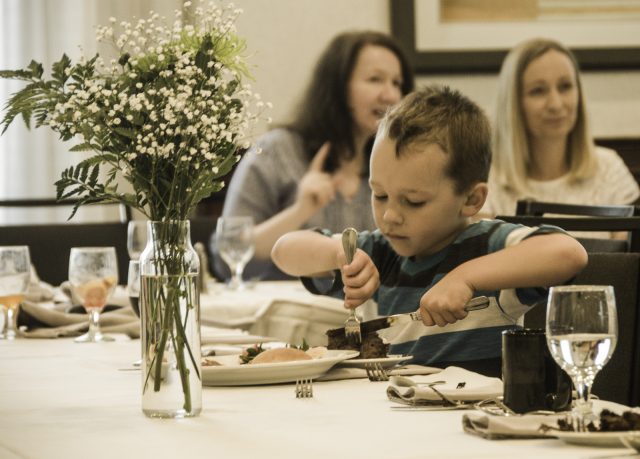
The Boy still has three years to go. When he first lines up in the communion line, L will be at the tail end of her seventh-grade year.
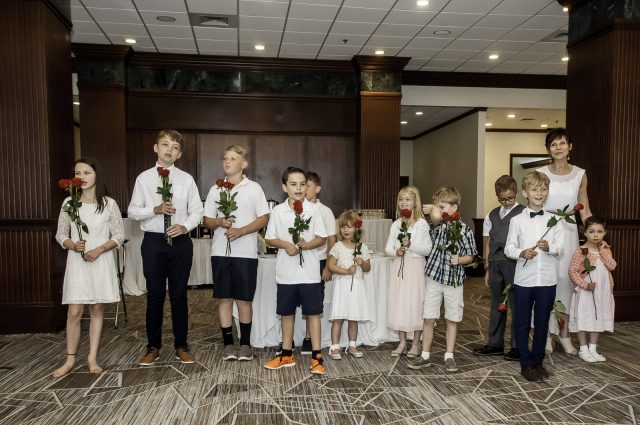
And at that point, I’ll likely be writing about how it’s incredible that it’s been five years since L’s First Communion.
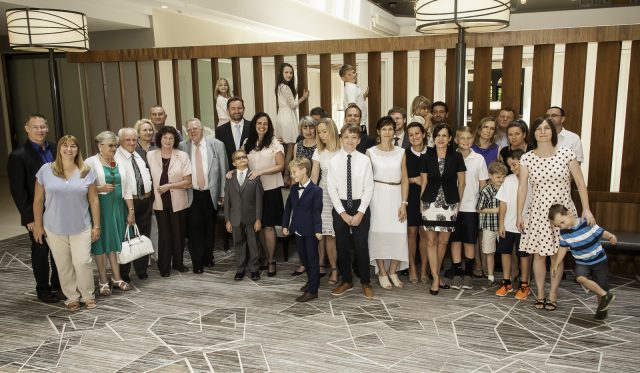
The Boy wanted to get into the Girl’s room; the Girl wanted some “alone time,” which we all do from time to time. With the two of them, that conflict is a frequent occurrence. As parents, K and I must balance the two opposing factors:
I feel like we need to be keeping score of the whole thing: one time forcing L to let the Boy in her room; one time getting the Boy to understand that the Girl needs some privacy from time to time.
The Boy was looking for his Bugatti (toy, of course).
“I last saw it on the counter downstairs,” I tell him.
He thumps his way downstairs, wanders around a while. Then I hear him ask K, “Mommy, what’s a counter?”
During the announcements at the close of Mass, Fr. Longenecker pointed out the fact that the text of the communion hymn dates from the twelfth century and the music from the sixteenth. At that moment, several thoughts that had been swirling randomly in Mass coalesced.
First, at one point, I was thinking about how different a Roman Catholic Mass is from the church services I attended in my youth. All the smells and the bells have no correlation with the staid services we had. And yet there was a certain similarity: each service was identical in its format just as each Mass is identical in its order of liturgy. I suppose that’s true of all churches.
Still, our church being Protestant (though its members then would have begged to differ most vociferously), liked to suggest that if it wasn’t in the Bible, we didn’t do it. I found myself in Mass briefly wondering about the liturgy (for lack of a better term) the church followed: it’s no where in the Bible. I believe the pastor would have suggested it’s one of the traditions mentioned in 2 Thessalonians 2.15: “Therefore, brethren, stand fast and hold to the traditions which ye have been taught, whether by word or our epistle.”
Thinking about it further, I remembered the little distinctives of our service. We had a short warm-up message called a sermonette. Google shows that other denominations use the sermonette format, but it’s certainly not a common feature. After the sermonette were announcements, followed by something called special music, then the sermon.
The special music was always some kind of choir performance or solo piano performance. Choral numbers were always selections from sacred music (but we had to be careful about that text!), but instrumental music was often some kind of classical composition. I choked down a laugh in Mass thinking about that, wondering if it was “special” music if it appeared every week.
The first Sunday after Easter is Divine Mercy Sunday. Since this particular celebration began in Poland, it’s a pretty big thing for the Polish community. At our church, we have a newly-consecrated shrine to the Divine Mercy with relics of St. Faustina and St. Pope John Paul II.
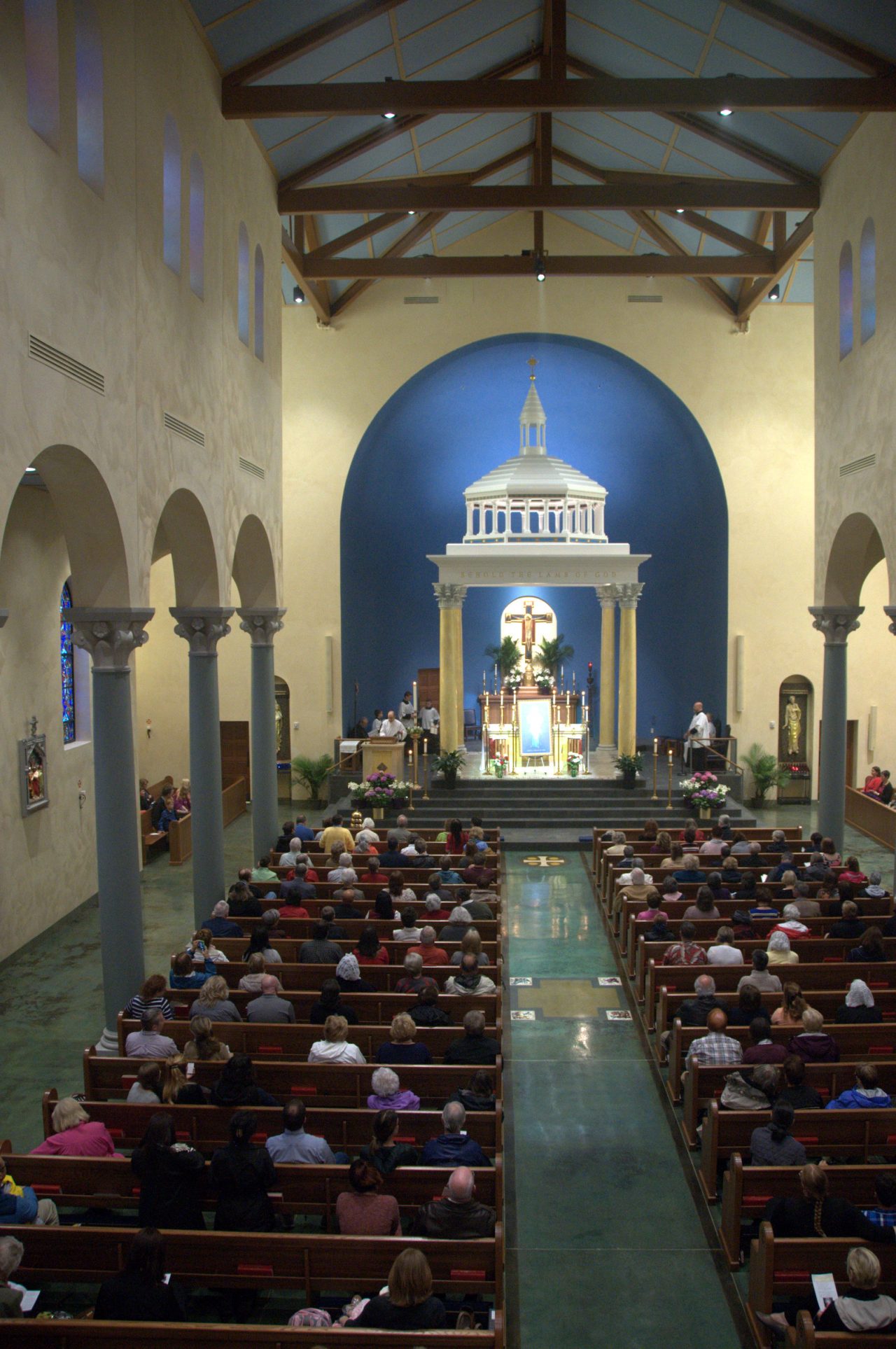
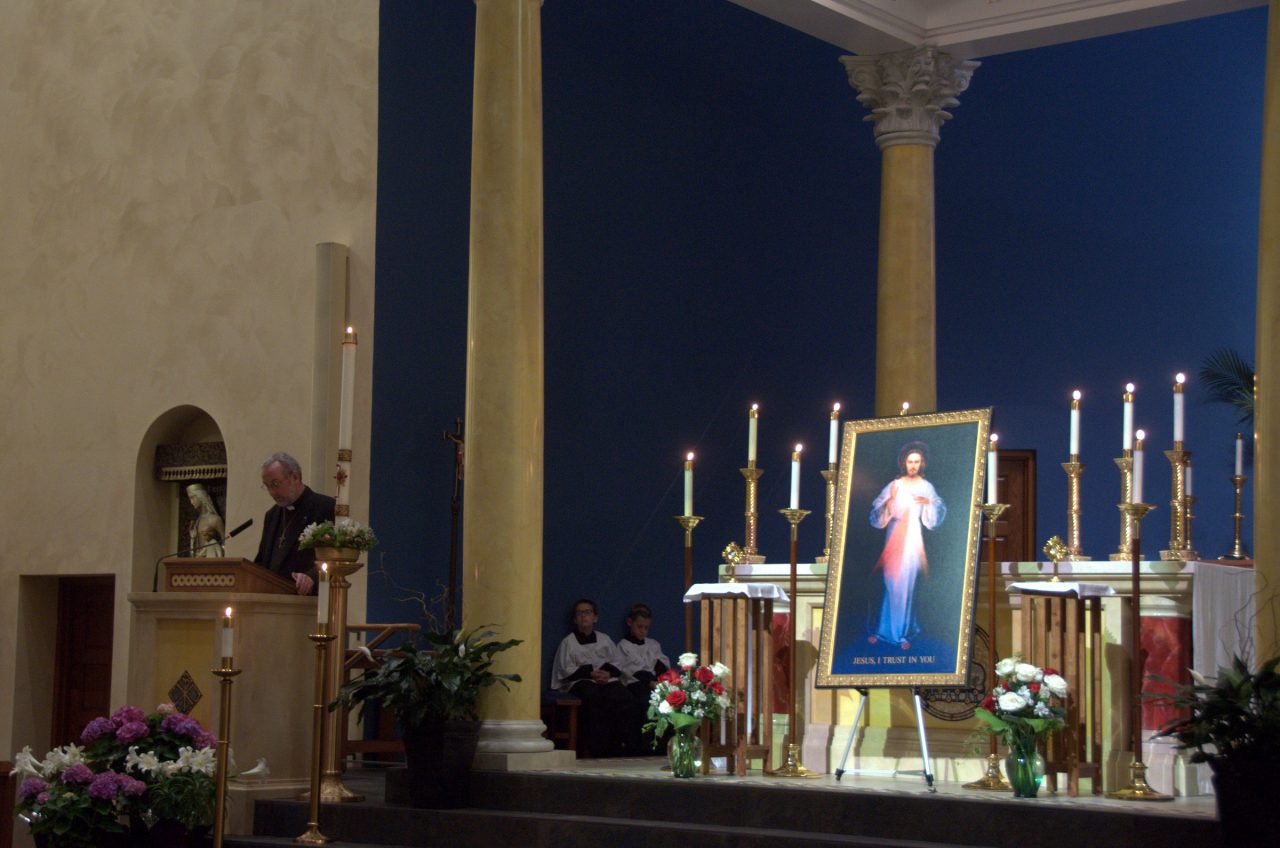
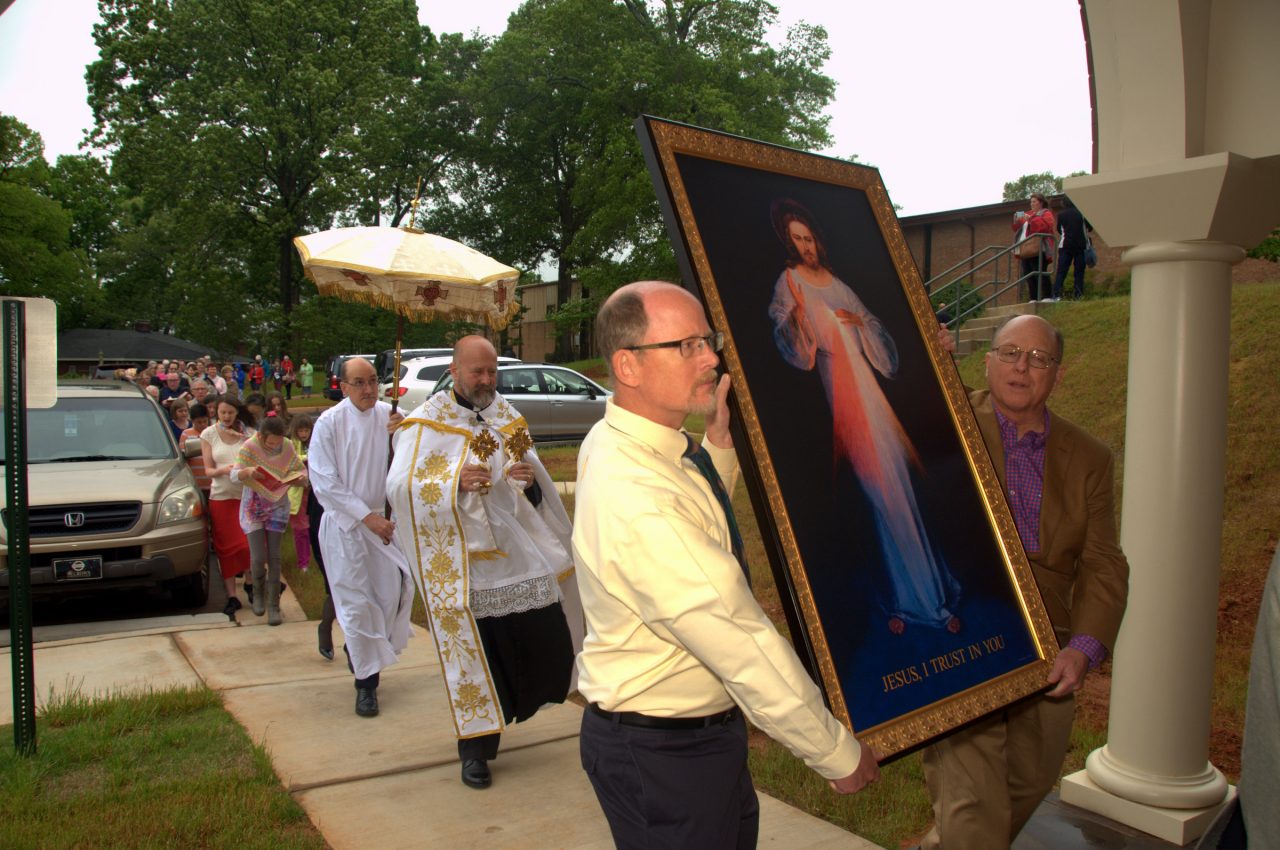
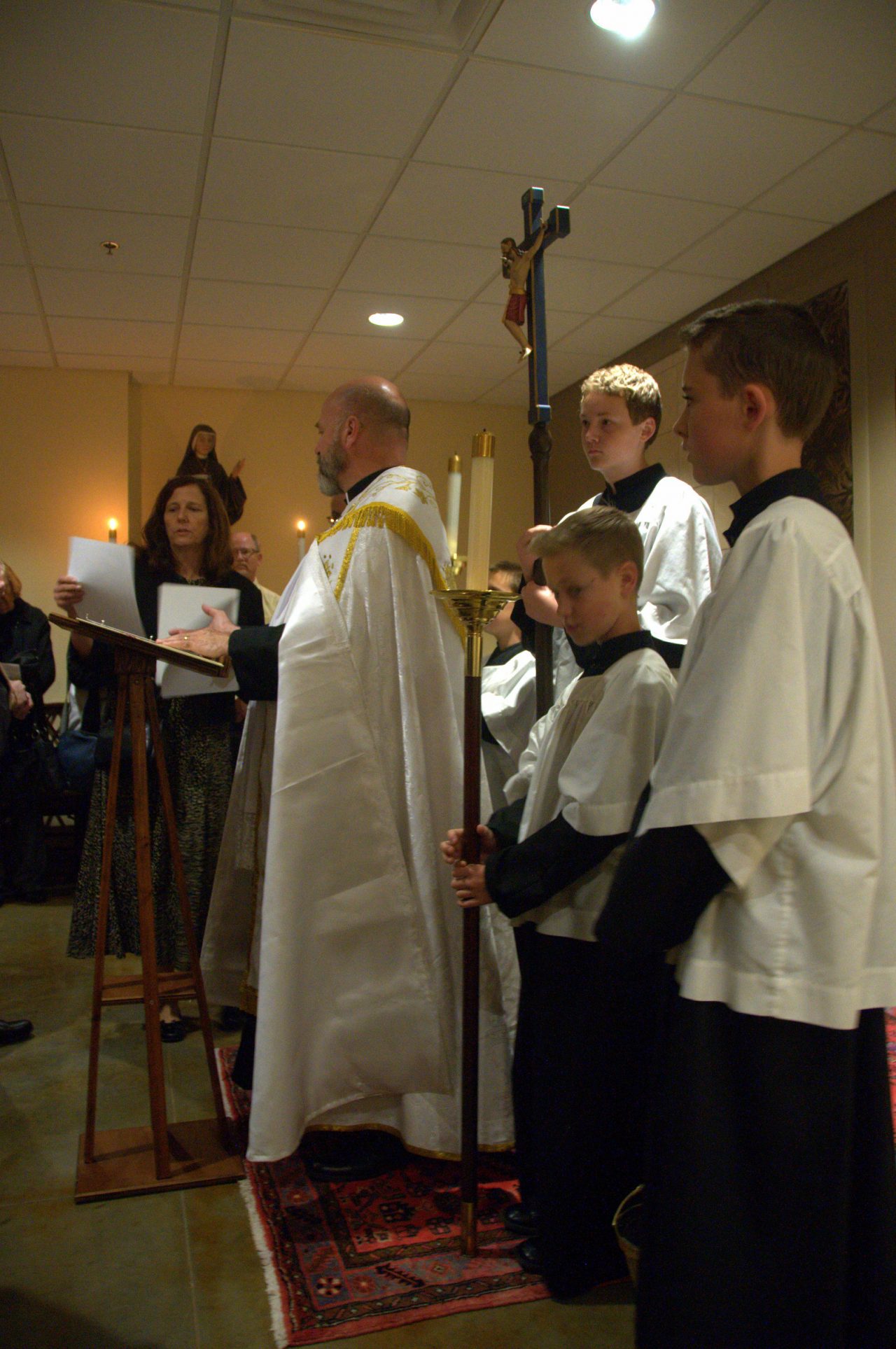
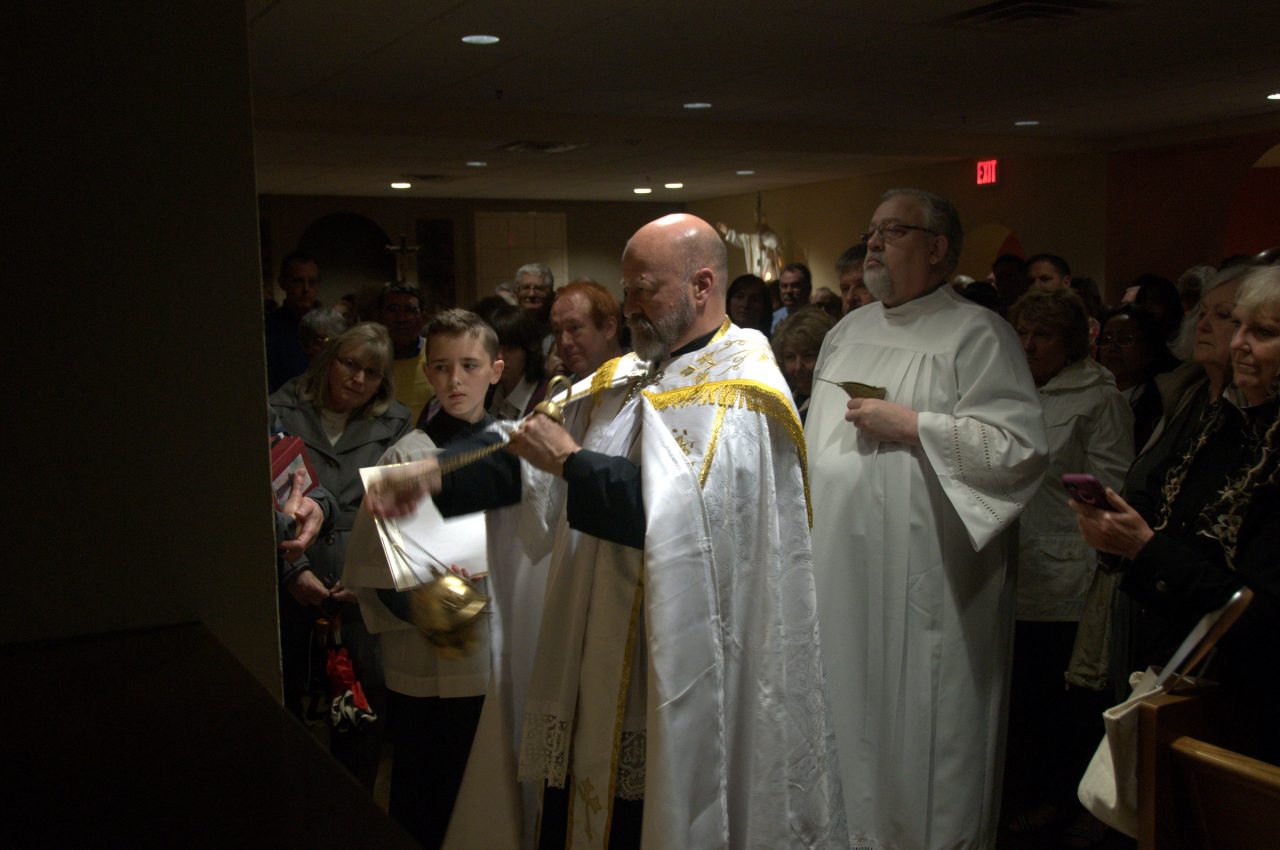
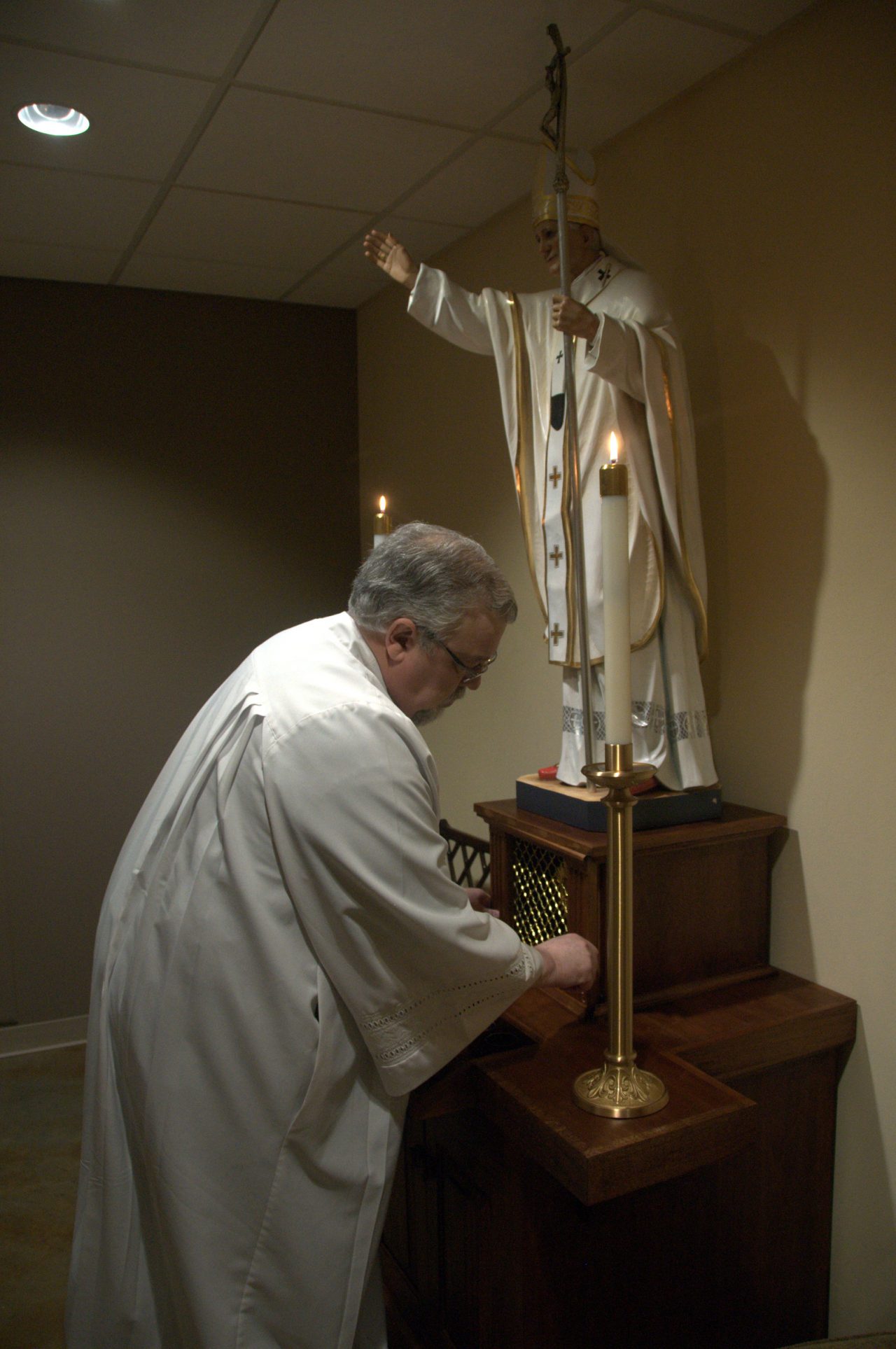
Not bad for a little Catholic church in Greenville, SC, home of Bob Jones University — probably the most virulently anti-Catholic school in the States.
Easter is the highlight of the liturgical year, and so for Poles, it’s the highlight of social year in many ways. As with Christmas, begin quietly at home, breaking the evening’s fast (and the non-meat fast of the last several days) with treats from the baskets blessed yesterday.

Bread, ham, sausage, boiled eggs, a lamb-shaped cake, slivers of apple and orange, and a horseradish sauce. A simple meal, a somewhat humble meal.
It’s not like the equivalent for the Christmas Eve dinner. That will all come later. But the Boy is simply not waiting for anything more elaborate.
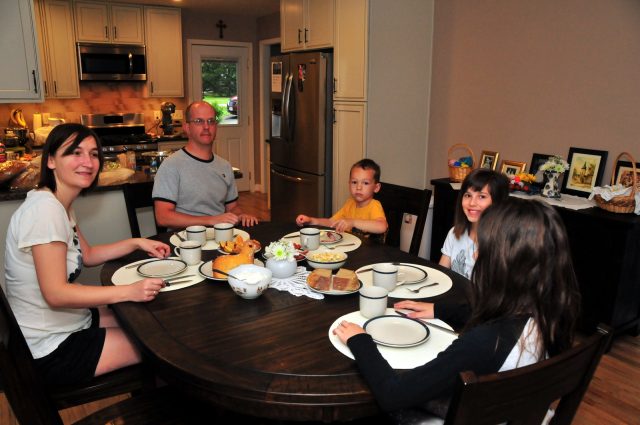
“One more piece of ham,” he chirps, sliding it to the side of his plate. “Save the best for last,” which he doesn’t — he eats it in a few moments, then repeats.
He downs four or five slices of ham, a serving of veggie salad, a large proportion of the orange, a couple of sausage hunks, some bread — he eats at least twice as much as L.
After breakfast, it’s off to Mass with us. I take the Girl an hour earlier for choir practice and sit in the pews, watching the brightening sky slowly illuminate the church.
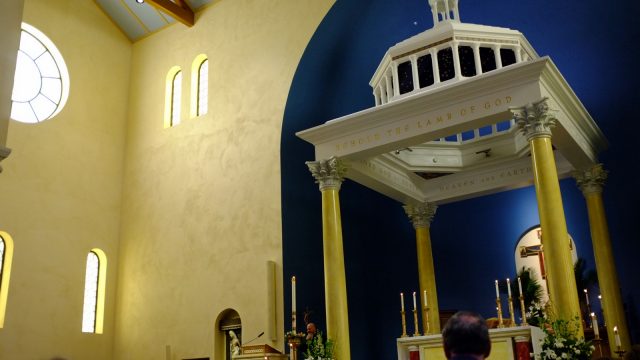
This is our first Easter in our new parish, and it’s parish’s first Easter in the new church.
All the colors seem to glow as a result. Or perhaps that’s still the sheen of newness. Likely a bit of both.
Mass in this wonderful space feels like it should: an explosion for all the senses. The altar servers process in, the first swinging a thurible and filling the middle isle with incense that drifts upward, catching rays of light and glowing. The choir is sublime. We kneel, stand, sit, kneel, cross ourselves. The physical beauty of the place surrounds us. The sweet Communion wine lingers as we head back to our pew.
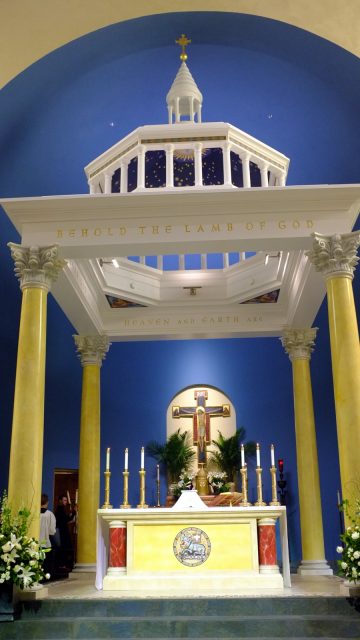
In front of me, a young lady has brought a friend — boyfriend? — and he’s clearly not Catholic. I remember the first time I witnessed all of this. It was so different from everything I’d experienced growing up. “The smells and bells” forced out of me a begrudging respect as did the humble faith of the parishioners.
This young man keeps his hands in his pockets most of the time, rarely looks around, and seems bored. Perhaps he’s not having the same experience I did twenty years ago when I first went to Mass. Perhaps he is and simply doesn’t show it.
After Communion, the girl, still kneeling, eases back onto the pew, and her father, sitting to her left, places his hand on the small of her back and massages gently. The girl pulls herself back up into a full kneeling position. I smile at the universality of fathers: I’ve done that many a time with the Girl, but she’s never with us in Mass these days. Instead, she’s in the choir loft.
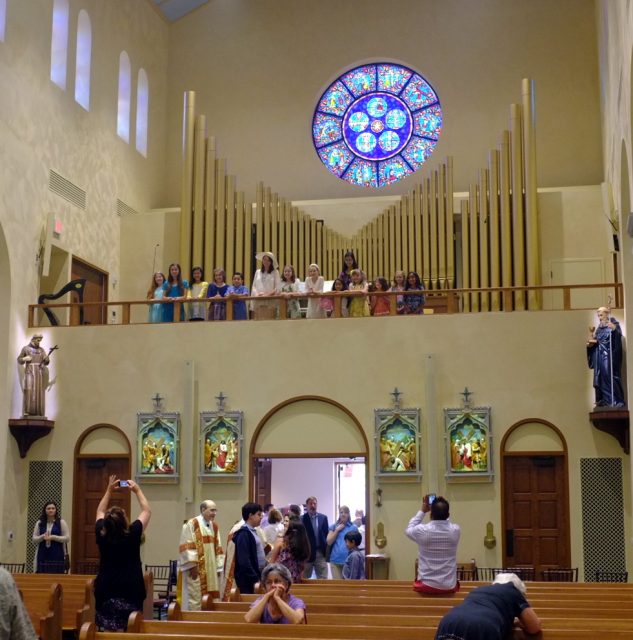
I think about the obvious: there will come a time when the Girl might want to bring a young man to Mass with us. She’s already growing so fast that K and I can’t keep up with her, but right now, she says boys are disgusting.
“They’re always messing up things on the playground,” she often complains. “They steal balls, bother us, chase us.” How long will this last? Not long enough, I’m afraid.
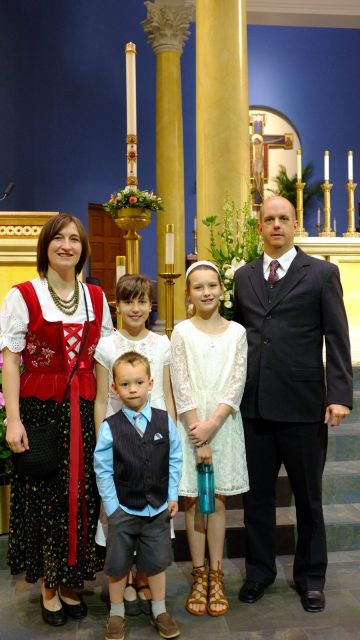
I can still get into my wedding suit, but looking at the picture reveals the sad truth: a bit of a gut has formed that pushes the jacket into slight wrinkles. “I forgot to suck it in,” I think to myself, remembering all the times my own father did something similar. Like father, like son.
In the afternoon, all the usual suspects come over. We eat; we drink; we eat; we laugh. After a while, a couple of us go out to hide Easter eggs for the kids. Some we hide in the open; some we actually hide.
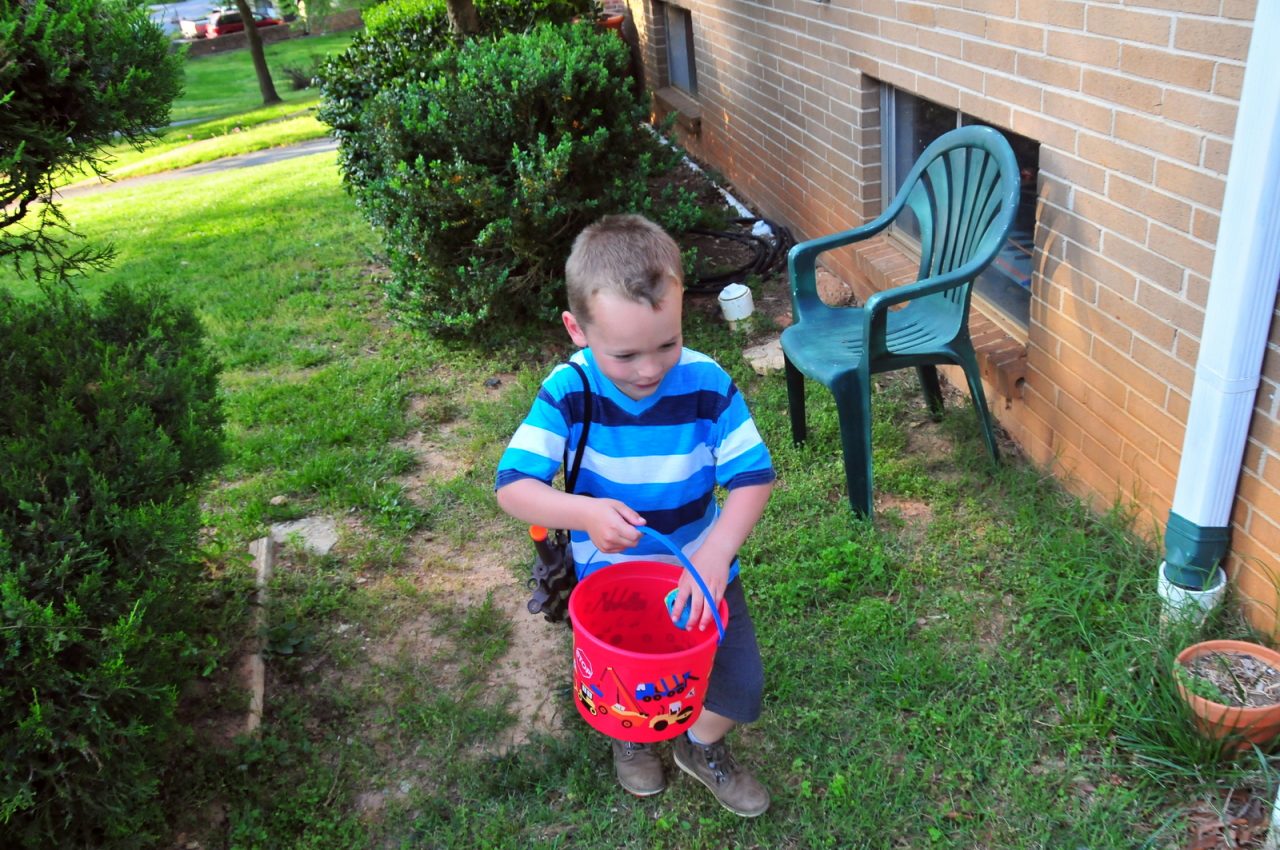
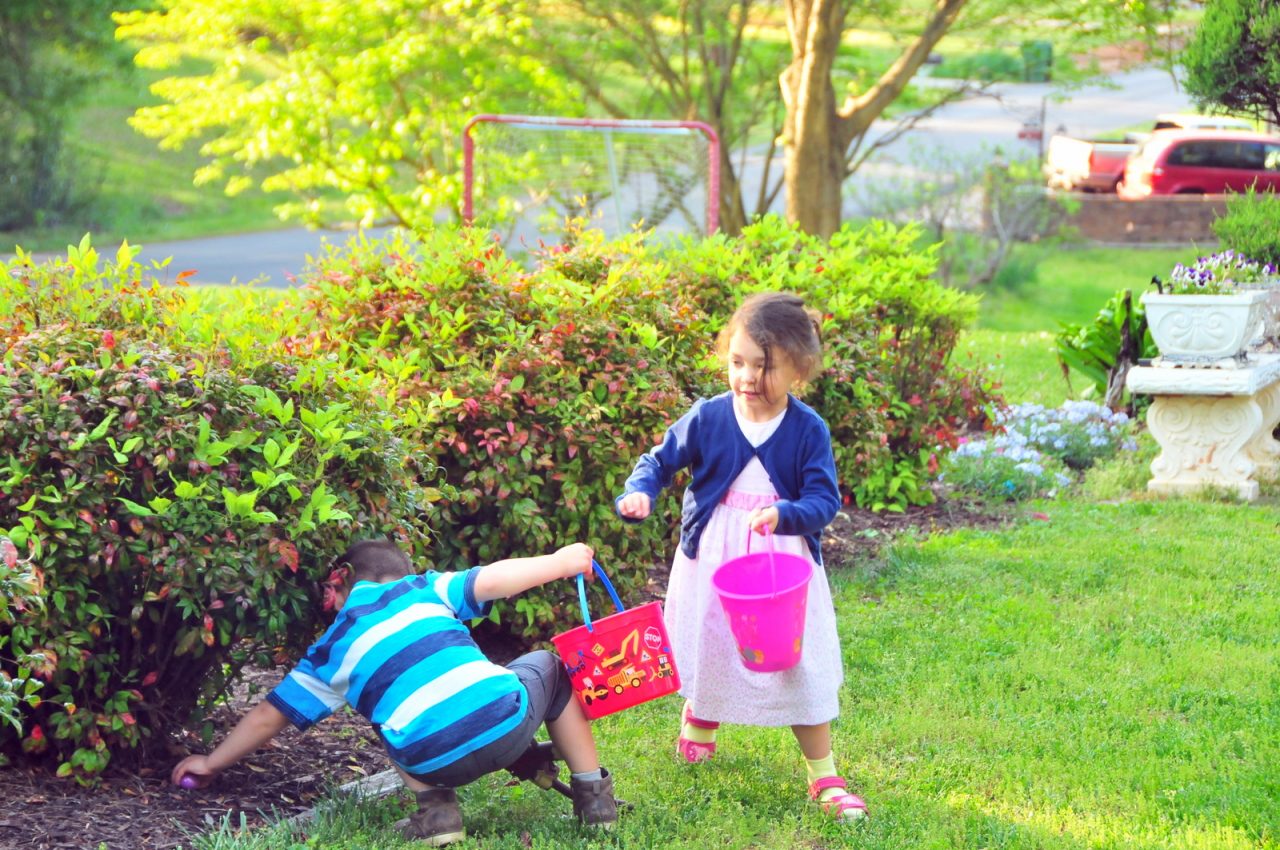
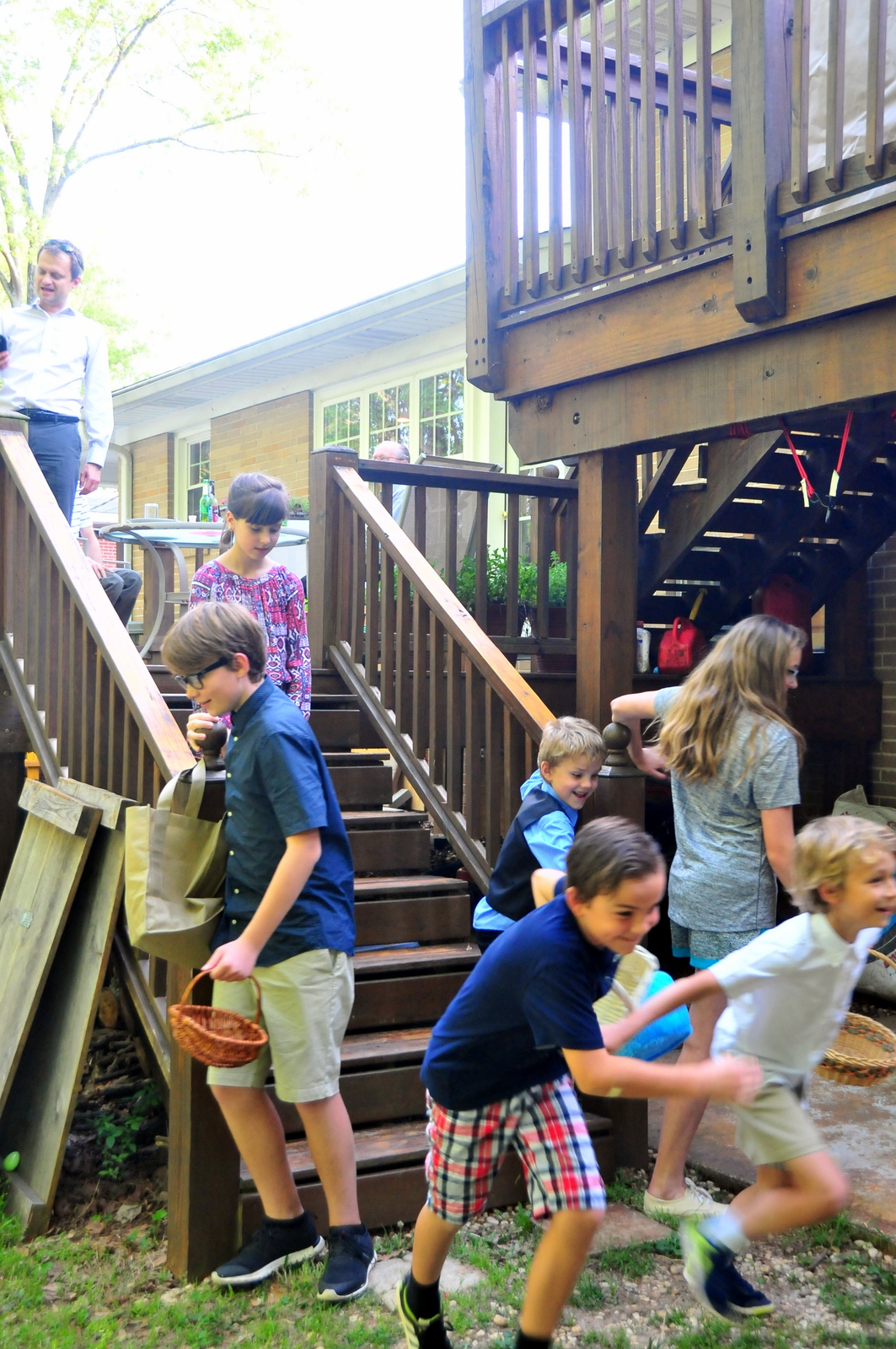
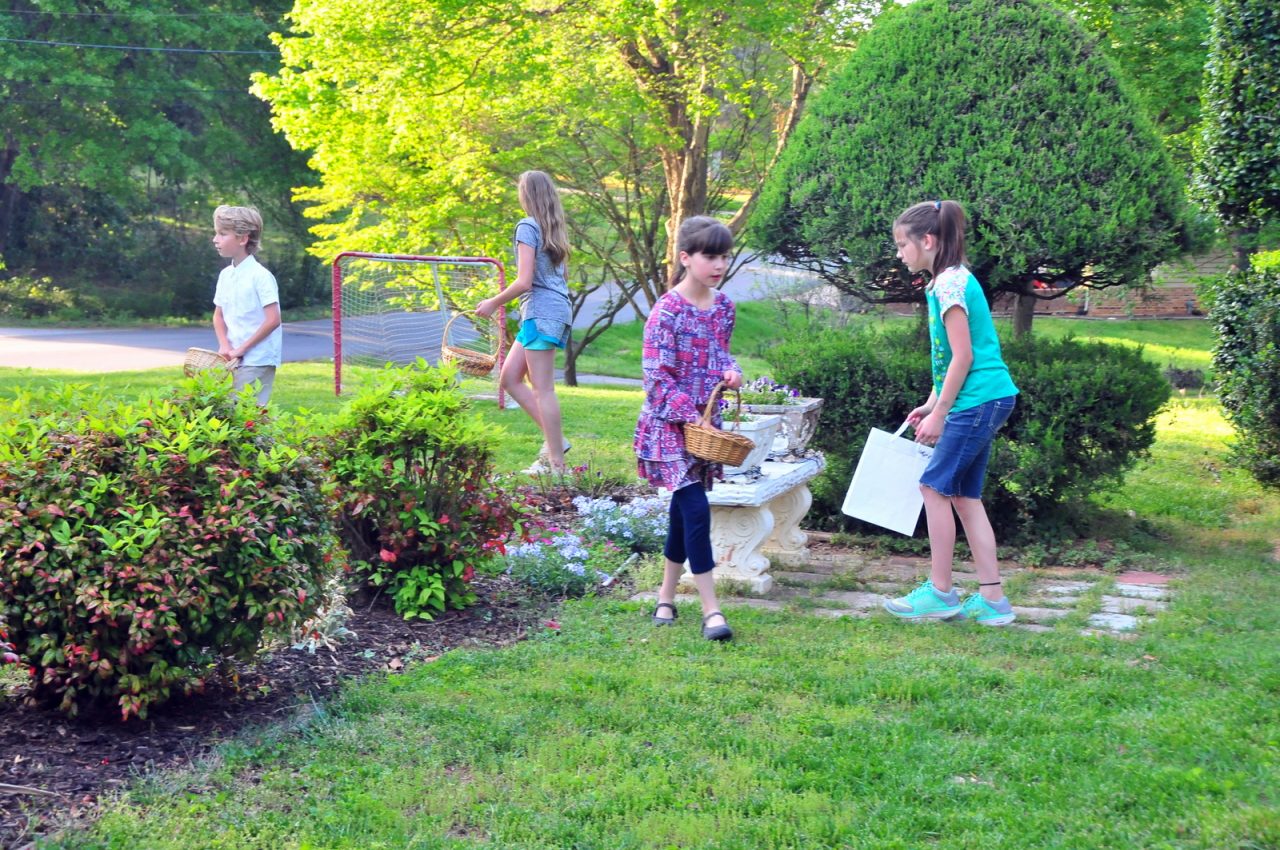
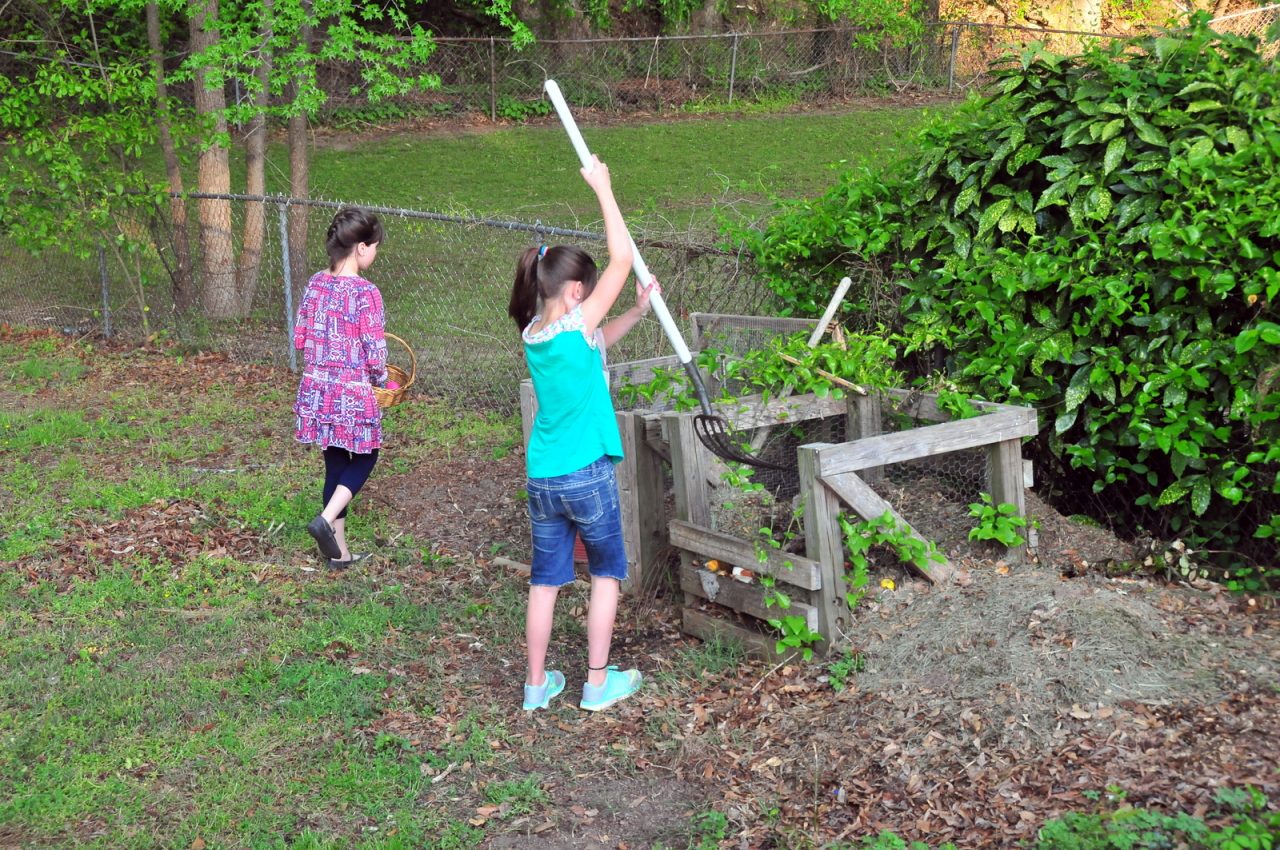
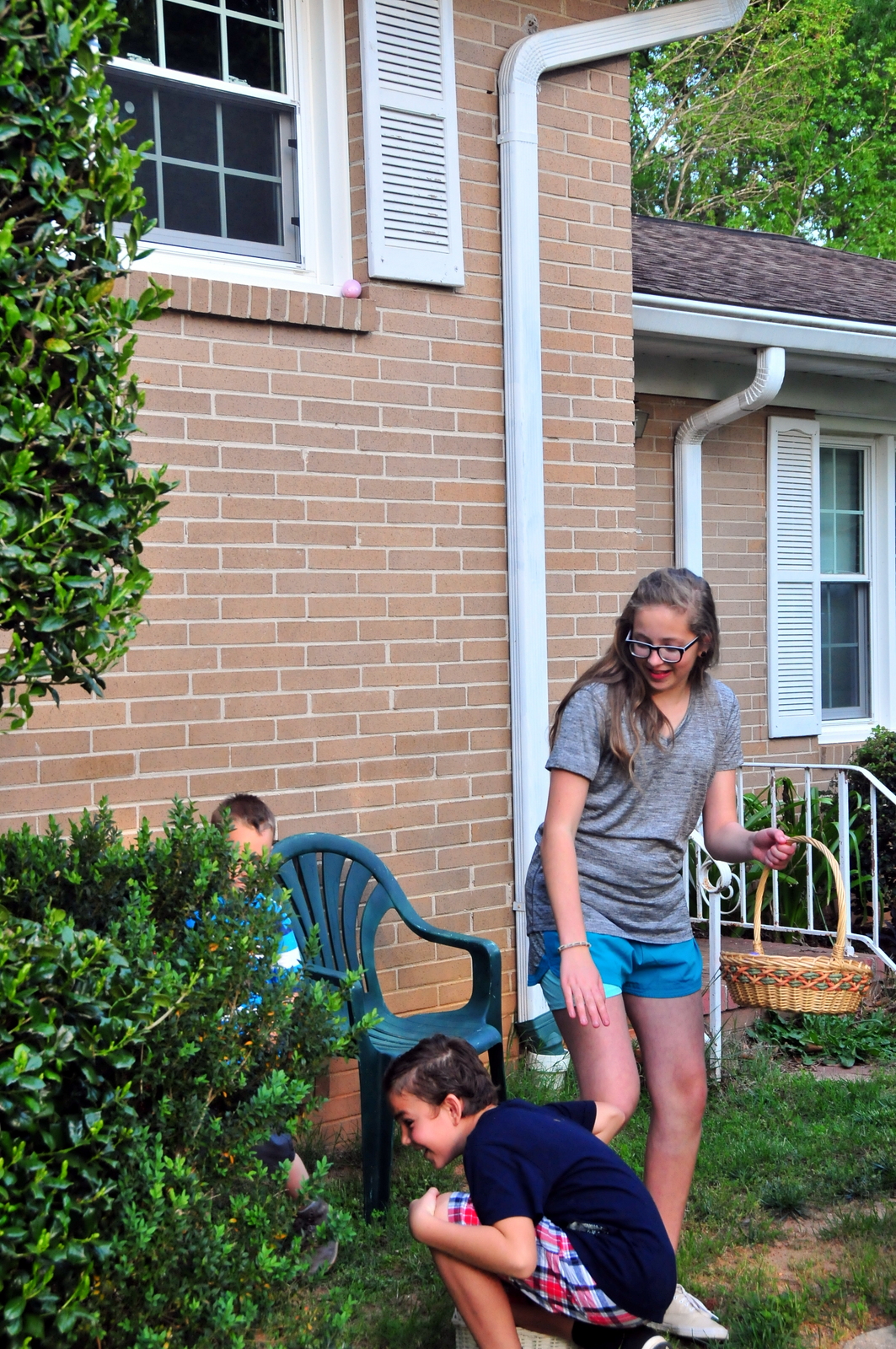
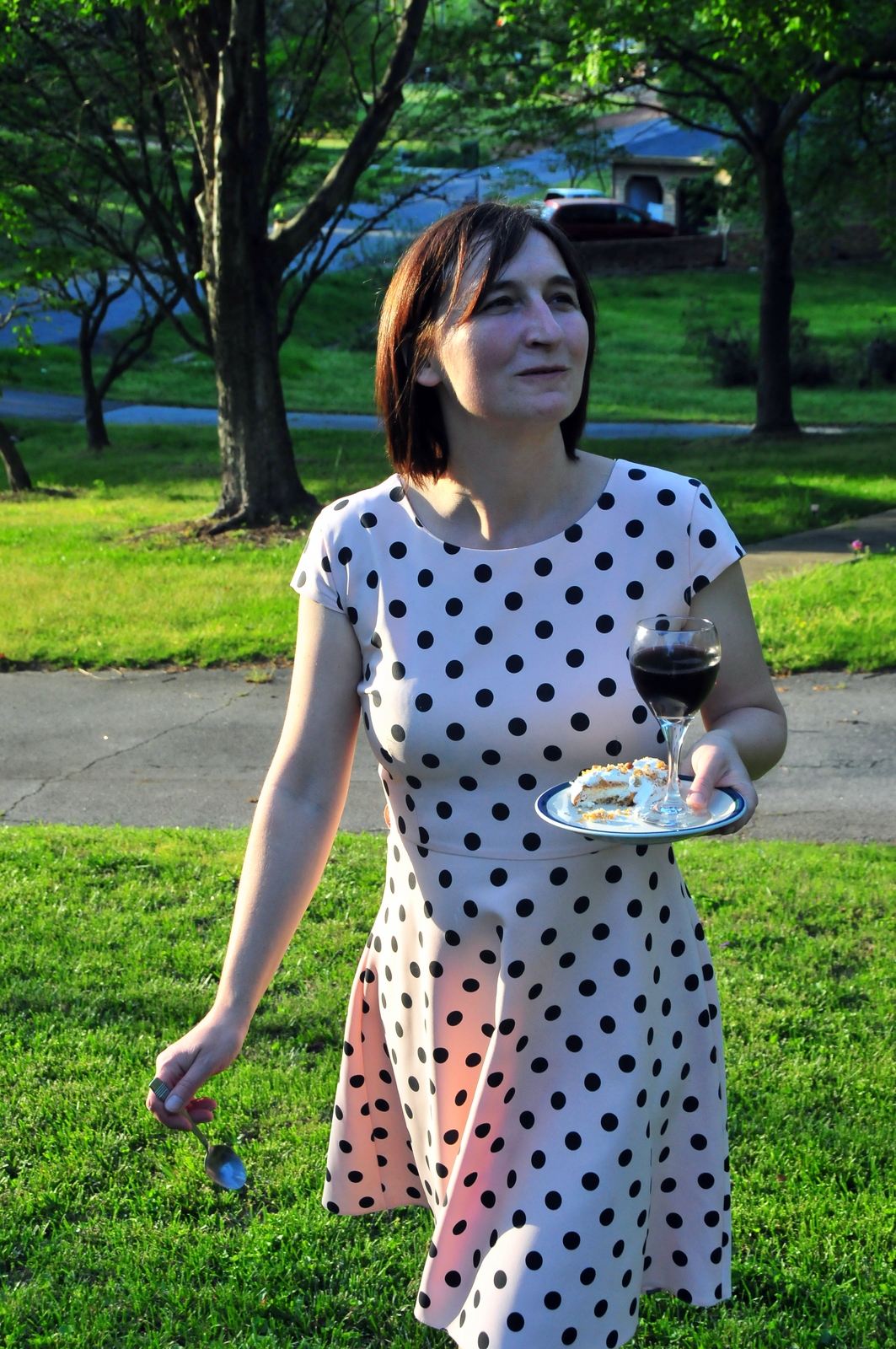
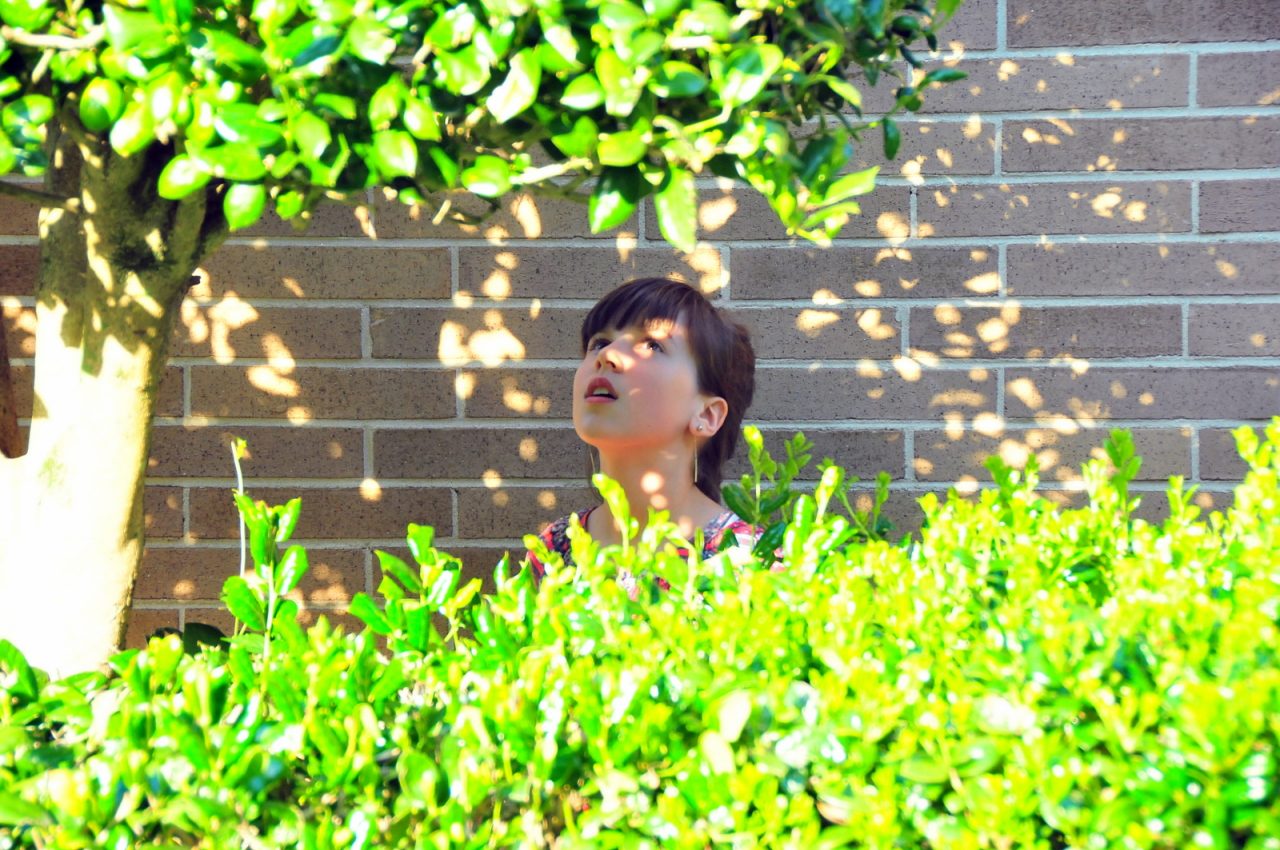
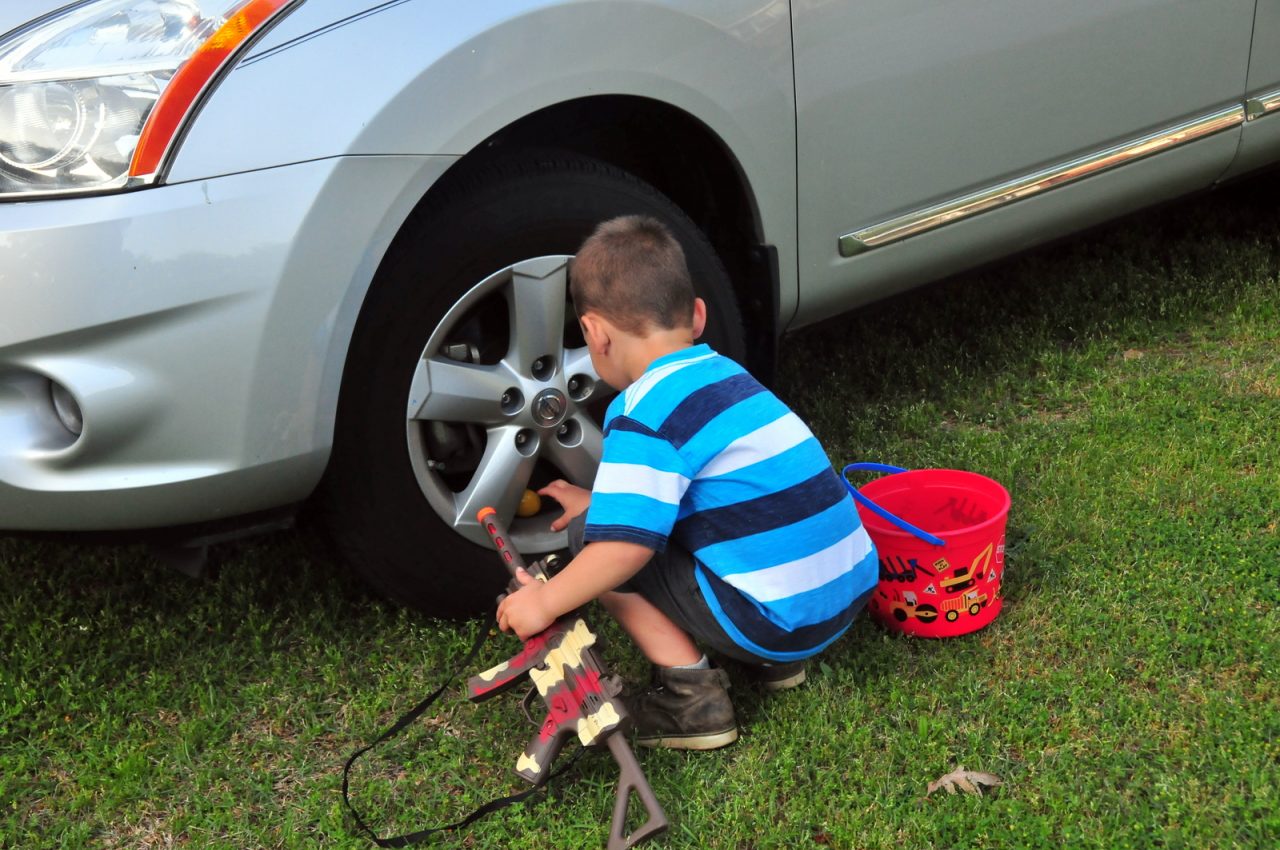
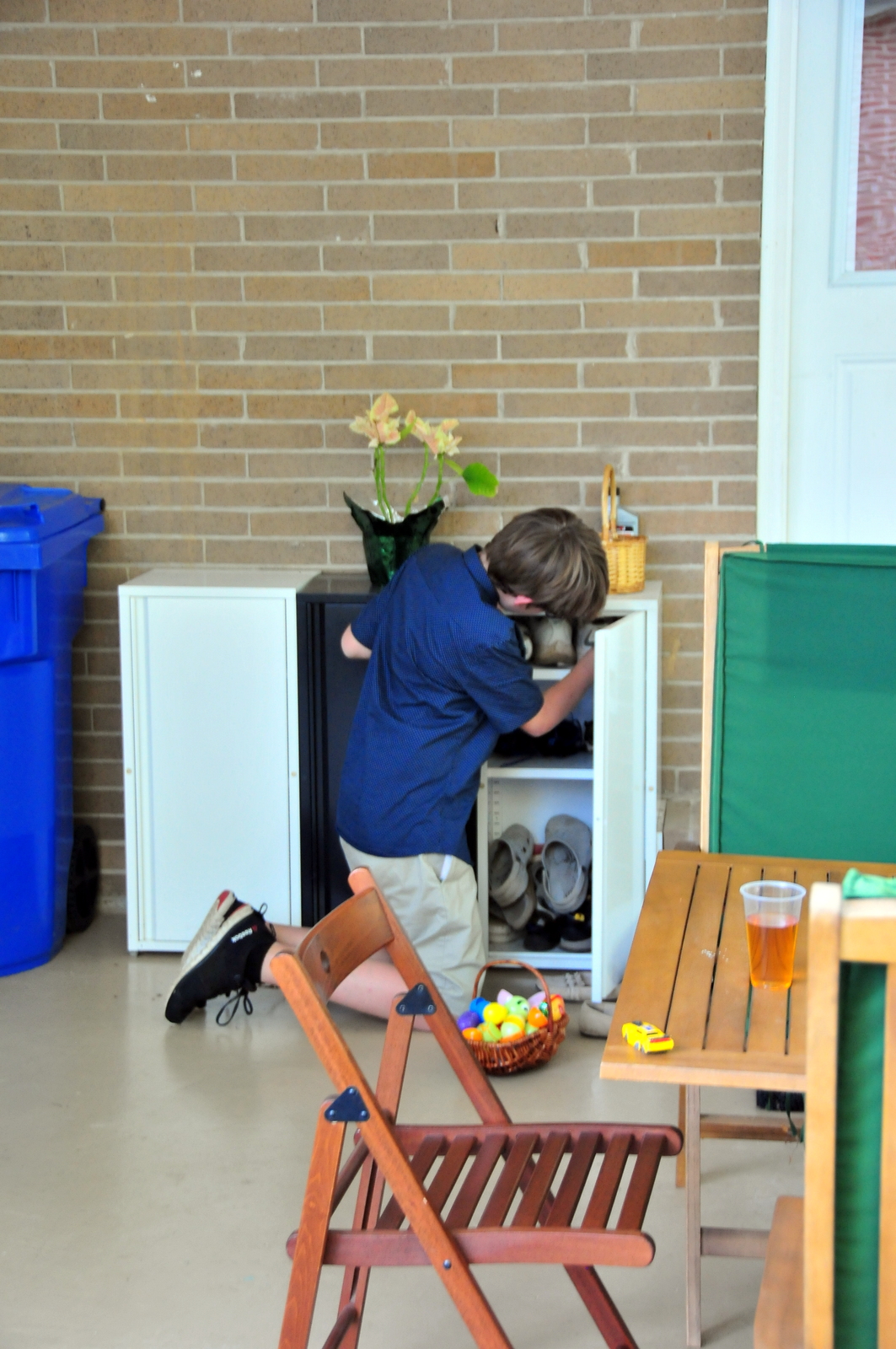
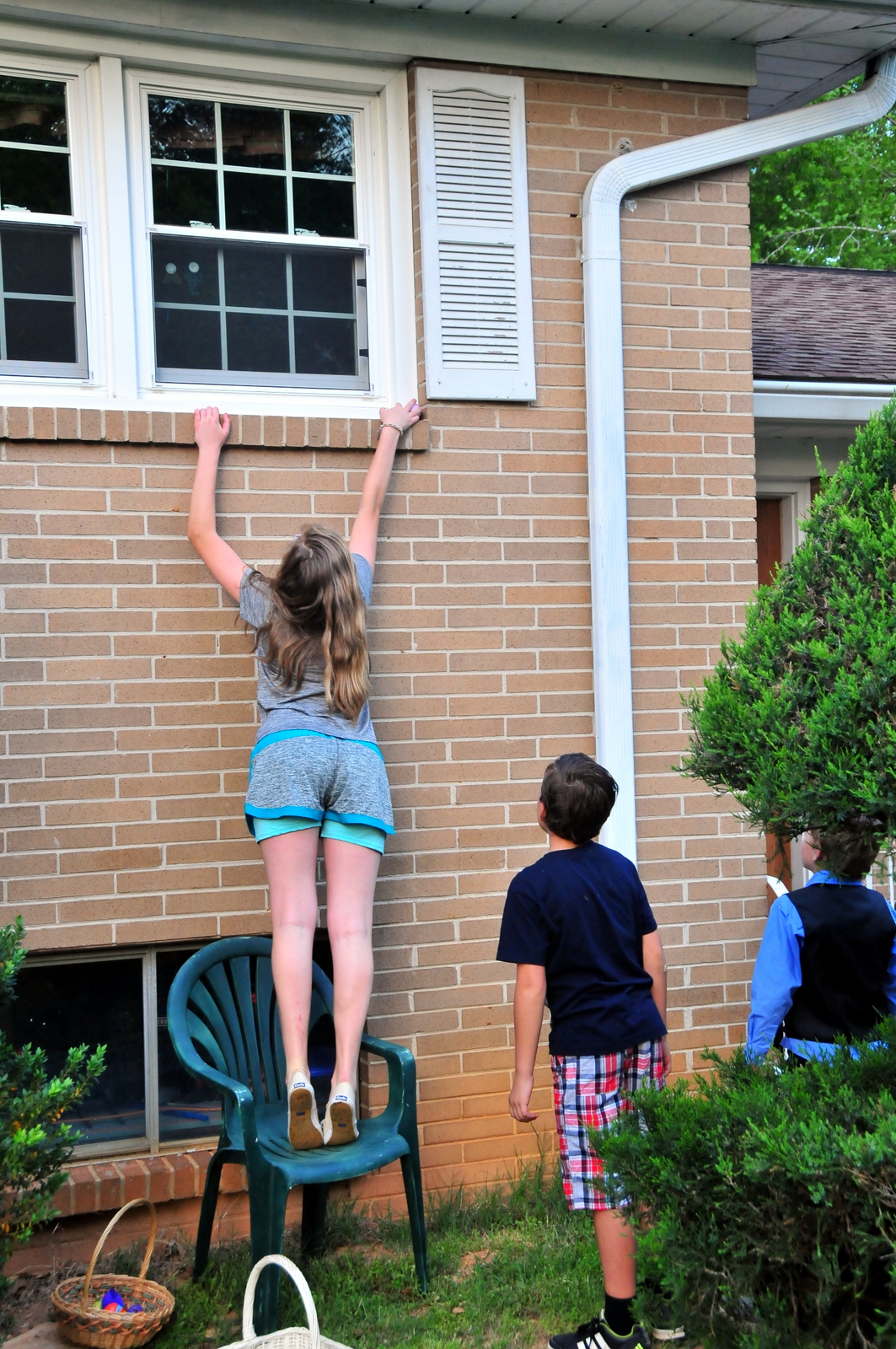
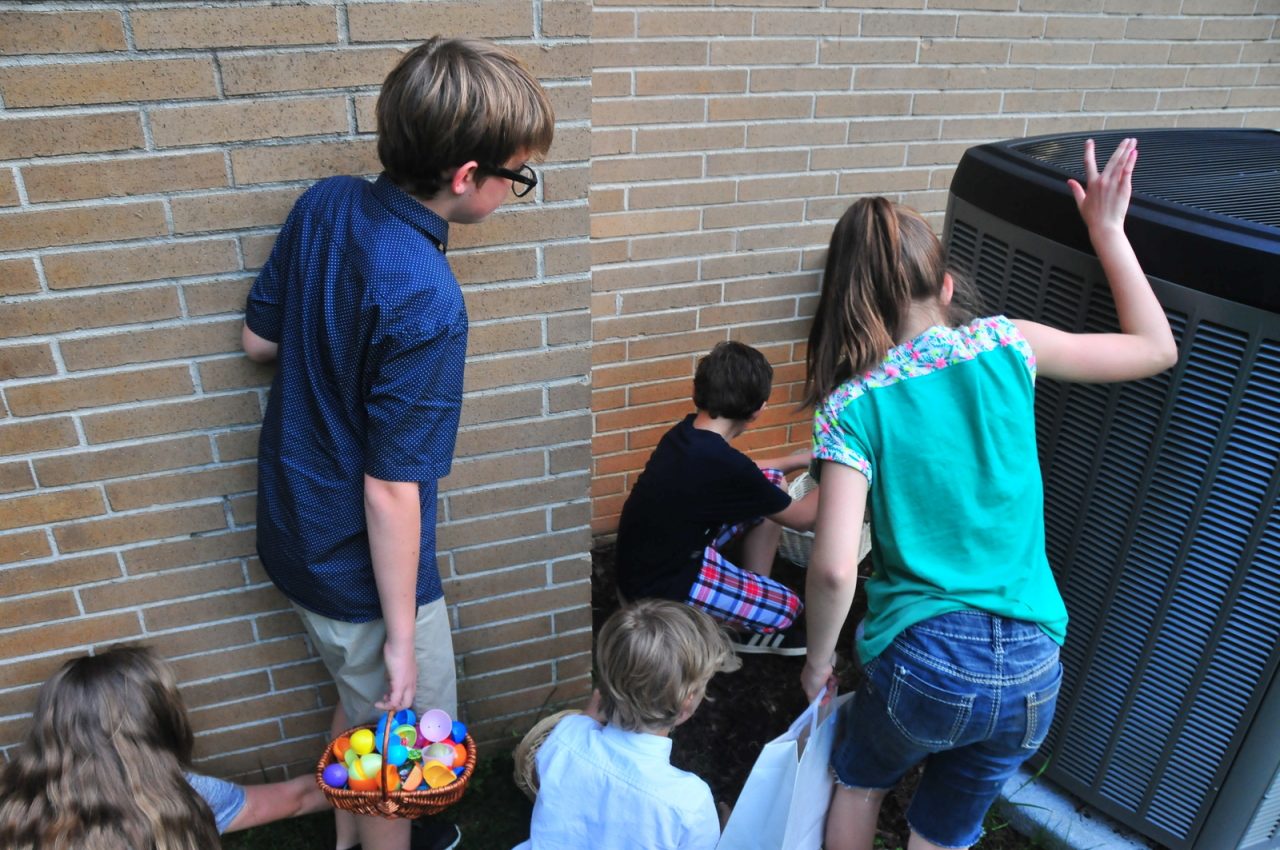
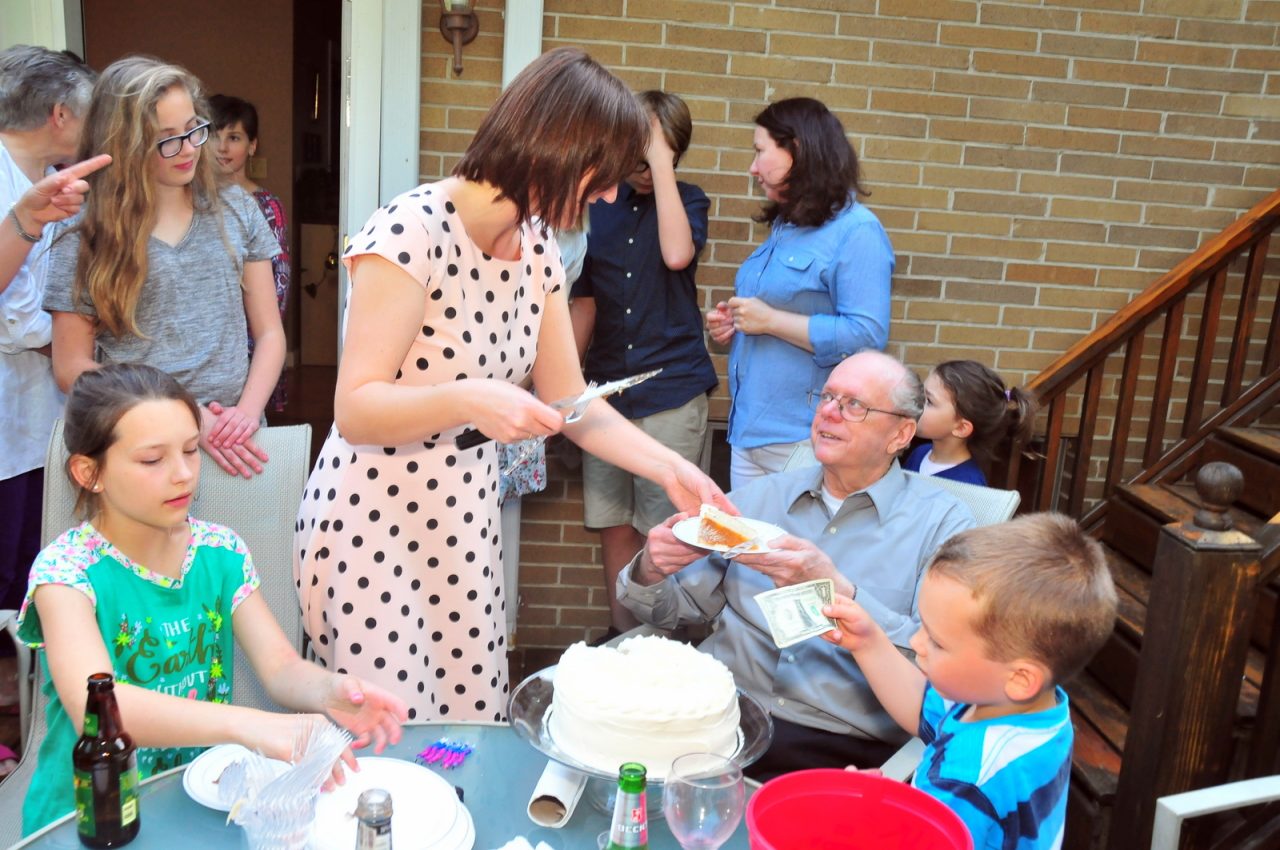
In the end, a perfect day.
The great Gothic cathedrals of Europe were designed with their thin walls, long windows, and unbelievably high ceilings to do one thing: make parishioners look upward. When visiting one as a tourist, one finds that all the other tourists are doing just that: looking up. Wondering at the marvels of creating such seemingly impossibly structures out of stone, structures that look delicate and immortal at the same time.
I can only imagine the learning curve involved in developing such a style of architecture. How many times did buildings come crashing down because of some hitherto unforeseen flaw?
In the eighteenth century, there was a revival of Gothic architecture, and this seems somehow appropriate as that was the age of Bach, who could compose music that even when it was descending in tones sounds like it’s ascending, like his Toccata and Fugue in F-major, BWV 540.
One of the things I like best about being Catholic is, ironically enough, confession. At first, it was a problematic concept for me. The idea of telling someone where you’ve fallen short is always an uncomfortable exercise, and for someone who grew up thinking, like many Protestants, that if it’s Catholic, it must be wrong (of the devil, even), my first time in confession was initially a little awkward. But having such a conversation — and any good confession involves conversation — left me feeling lighter, more alert.
It’s not just the confession that helps, though. The preparation for it, the examination of one’s conscience, forces me to look at my own actions with a critical eye, and critical examination of one’s life is always beneficial.
I find, though, that I tend to focus more on sins of commission than sins omission. I suppose it’s easier to remember things I did than to recall about the things I didn’t do. If I didn’t do them, I likely didn’t think about them, making it tricky to recall them.
What makes this Saturday different from any other Saturday? If I look back at Saturdays over the course of my life, what a change I see. How I spent my Saturdays when I was my children’s age is so very different from how they spend they theirs. Better? In a way. Worse? Also true, in a way.
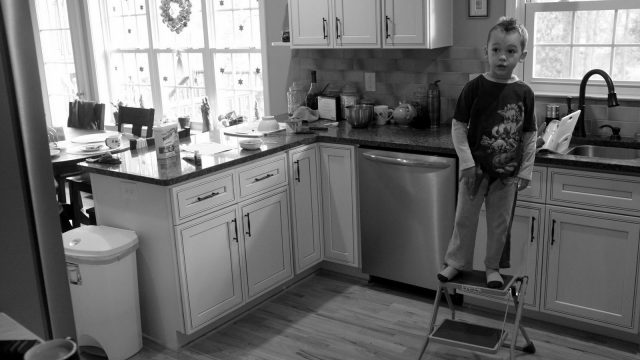
If K were to take the time to look back over the Saturdays of her life and compare them to what her children do, how they spend Saturday, there too would be enormous change. Better? In a way. Worse? Also true, in a way.
The point is, K and I are both in a place in our life that we probably never would have imagined when we were our children’s age. Both of our lives at their age were about waiting, in a sense. K and her family were often waiting in lines in still-Communist Poland; I was waiting for the end and a new beginning.

And yet, there’s still the waiting today. It’s part of life. Waiting for the wild mushrooms (picked in Poland, dried in Babcia’s kitchen, smuggled in our checked luggage, and waiting for months in the freezer) thaw then re-hydrate. Waiting for the zakwas to finish its fermenting so we can have the properly sour barszcz for dinner. Waiting for the prunes, apples, oranges, cloves, cardamom pods, cinnamon sticks, ginger cubes, and brandy to release their magic to make the Christmas kompot.

The preparation, the waiting, is itself magical. K keeps everything moving, and I am constantly asking, “What now?” I dice the potatoes for the mushroom soup. “Not too big, not too small.” I hold one cube up.
“They could be a little bigger.” I try again and hold up a cube for inspection.
“That’s a bit too big.” But I don’t mind. I’m just glad that I’ve found a place to help other than taking out the compost again and again — peelings from all the fruits and veggies, then the cooked veggies from the stock, those that won’t go into the salad that is — and cleaning up the house.

While all this waiting is going on, there are things to do, of course. The table needs to be set. This is one of the things I leave to K. It’s not that I wouldn’t know how to do it — I’m not that bad. But it’s something K enjoys doing, a creative endeavor as I enjoy creating this site.
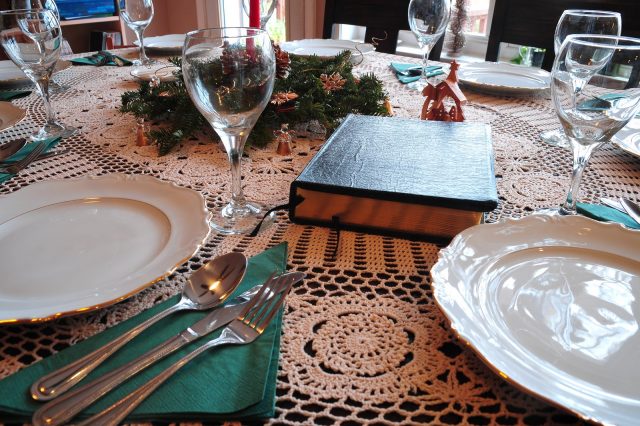
We begin with a Gospel reading and sharing the opłatek. The Boy likes the wafer enough that he just sits and eats it as if it were a snack.
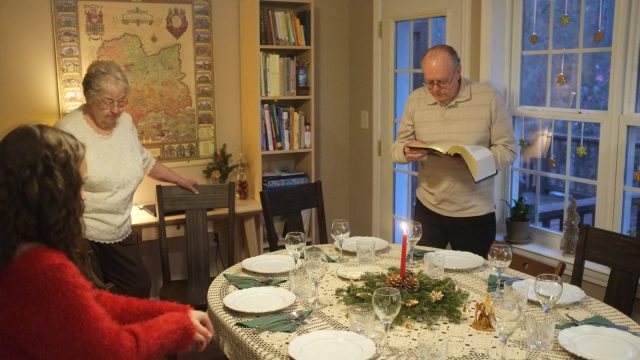
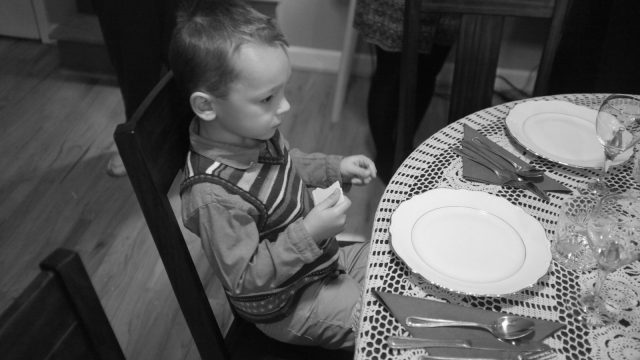
The dinner itself goes by in a flash. No matter how we try to slow things down (which we actually did this year), it still seems to go by entirely too quickly. We putting the barszcz on the table, and suddenly it’s desert time. For the kids, that’s a good thing: they can’t wait to tear into their presents. For K, I guess it’s a little bittersweet.
The menu is a traditional one (mouse-over to see details).

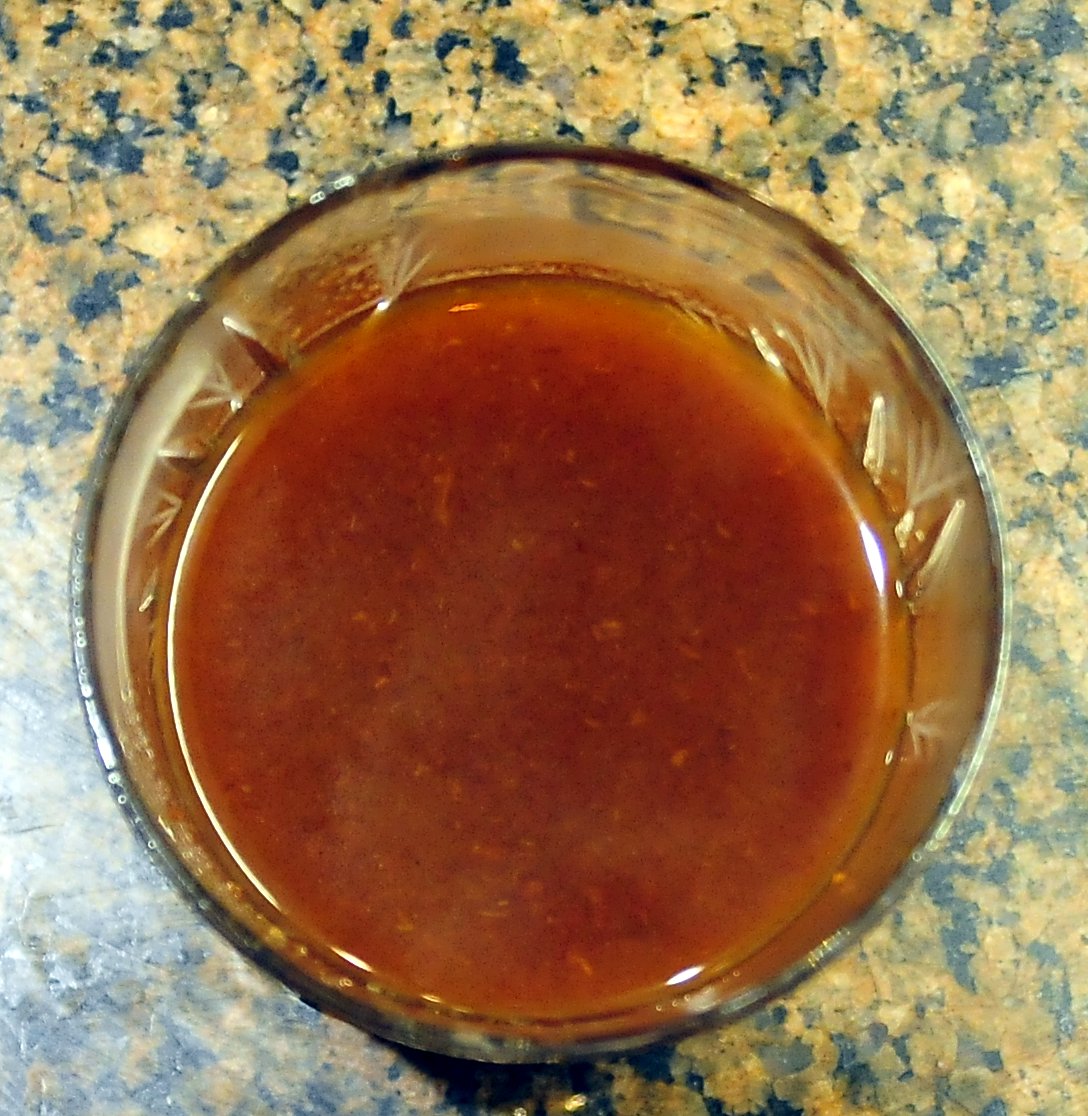

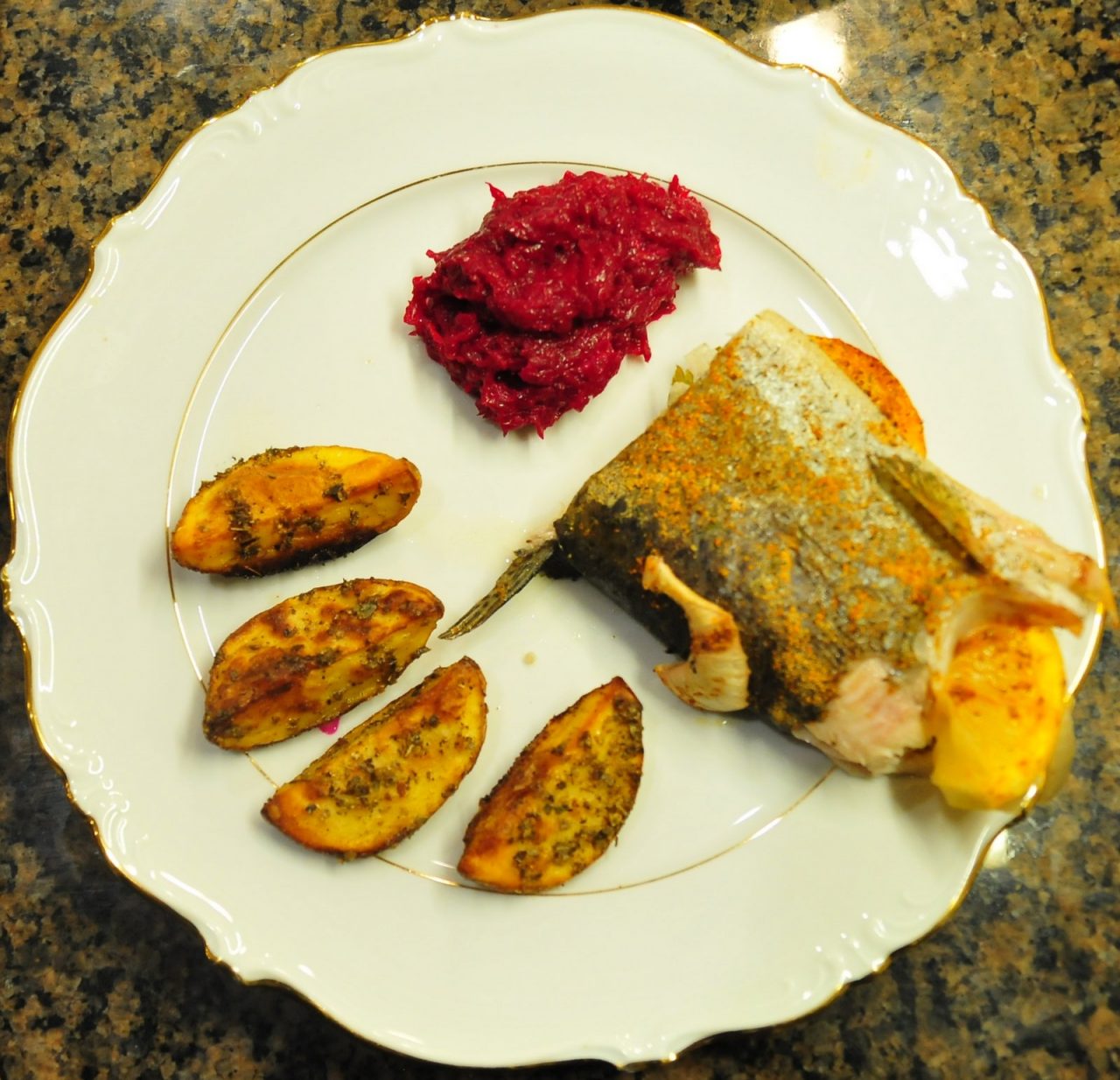
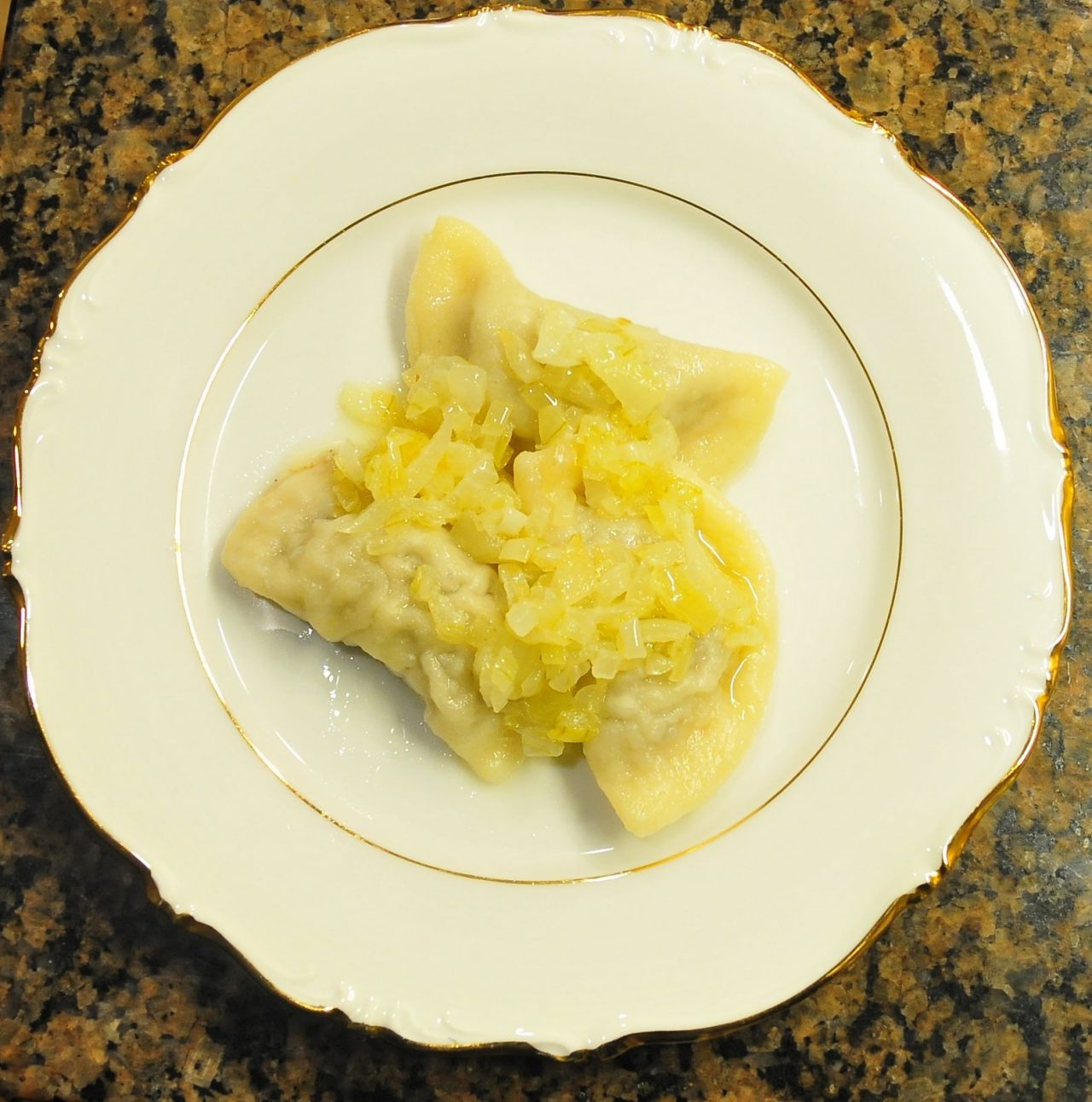
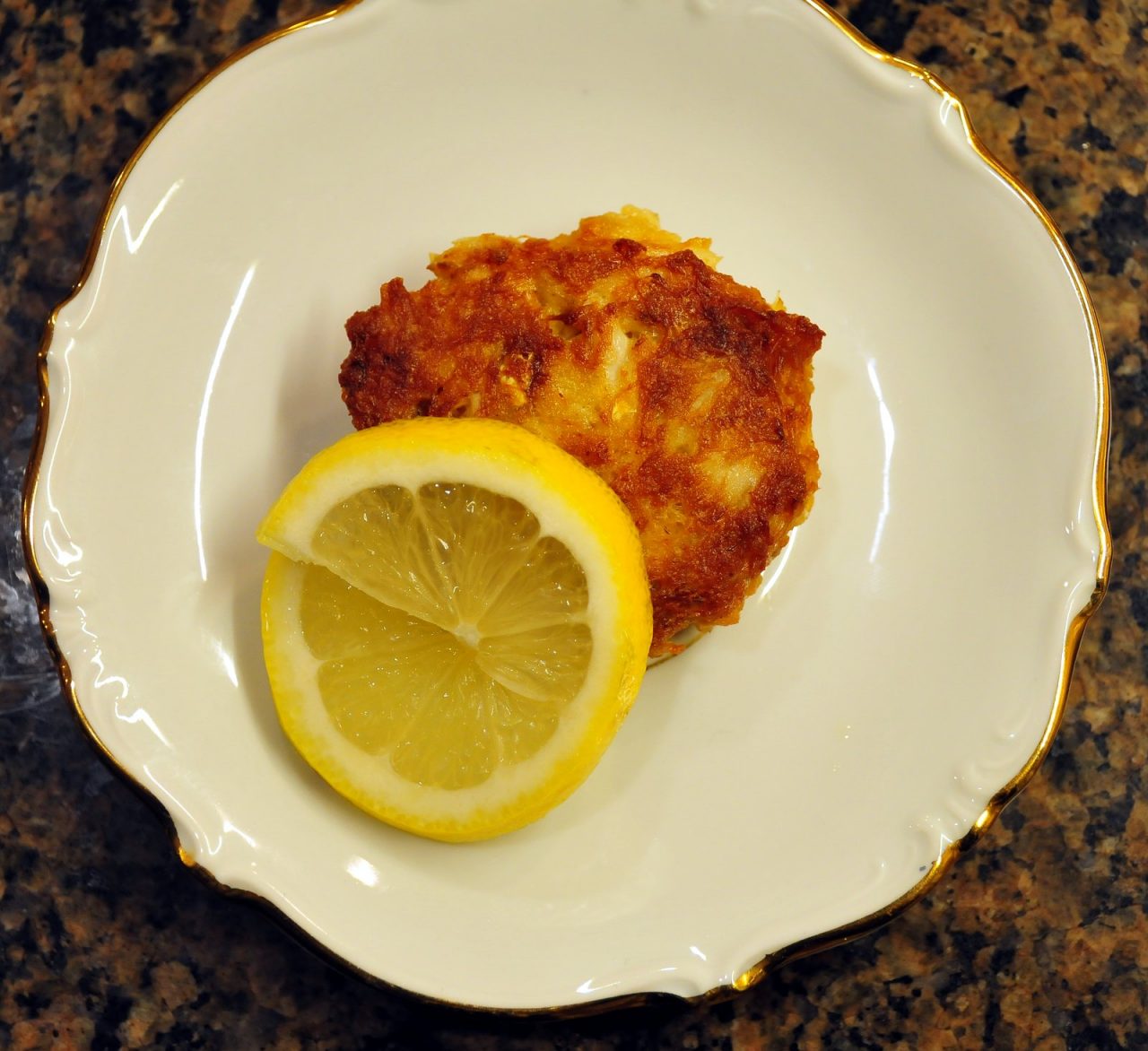

Dinner over, we head to the living room for presents. Probably this is the best part of the day for the kids: they can’t imagine what it’s like to go to bed Christmas Eve without the presents as we do it Polish style — everything opened tonight.
And I guess, truth be told, it’s everyone else’s favorite as well. The gifts we get? Who cares, really, except for one gift: the kids’ joy. The Girl got what she’s been talking about for ages: a bow and arrow set. When she saw one in Kmart the other day (when we went to find something or other for decorating), she was insistent that we buy it. That she buy it.
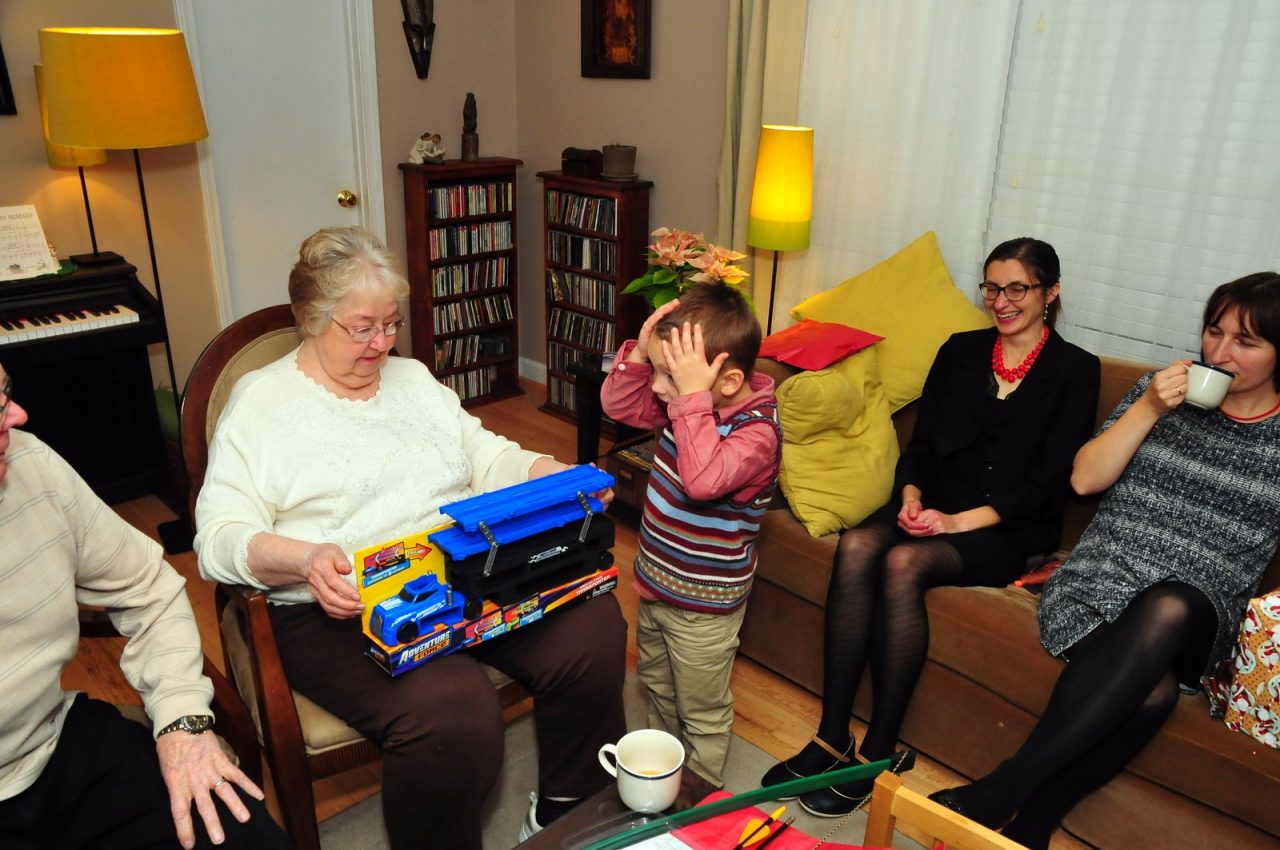
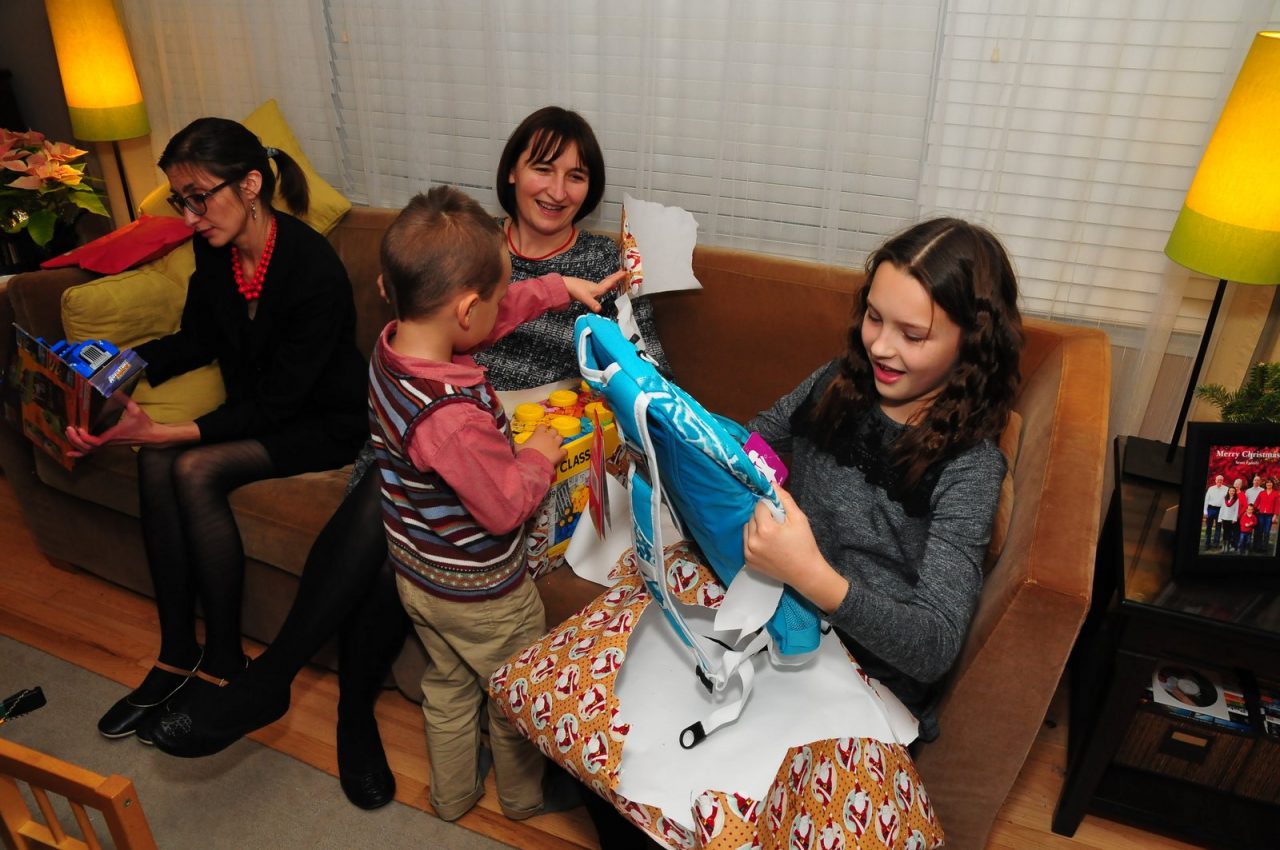
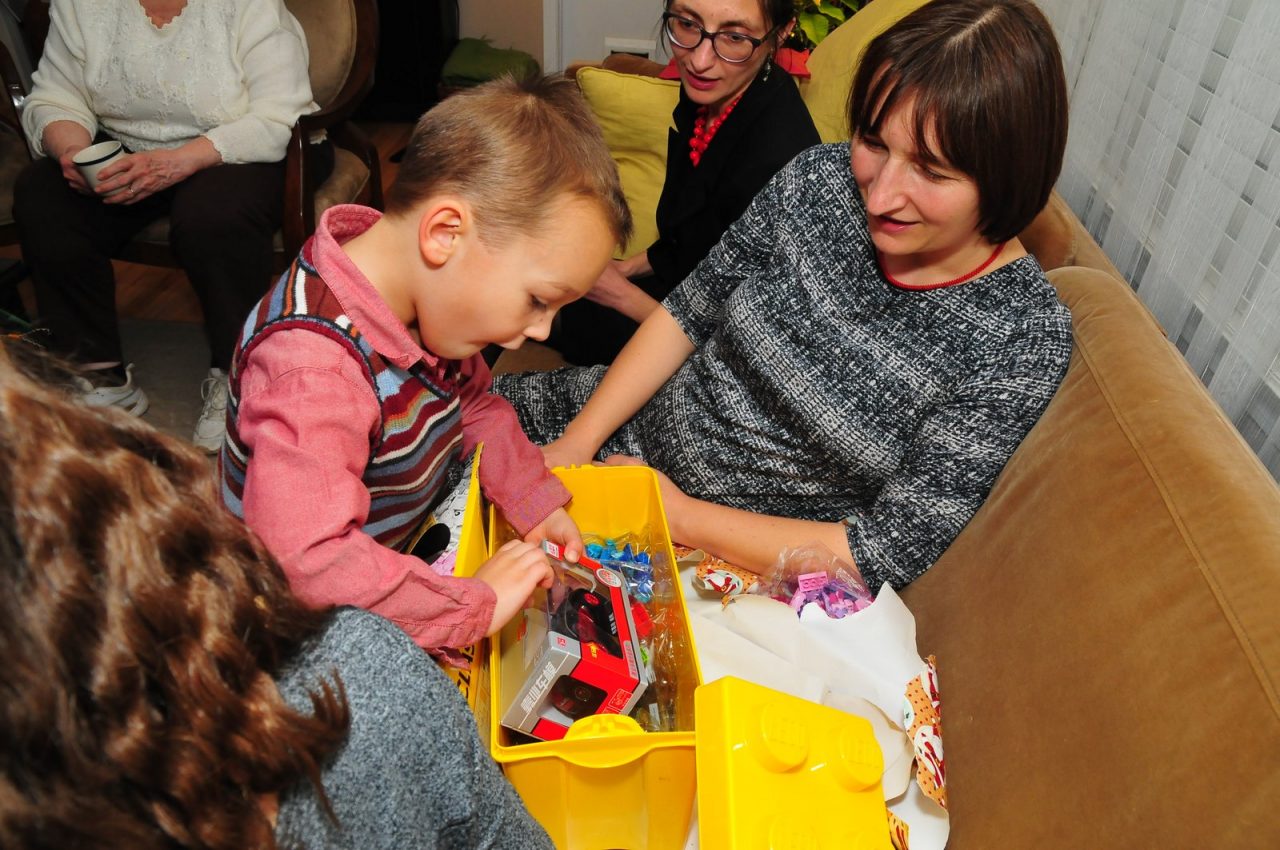
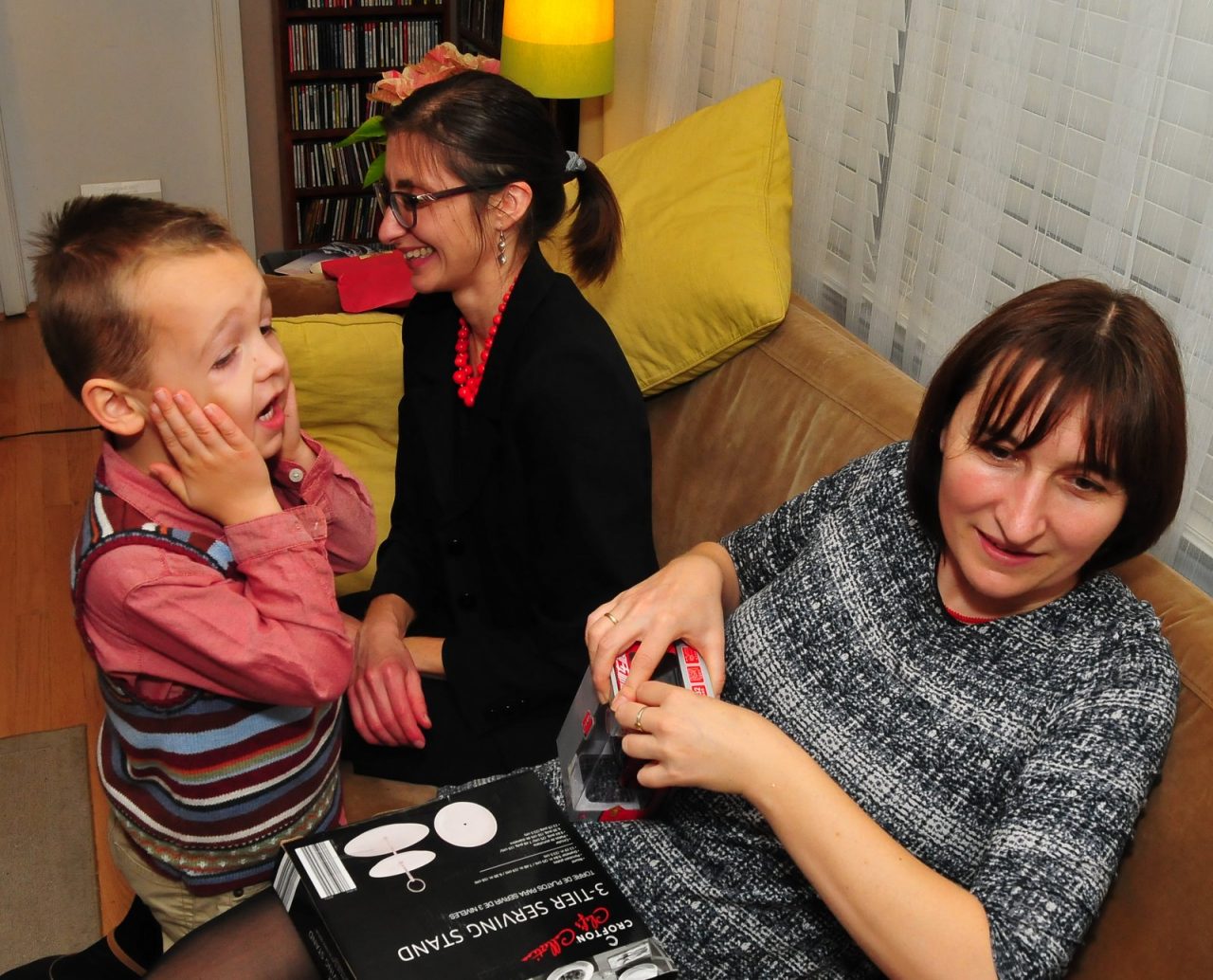
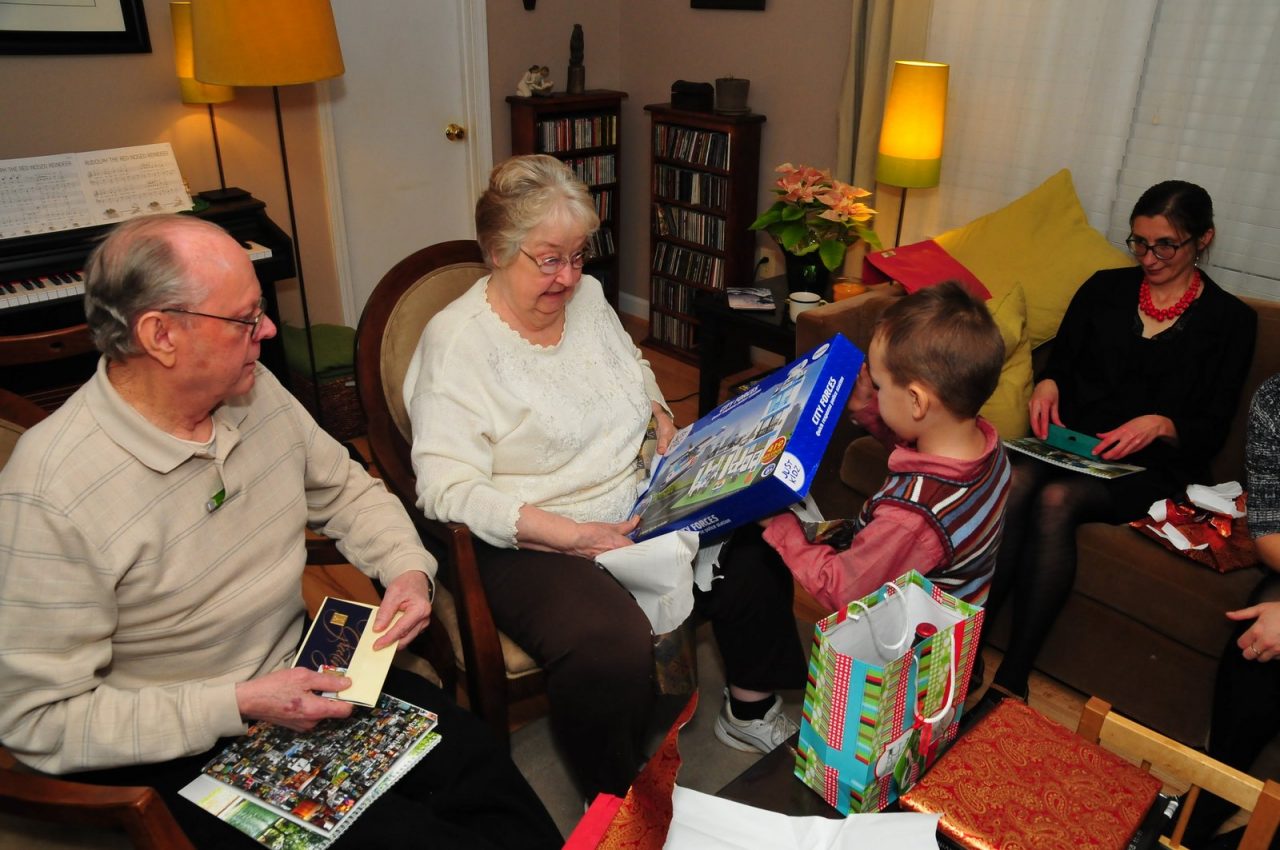
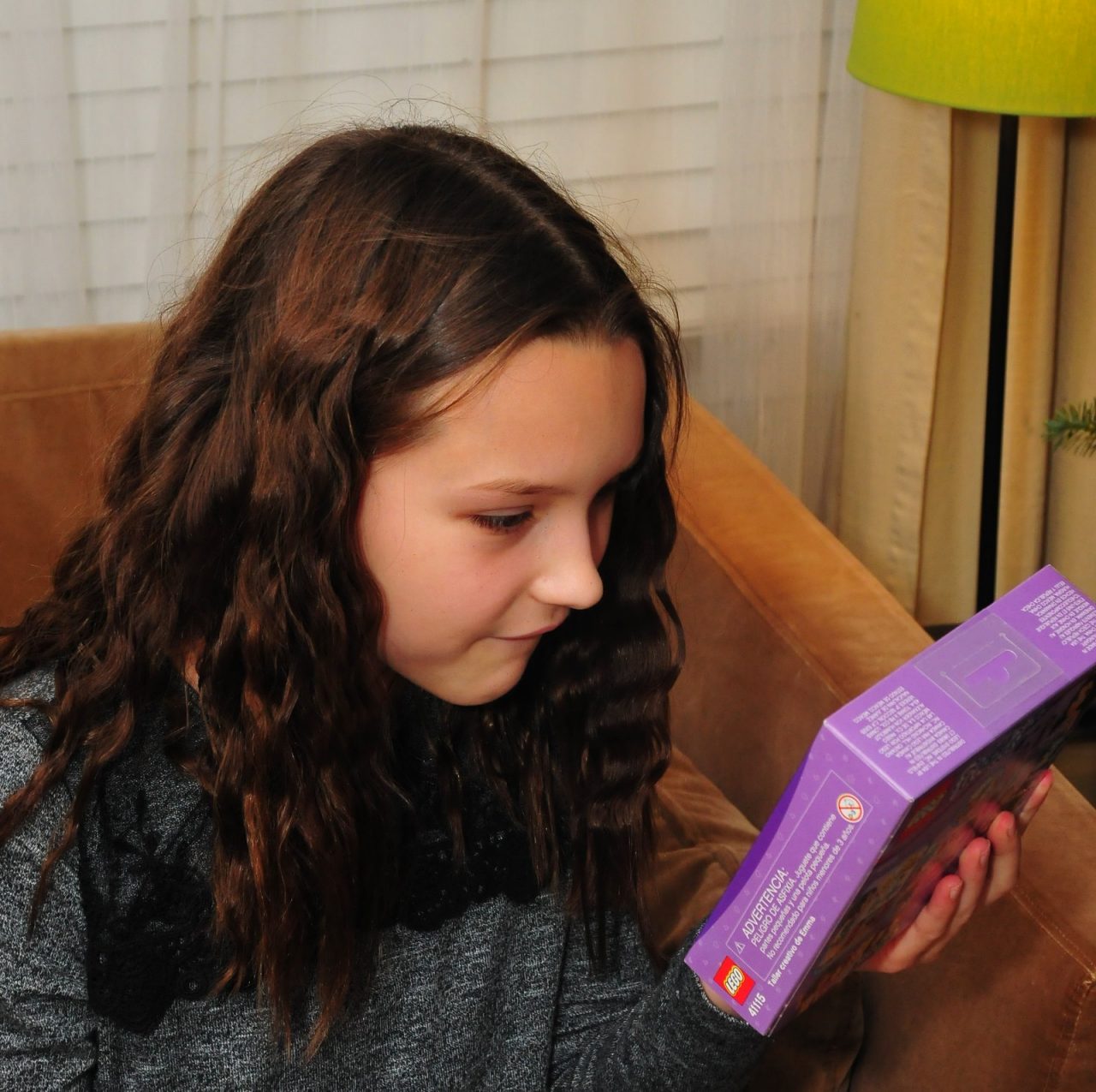
“Please Daddy, I have enough money!”
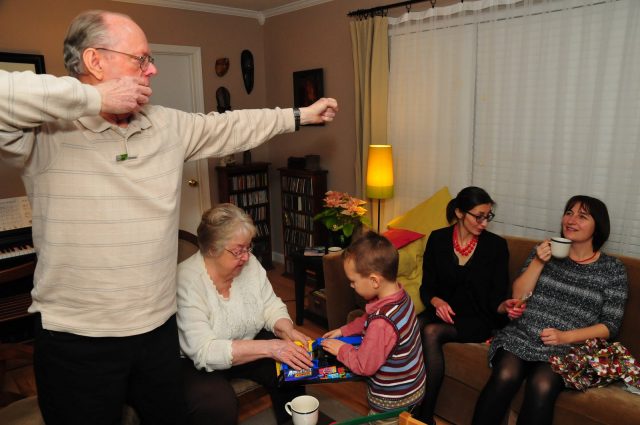
But I already knew Nana and Papa had bought a set for her, so I held my ground and played the mean Daddy. “Can we get it after Christmas?” became the mantra, to which I answered, “Nope, probably not.” Now she understands; then, she was just frustrated. Yet another thing Daddy says “No” about.
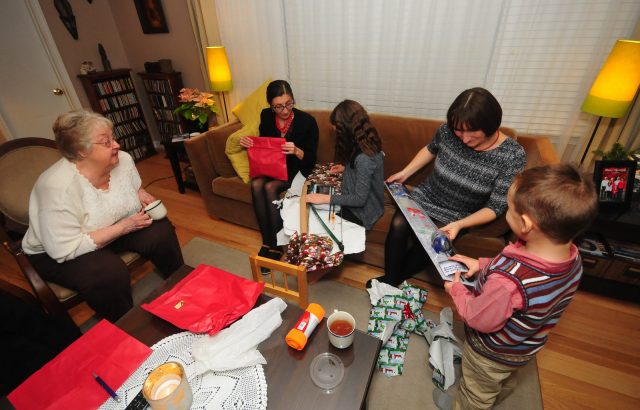
The Boy’s big prize: a fishing rod from our fishing neighbor. “Oh, I’ve been wanting one of these for years!” he exclaimed.
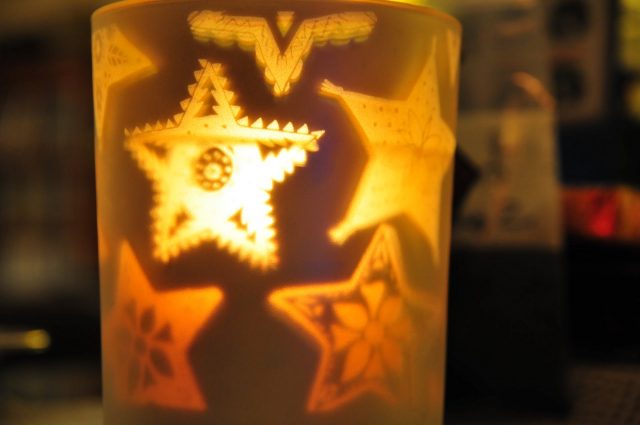
We talk and laugh, and before anyone knows it, it’s almost time for Christmas vigil Mass. Nana and Papa head home, and we pile into the car and head to our new parish.
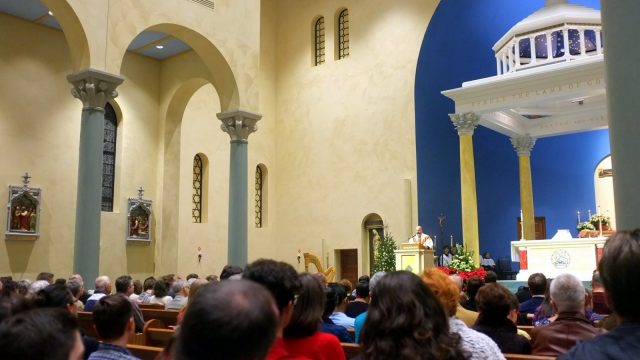
Father Longenecker’s homily focuses on the three animals that are traditionally thought to have been in the barn with Mary, Joseph, and the newborn Jesus. There’s the donkey, which seems to symbolize how we’re all so stubborn in a way. Yet it was a donkey that Christ rides into Jerusalem on Palm Sunday. There’s a continuity there.
Next, there’s the ox, which usually labors under a yoke. Three decades later, Jesus to his disciples says that “my yoke is sweet and my burden light” and invites the disciples to take up his yoke. But the early Church Fathers saw in this a parallel with taking up the cross of Christ. Just as the older ox in a pair takes the heavier load, so Christ.
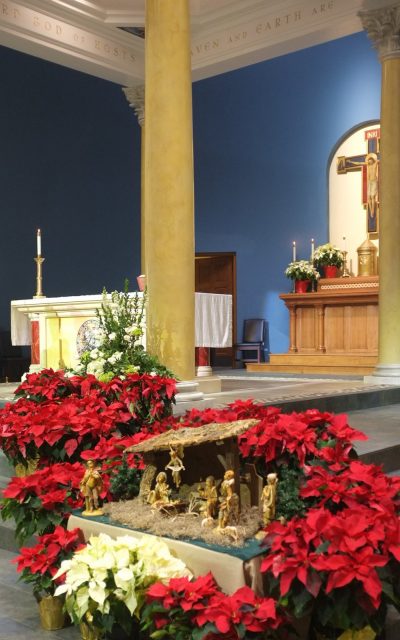
Finally, there’s the sheep. This reminds us of the fact that Jesus is both the Good Shepherd and the Agnus Dei. (Below: Penderecki’s Agnus Dei — not from tonight’s Mass.)
In closing, Father speaks of the simple crib the infant Jesus had, a manger. It’s close to “eat” in French, and therefore etymologically related to the Latin, the original language of the Church. The Church Fathers saw this as symbolic too, with the manger foreshadowing an altar and Jesus as the Eucharist.
It’s a blessing to end the evening in such a beautiful space; it’s a blessing to have a priest who gives you something to think about; it’s a blessing to have a choir that sounds like this.
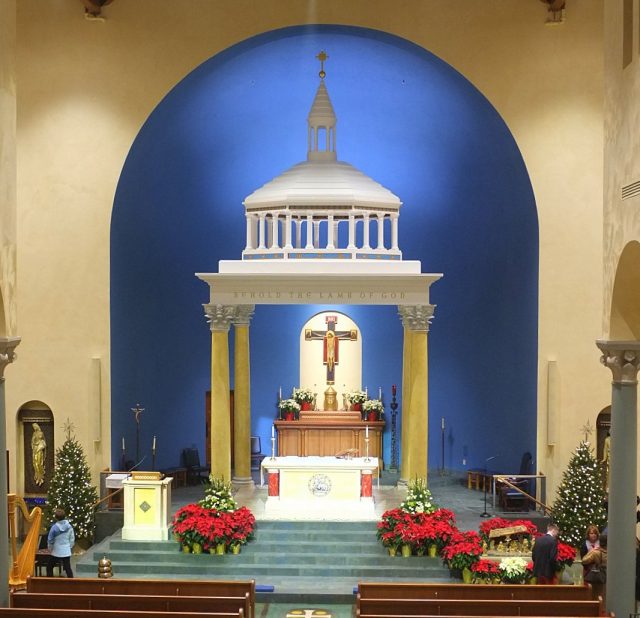
I kneel on the concrete floor, careful to put my left knee down since we don’t have a kneeler as we’re sitting in the overflow seating and I know what will happen if I put any weight on my right knee, and I think back to the beginning of the day, to my thoughts that have been bouncing around all day: what makes this Saturday any different from any other Saturday? We do. Our decision to make it different makes it different. We could abandon all tradition, we could order pizza and watch silly movies, or just go about our day as if it were any other Saturday, but we don’t. And that’s what makes it different.

I look to my fellow parishioners and familiar thoughts swirl about: even if all of this is human-made, even if the wafer the priest holds aloft as the altar server clangs the altar bell remains just a wafer, there is value in all of this, in the singing, in the humbling (after all, isn’t that Christmas is about, the ultimate humbling?) of ourselves, the stopping one day a year and looking about us and seeing all that’s beautiful in the little spheres we orbit.
Wigilia 2003
Wigilia 2004
Wigilia 2005
Wigilia 2006
Wigilia 2007
Wigilia 2008
Wigilia 2009
https://matchingtracksuits.com/2010/12/25/wigilia-2010/
Wigilia 2011
Wigilia 2012
Wigilia 2013
Wigilia 2014
Wigilia 2015
Tomorrow is the Feast of the Immaculate Conception, a holy day of obligation in the Catholic Church, which means you’ve got to go to mass. Our new parish, though, is only have a morning mass, so we went to the vigil mass tonight. At six. Which meant the Boy was ready to go to sleep before mass even began.
The notion of the Immaculate Conception has always confused me, no less now that I’m Catholic. The idea is that, to avoid the “stain of Original Sin” passing on to Jesus, God removed from Mary at her conception original sin. The mechanics of this, as I understand it, involve retroactively applying the salvific nature of her son’s sacrifice to her — which brings about an obvious question: why not just do that to everyone? In the spirit of “fake it until you make it,” I go along with it. But the whole thing leaves me a little off kilter. So, truth be told, does the whole Christian story, and I guess that’s supposed to be the point of it in some sense.
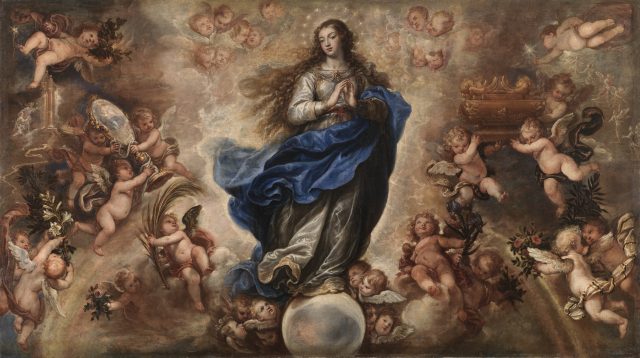
There are so few things we encounter these days that we could call “immaculate.” A newborn child. And I sit here, thinking about what I could add as a second item on that list, and even with the thought of adding a qualifying “perhaps,” I’m stuck. Perhaps that’s a good thing. Perhaps that’s what Original Sin is all about. Perhaps it’s human nature. Perhaps Original Sin is human nature. Perhaps it’s not important at 10:50 on a Wednesday.
Part of growing up, I think, is that realization that “immaculate” really doesn’t exist in our world. The natural world is filled with such cruelty, with wasps that plant their eggs in still-living organisms that the larva will literally eat alive — and likely very painfully. Then there are all the natural disasters just waiting to happen, or just happening. Thinking about “immaculate” leads us to think about its opposite, whatever that might be, and perhaps that’s a good thing. Perhaps that’s the point.
All things come to an end, and more often than not, that end is itself a beginning. Our summer’s adventures in remodeling have finally come to a complete and total end. Well, almost — there are still pictures to hang on the walls, but we’re 99.97% finished now. And so as we prepared our yearbook, we finally took the time to unclutter the kitchen and take some “After” shots to complete our “Before” shots.






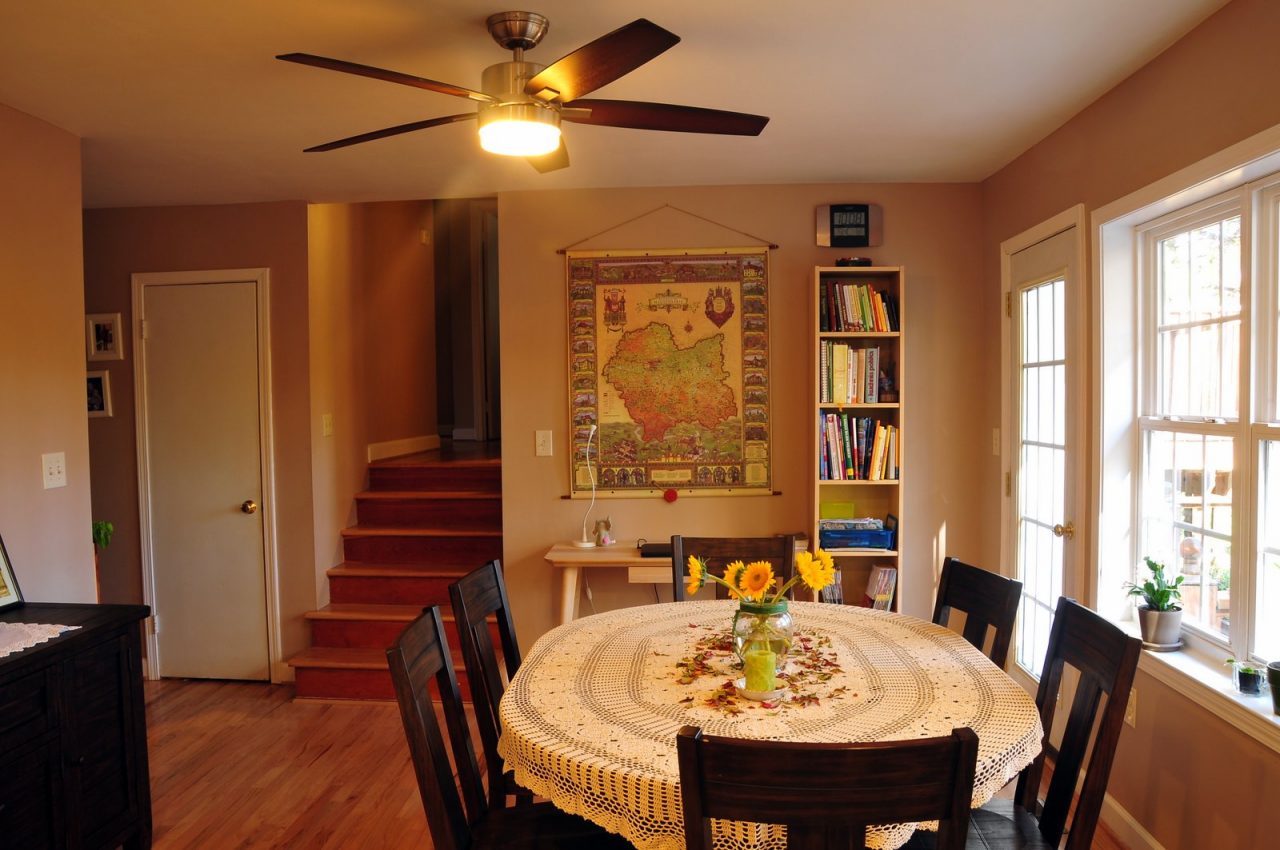
Our parish is in a similar situation: a two-year building project came to completion tonight with the dedication of our new Our Lady of the Rosary church. Like with our kitchen, there are still a few things the Father Dwight said we need to do, like completing an enclosure around the whole campus to ensure safety for the parish school — can never be too careful these days.
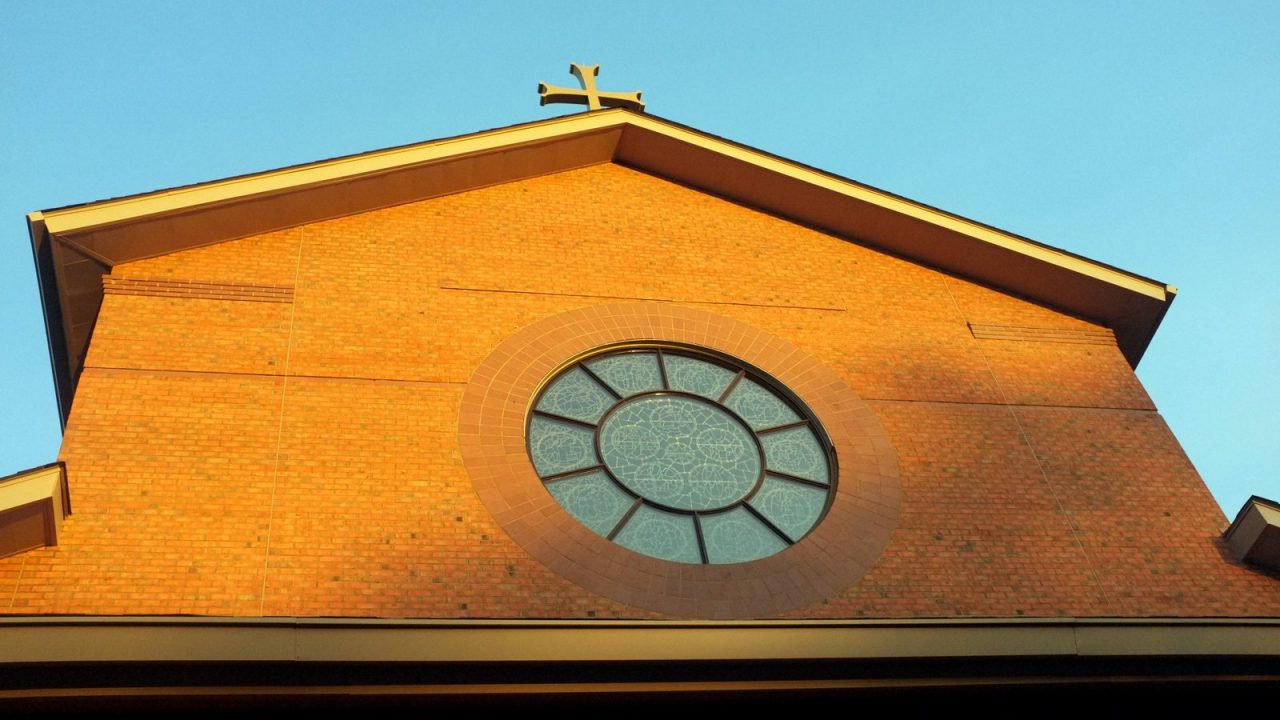
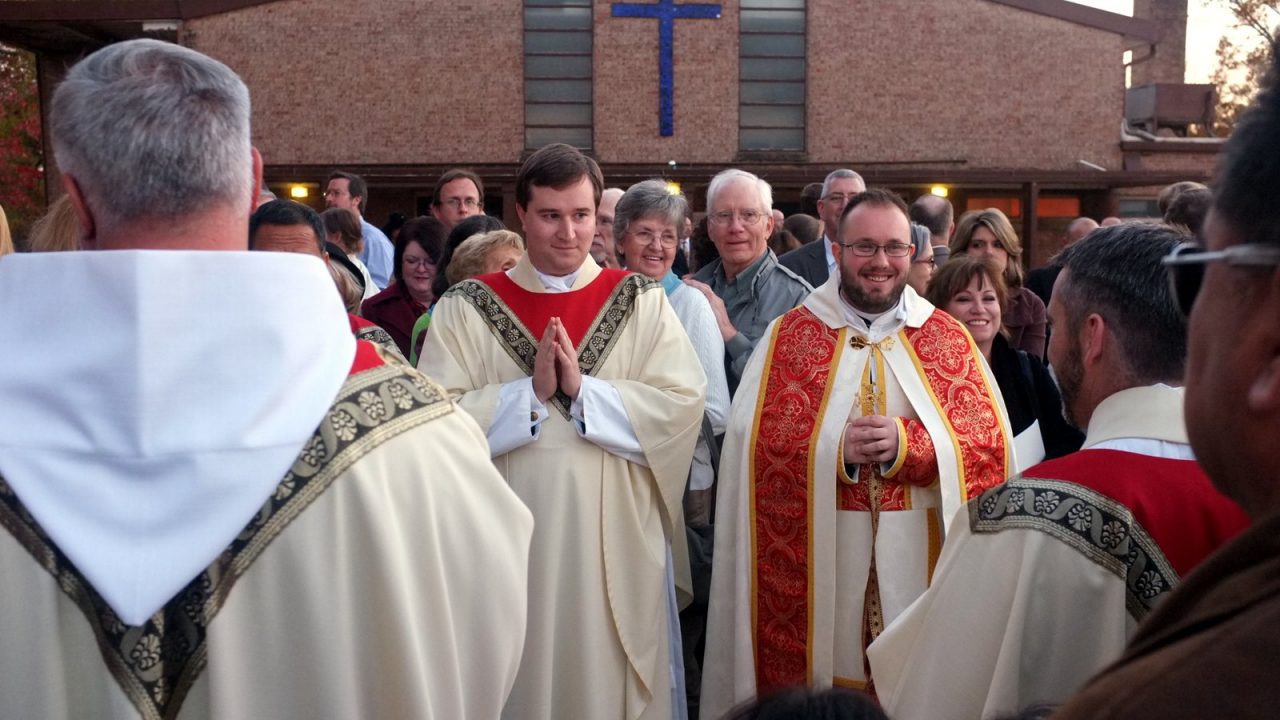
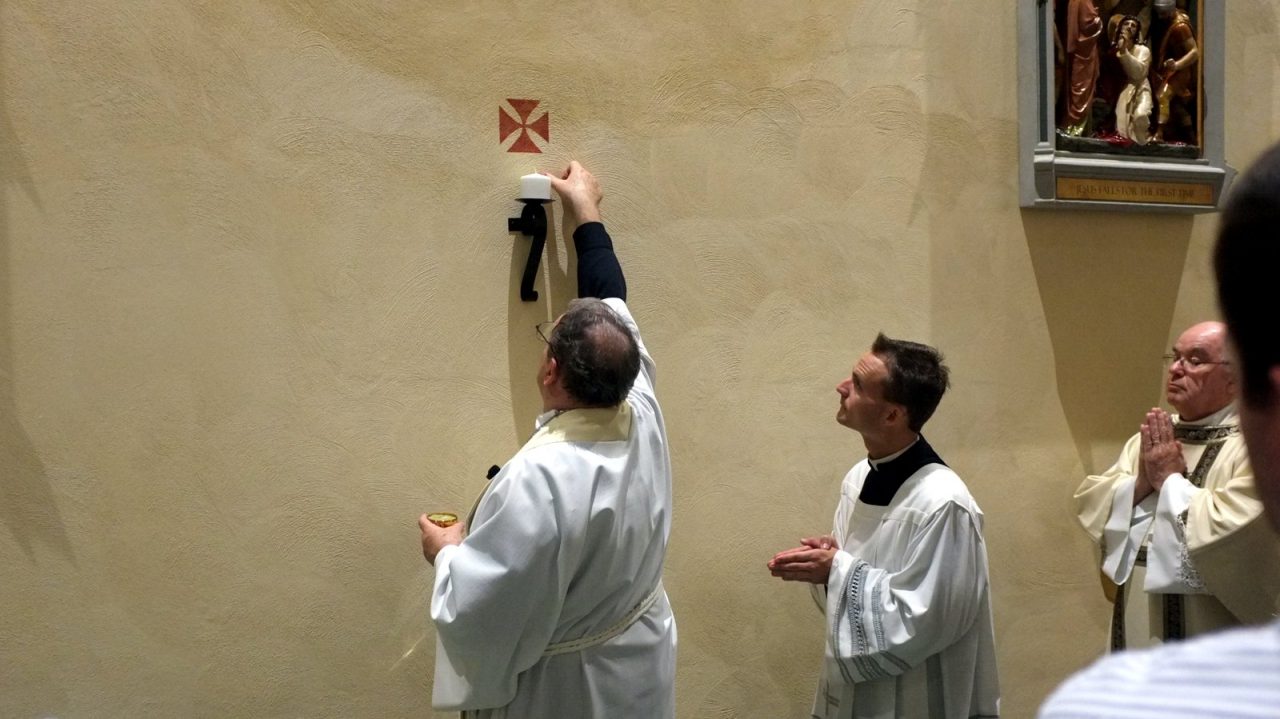
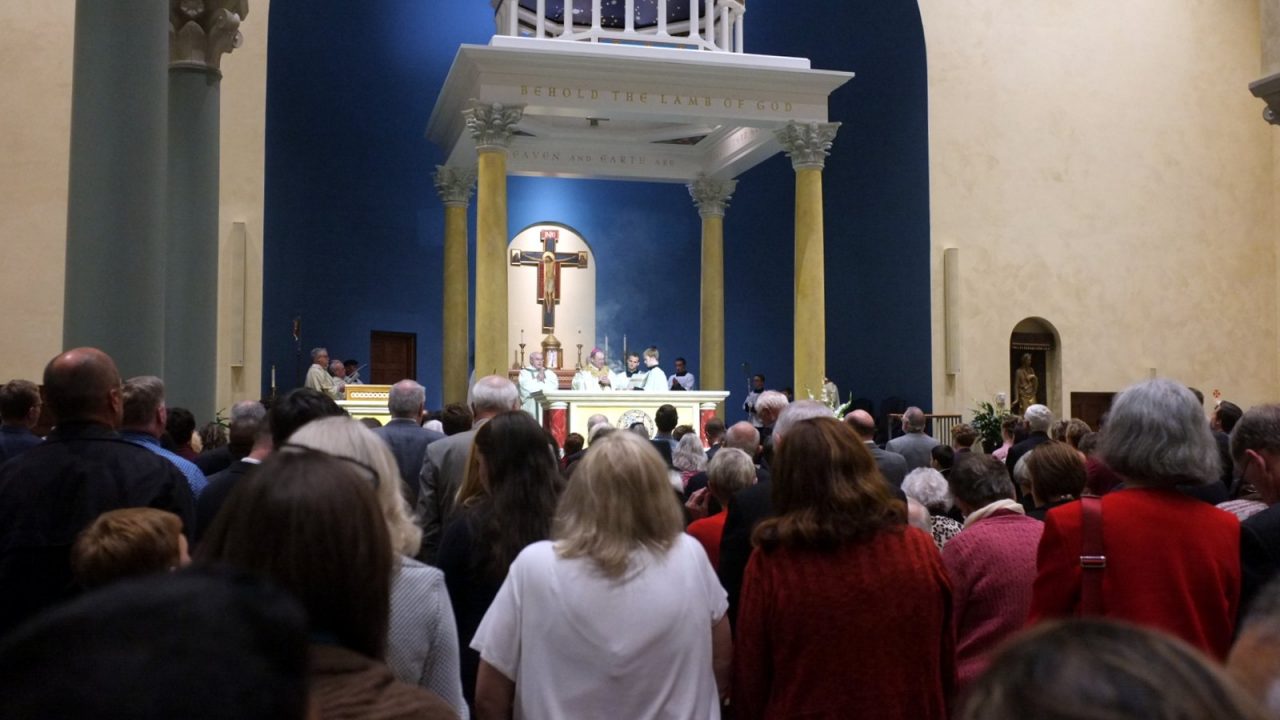
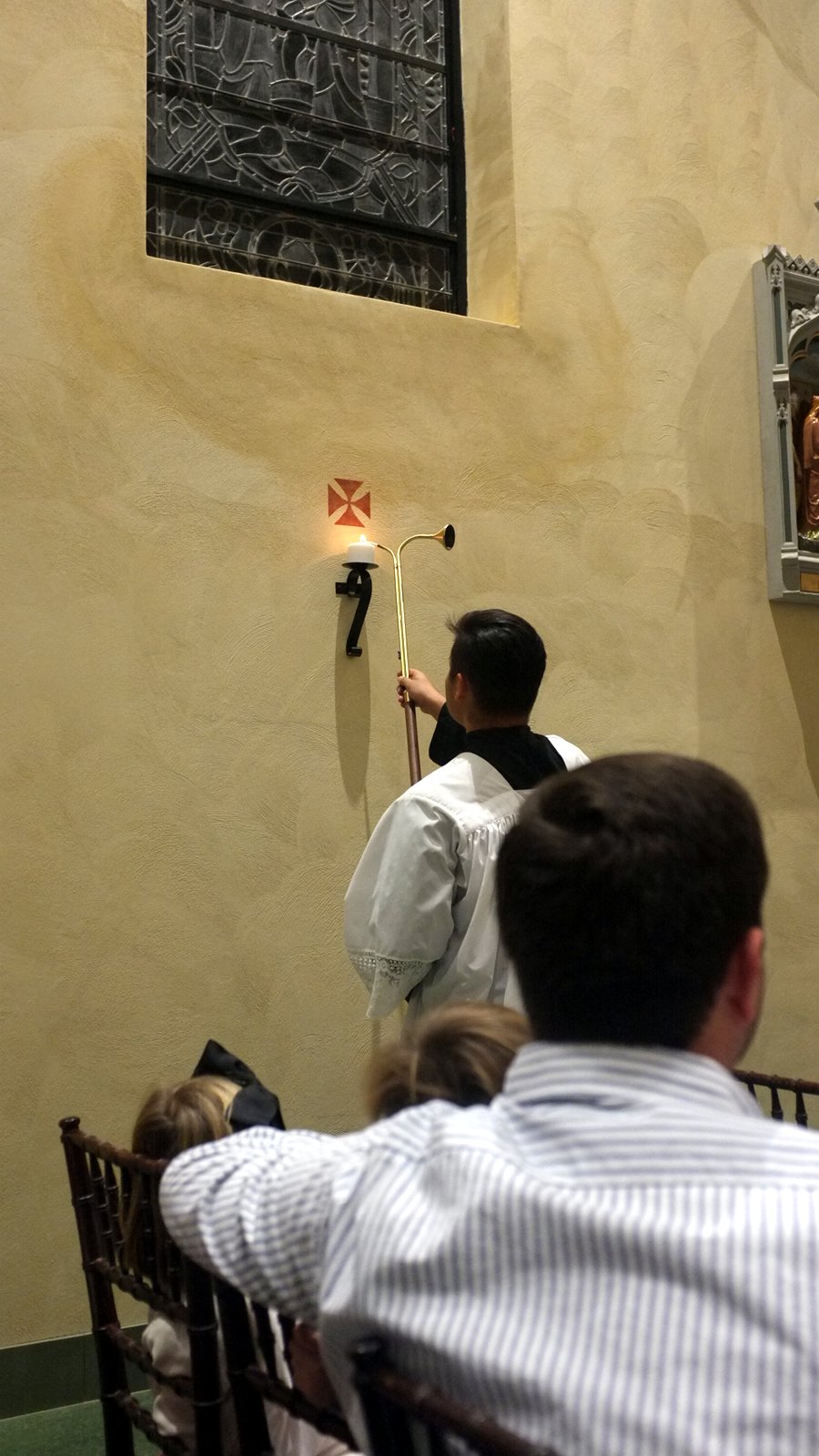
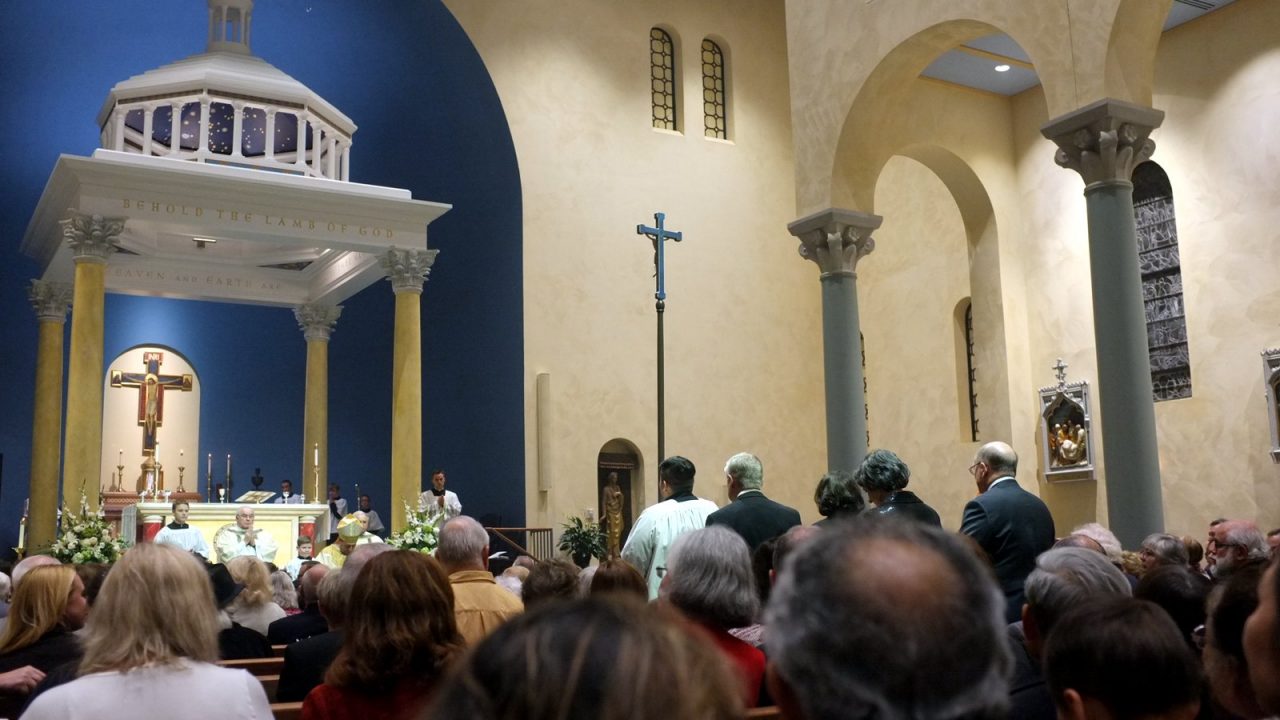
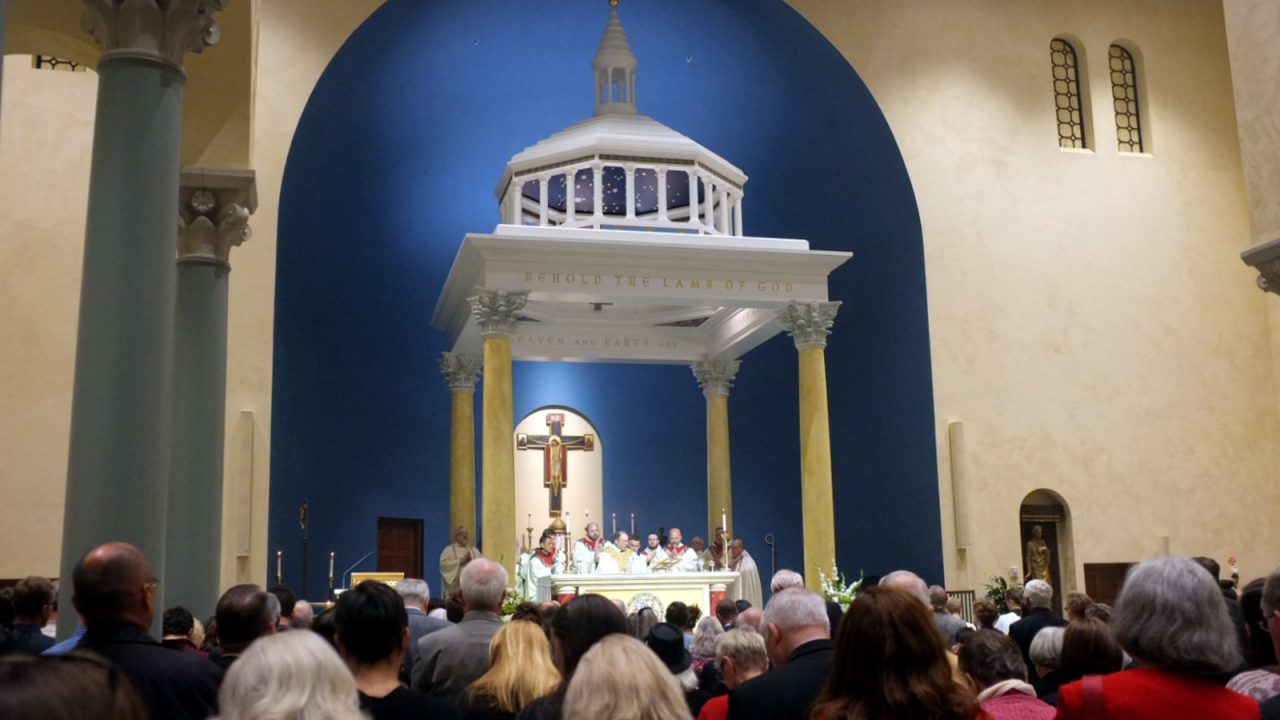
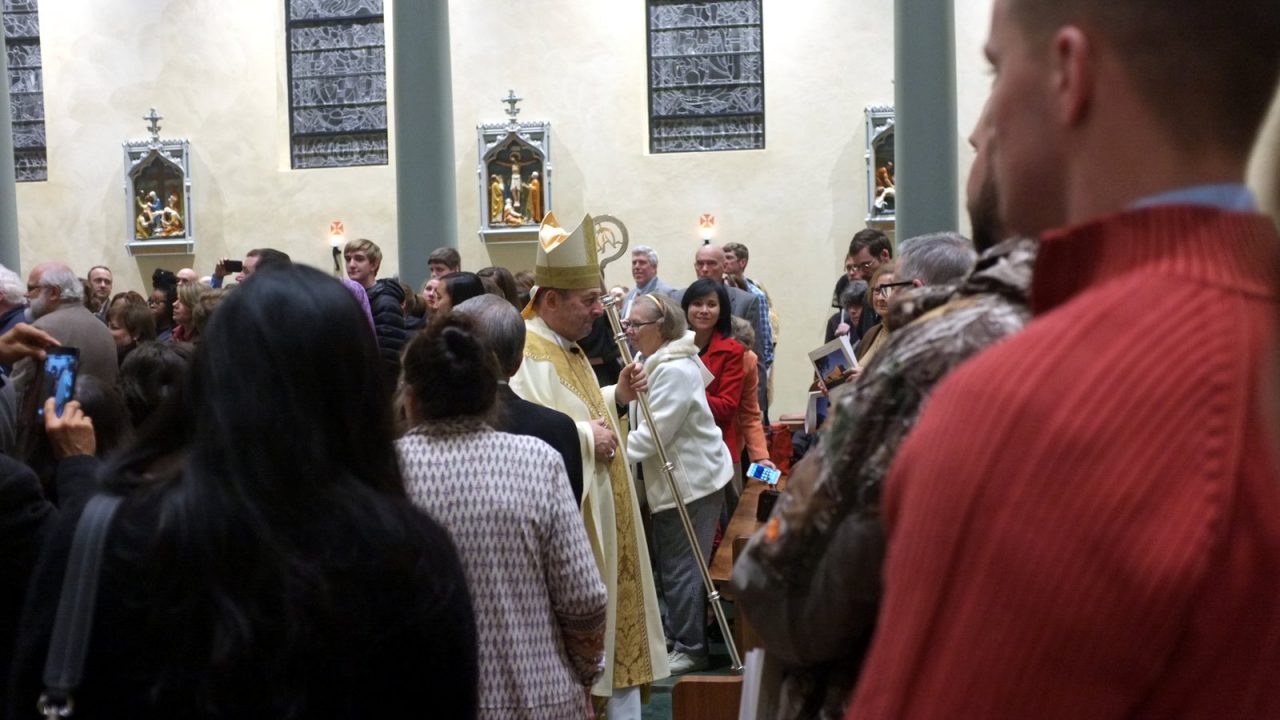
Father Dwight warned, so to speak, the parish that the liturgy for the dedication of a new church is long. “Really long,” he stressed. We dropped the Boy off at Nana’s and Papa’s as a result, because we really didn’t know what “really long” might mean. K comes from a country where most churches’ age is measured in centuries, and so the idea of attending a Mass to dedicate a new church was completely new to her. But Father did say “really long,” so we decided not to take a chance — the Boy can handle only so much sitting still.
“Really long” turned out to be just shy of three hours. Having grown up in a church were every week’s service was at least two hours long, I would say two hours and forty-five minutes make a long service, but not a really long service.
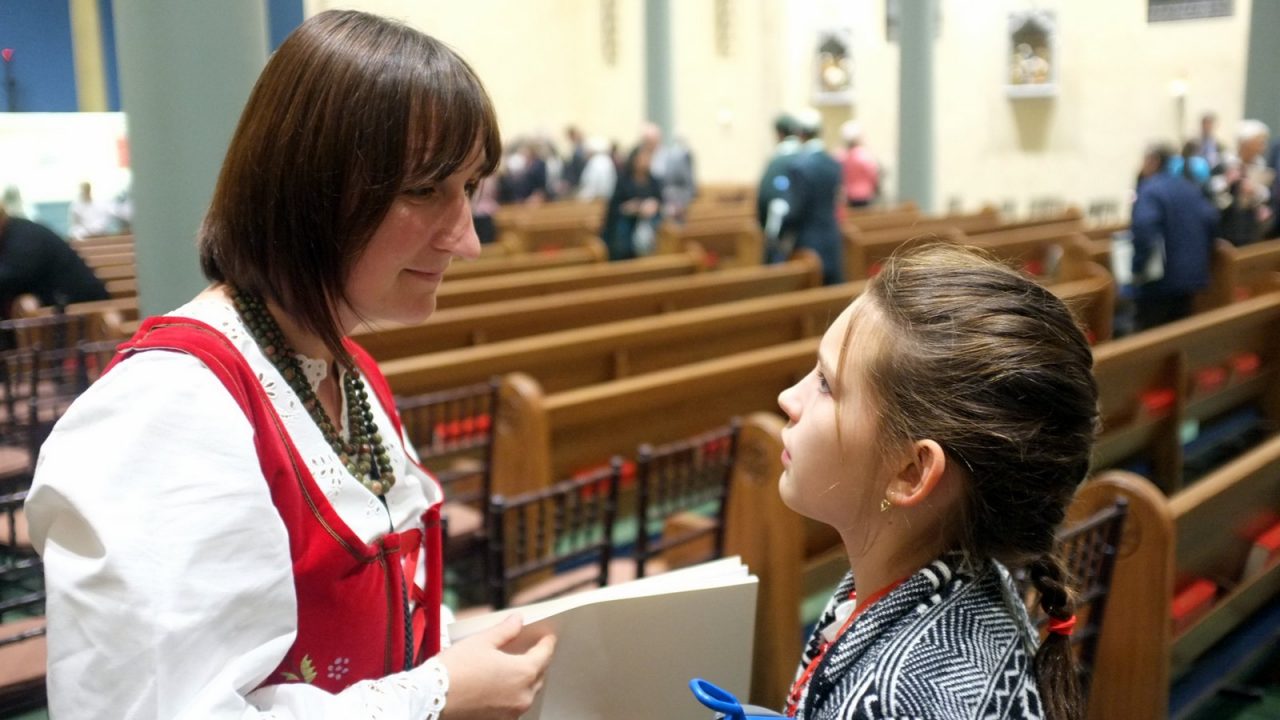
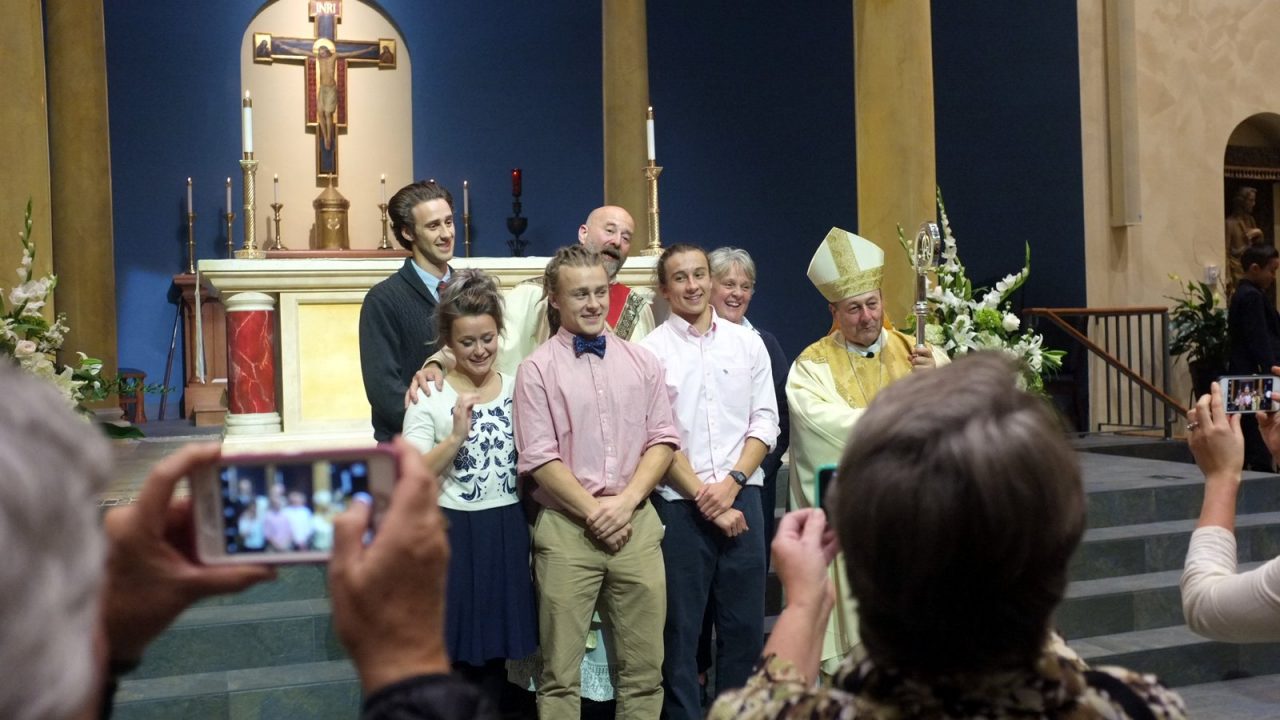
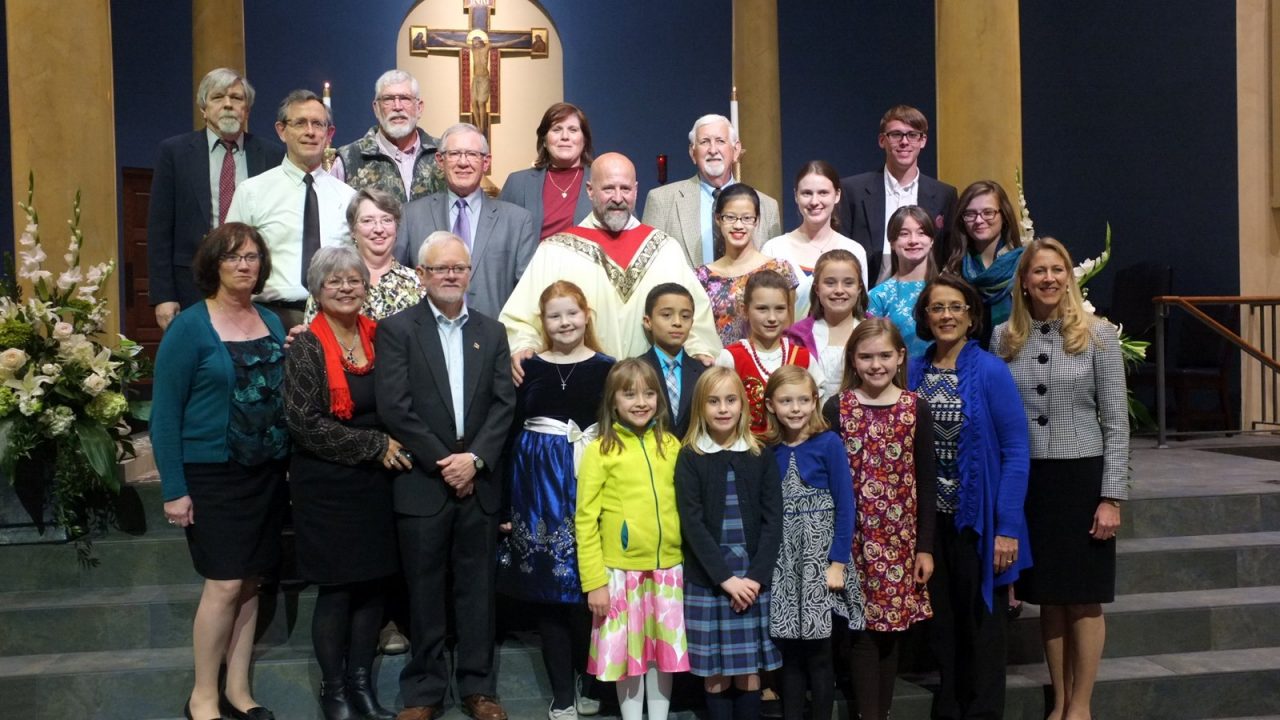
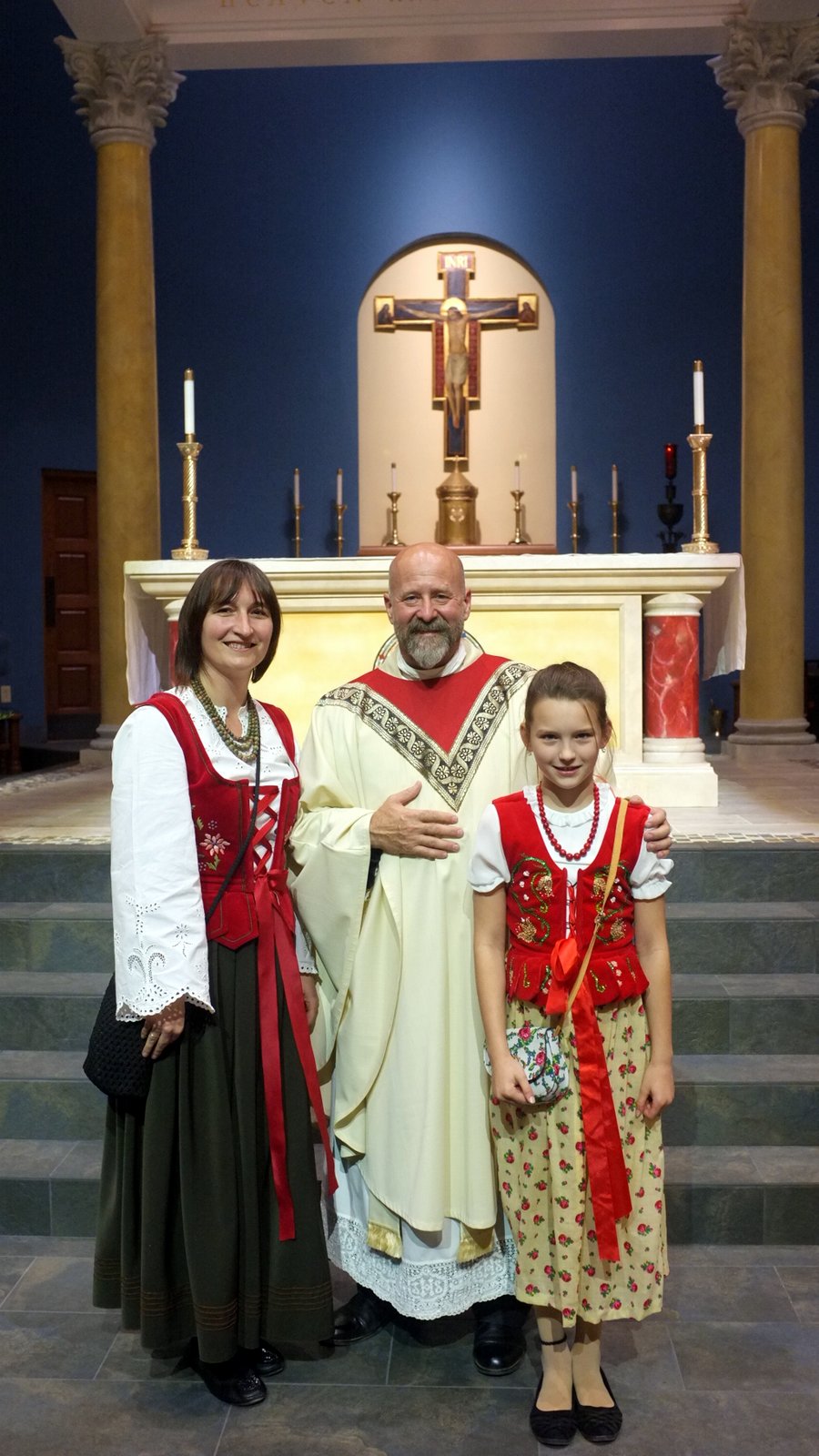
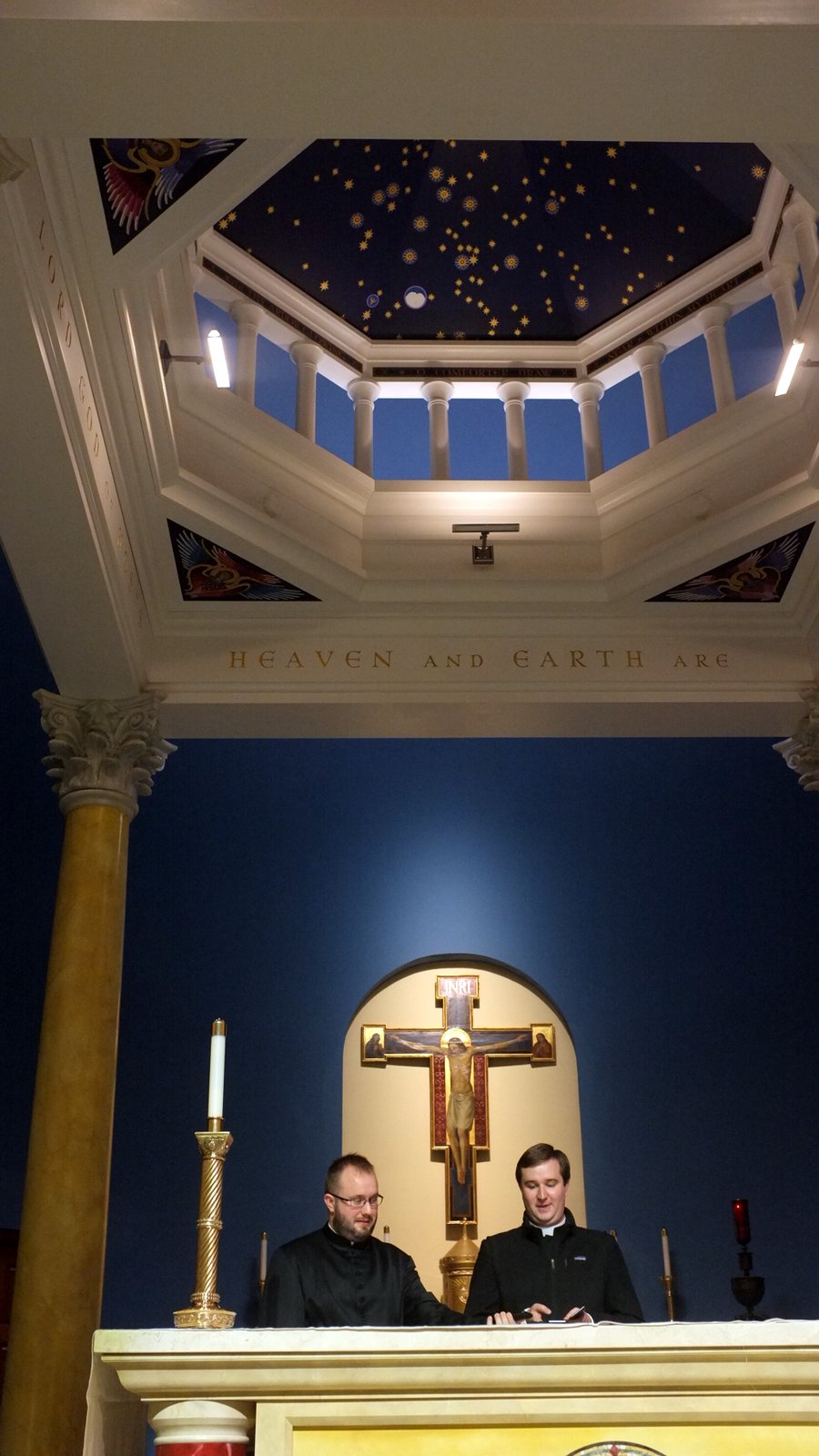
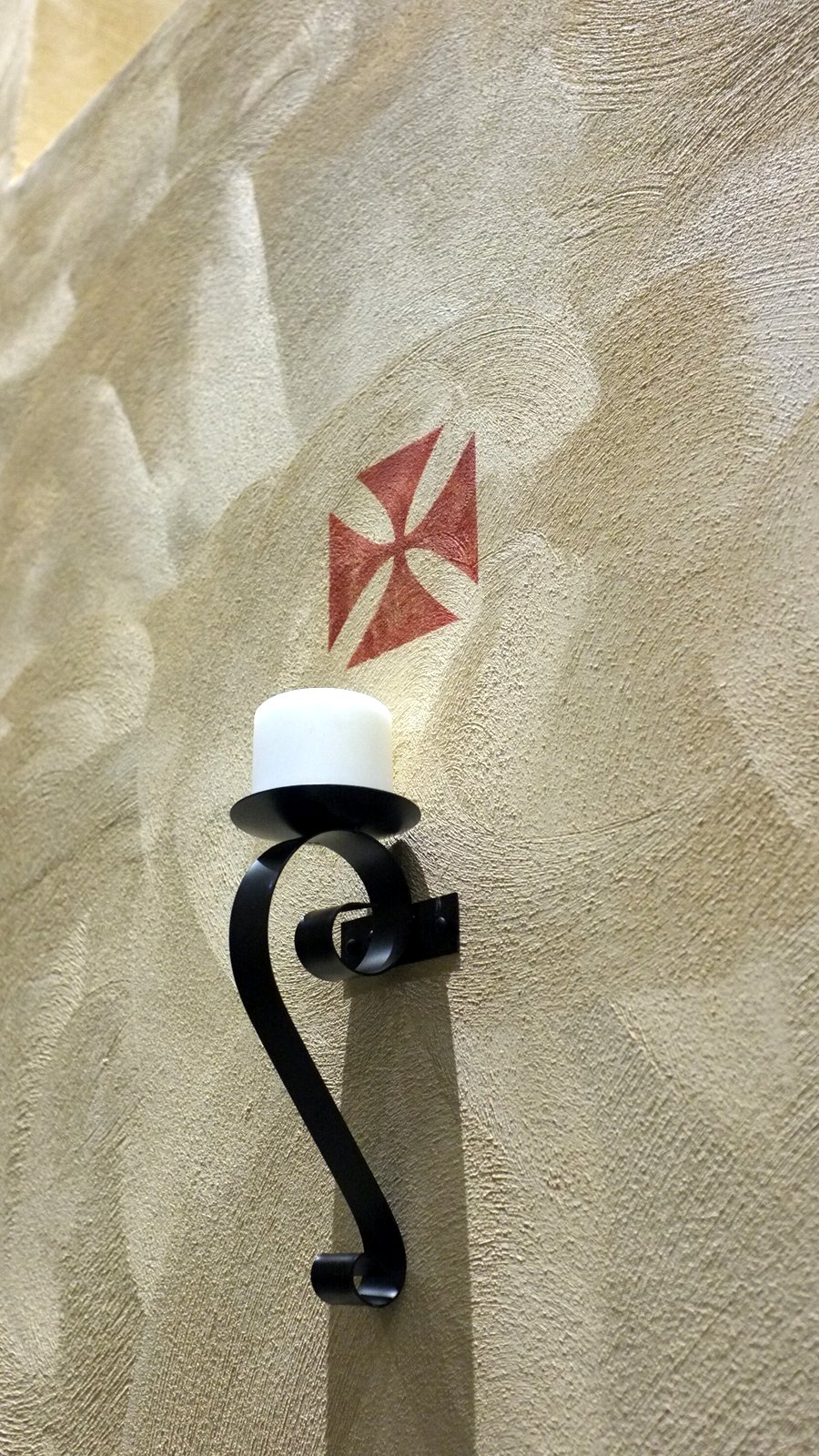
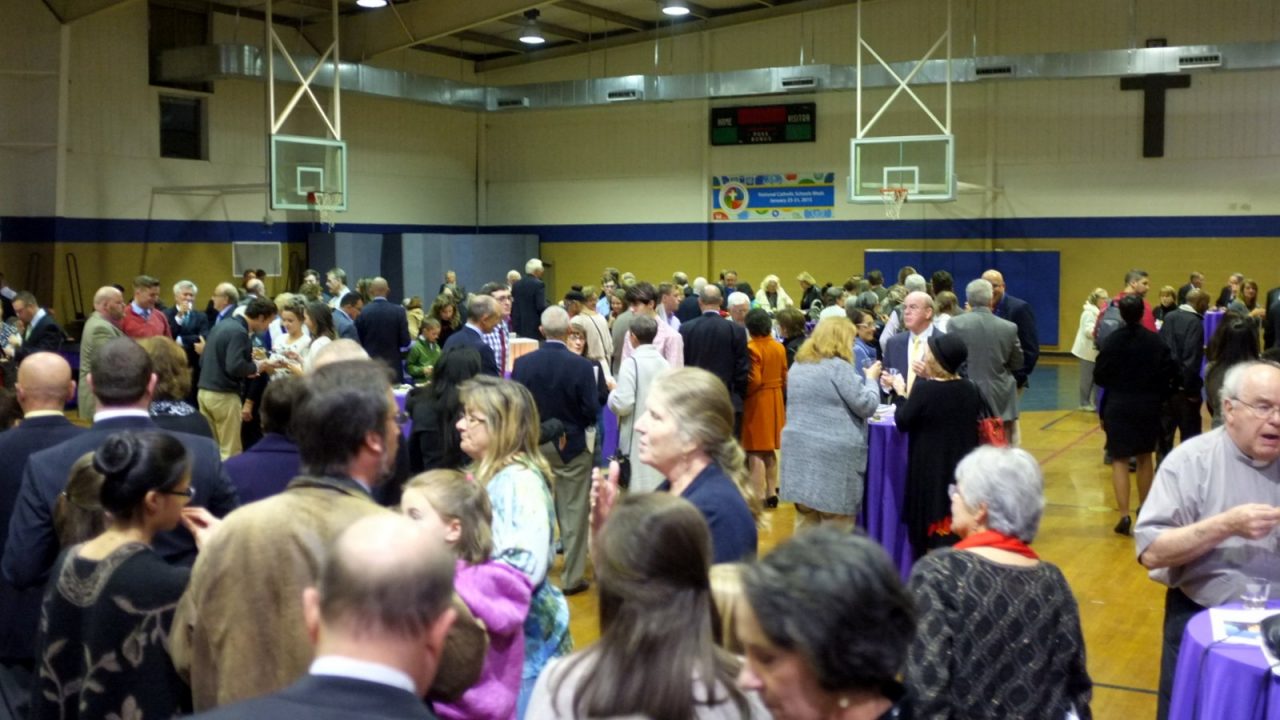
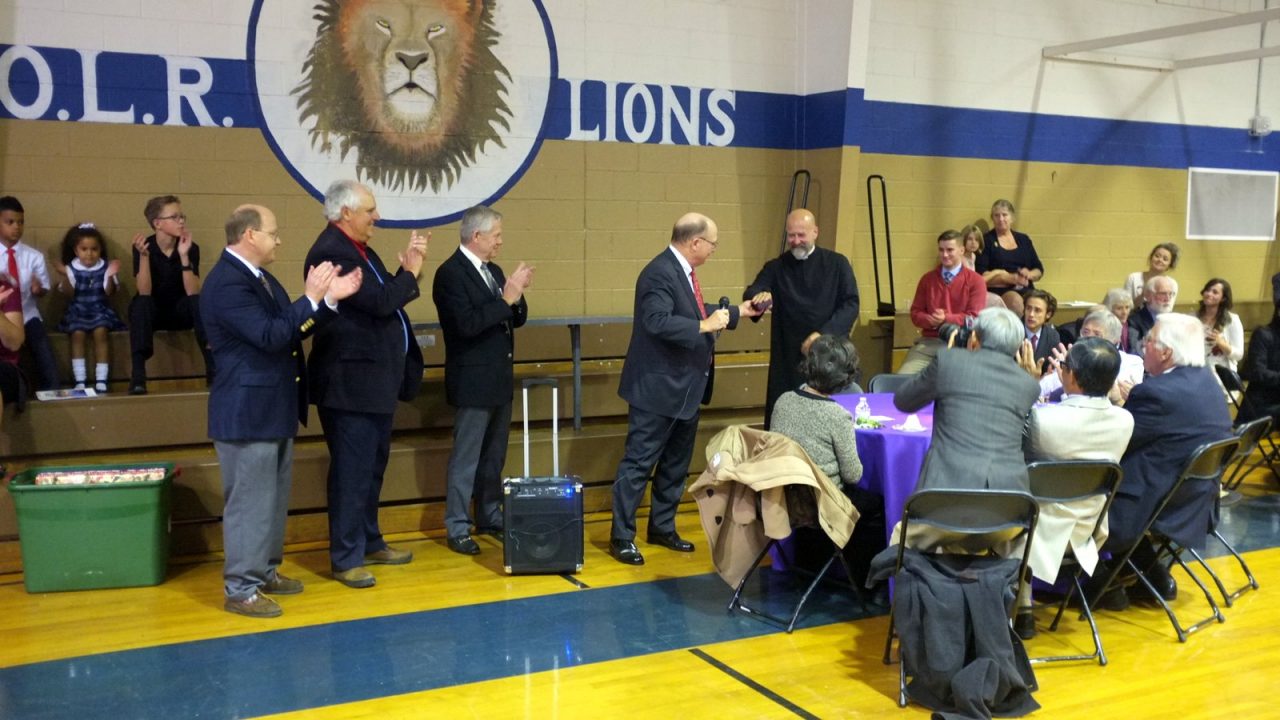
The liturgy was lovely, and it’s fitting that Fr. Dwight be the pastor of the parish: it’s a uniquely Catholic-looking structure, and Fr. Dwight is a uniquely un-common Catholic priest. Raised a Protestant, he converted to Anglicanism and moved to England where he married, started a family, and had a lovely parish. Then trouble struck, so to speak, and he and his family converted to Catholicism, which meant the loss of his vocation. Or so it would seem. It turns out, several dozen married Anglican priests have converted to Catholicism and then been re-ordained as Catholic priests with the discipline of celibacy being waived for them. So he posed with the bishop and his wife and four children after Mass, making it an odd sight in an oddly traditional church.
The real stars of the evening, though, were the members of the choir, including L. She’s been singing in the children’s choir for several months now, and she spent more time in the church today than she’d spent in a month of Masses — over five hours.
The results, though, were stunning. A Catholic church that looked, smelled, and sounded like a Catholic church.
During the entire liturgy, I smiled occasionally as I thought, “This is not just some lovely church we’re visiting while passing through here or there. This is where we will go to Mass every Sunday now.”
What you see depends on where you stand. It’s true physically and culturally, and there is even some truth in it artistically. Take a novel like William Faulkner’s Absalom! Absalom! in which the story of Thomas Sutpen takes on mythic proportions among the various narrators, each seeing what they want to see, each perspective determined by time and place of birth as well as proximity to Sutpen. We come away from the novel wondering which of the narrators we can really trust, if any of them.
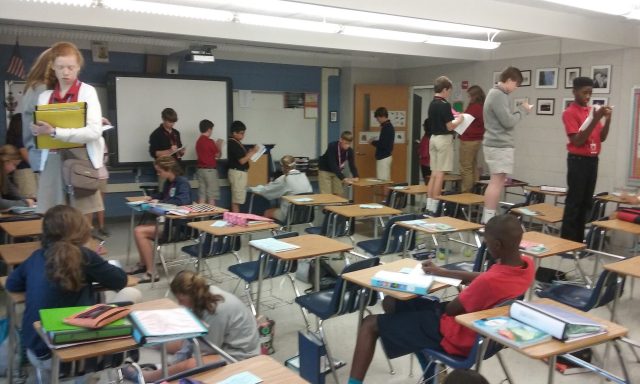
In class today, we began such an examination. Various students took various positions, each of which was determined by their birth date, and the described what they saw. What came out of it was predictable but poignant: everyone was in the same room but everyone’s notes of what they saw were different. No two people made the same notes, or even close to it.
Back at home, K was getting ready for the international festival at our former parish, which still hosts the monthly Polish Mass and so still has a certain draw for us. The Polish community was to have their own booth, selling pierogi and bigos and sausage to raise money for the church.
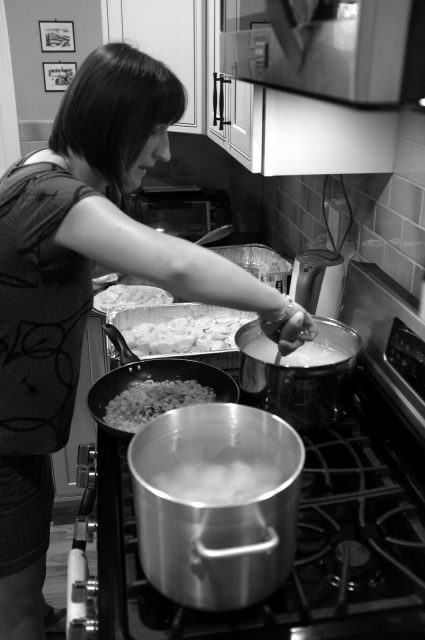
K and some other Polish women spent last Saturday morning making and freezing pierogi, and today there was an unbelievably long line of people interested enough in Polish food to plop down a couple of $1 tickets for a bit of the old country. The bigos was not completely consumed by the end of the evening. “You know Americans and their wariness of sauerkraut,” K justified.
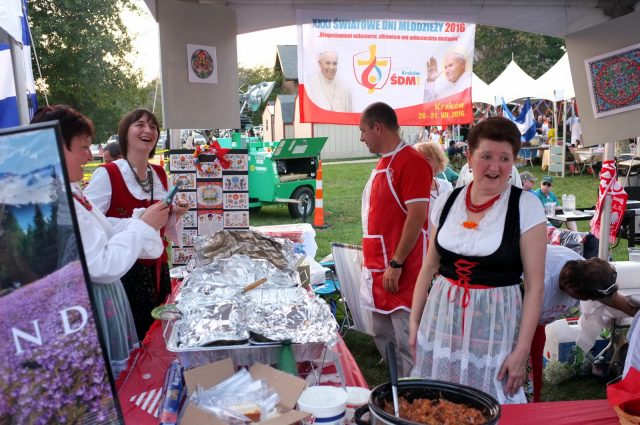
Still, all the pierogi disappeared, and the Poles got to show off their polka skills, and the Polish community even managed to get the pastor to take a quick shot of vodka as the evening drew to a close.
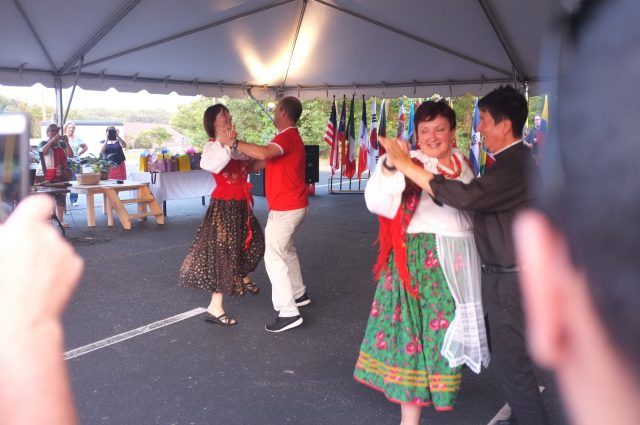
In some ways, then, the perspective of Poland didn’t really change for the visitors. Its cuisine is heavy on the cabbage and potatoes, and there’s usually alcohol involved — that would probably be the average take on Polish culture. And it’s not entirely wrong. But it is of course only one side of the culture. It would have been hard to show that in a three-hour festival along with all the other communities. People visiting a Polish booth expect pierogi, and so that’s what the community provides. A bit of a self-fullfilling prophecy, but when the food is that tasty, who really cares.
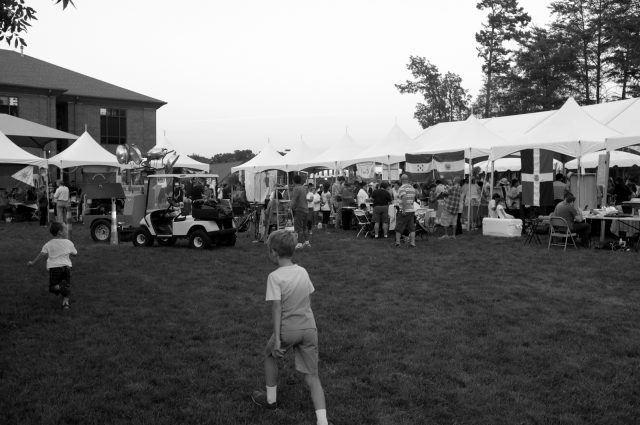
From the Boy’s perspective, it was a bit of a flop. Sure, there were hay bales to jump on and lots to see, but the music was loud, and most of the food was not to his liking.
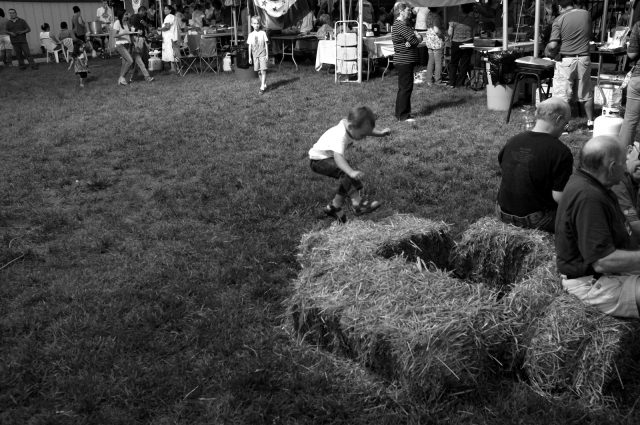
As the sun set, a group of Latin American parishioners performed a dance that they use every year to pay homage to Our Lady of Guadalupe. One look at the costumes and it’s clear where it all came from. Indeed, G, the de facto leader of the Polish community, came running to the Polish booth urging everyone to come watch. “The Aztecs are coming!”
How strange from a modern perspective. The pre-Columbian Aztecs practiced human sacrifice on an unbelievable scale. And yet here are people dancing in Aztec garb some centuries later and imbuing it with a decidedly Catholic interpretation. Some Christians would naturally argue that it’s still pagan and quite profane: once pagan, always pagan. These are the folks likely not to have Christmas trees or hide Easter eggs.
But what you see depends on where you stand, it from where they stand, this is Christian worship. Far be it from me to say it isn’t.
Time present and time past
Are both perhaps present in time future,
And time future contained in time past.
Everything I do in life teaches my children something. I try to remember that, but it’s not always in the forefront of my thoughts. Still, whether I remember it or not, such is the reality. How I treat K teaches L how a man should treat a woman, how a husband should treat a wife, and E learns the same lessons from the other perspective. How I respond to disasters, real and imagined, teaches them how they should respond in such situations. Their future, in other words, is contained in our present.
I, in turn, learned how to behave by watching my own parents, and they from theirs. Being human, we sometimes give good bad examples, but that’s part of the limitations of humanity — concupiscence, as the Catholic Church describes it:
In its widest acceptation, concupiscence is any yearning of the soul for good; in its strict and specific acceptation, a desire of the lower appetite contrary to reason. To understand how the sensuous and the rational appetite can be opposed, it should be borne in mind that their natural objects are altogether different. The object of the former is the gratification of the senses; the object of the latter is the good of the entire human nature and consists in the subordination of reason to God, its supreme good and ultimate end. But the lower appetite is of itself unrestrained, so as to pursue sensuous gratifications independently of the understanding and without regard to the good of the higher faculties. Hence desires contrary to the real good and order of reason may, and often do, rise in it, previous to the attention of the mind, and once risen, dispose the bodily organs to the pursuit and solicit the will to consent, while they more or less hinder reason from considering their lawfulness or unlawfulness.
A fancy way of saying our tendency toward the less refined appetites in life.
And then there are the other lessons: teaching the kids how to raise kids. Playing with them is always critical, but sometimes those lower appetites get in the way, the selfish appetites, the desire to do one’s own thing because “I’m tired” or whatever silly excuse.
Incomplete thoughts on an incomplete evening…
“Do you have a sponsor?” A simple question several years ago in RCIA as I moved back toward theism and turned toward the Catholic church. A simple answer: “No.” “Well, we’ll have Joe C. be your sponsor then.”
I’d seen Joe, a tall, lanky gentleman with a clean-shaved head, serving as emcee during Mass, but I had no idea who he was. Shortly after my short response to the simple question, though, I found out who he was. And in talking to him, I found out what kind of man he is. Quiet, humble, kind. A runner who gets up before four in the morning to complete all his rituals — running, prayer, adoration on some days — before heading to work, possibly to the 6:00 a.m. Mass beforehand. Always ready to serve, it seems like.
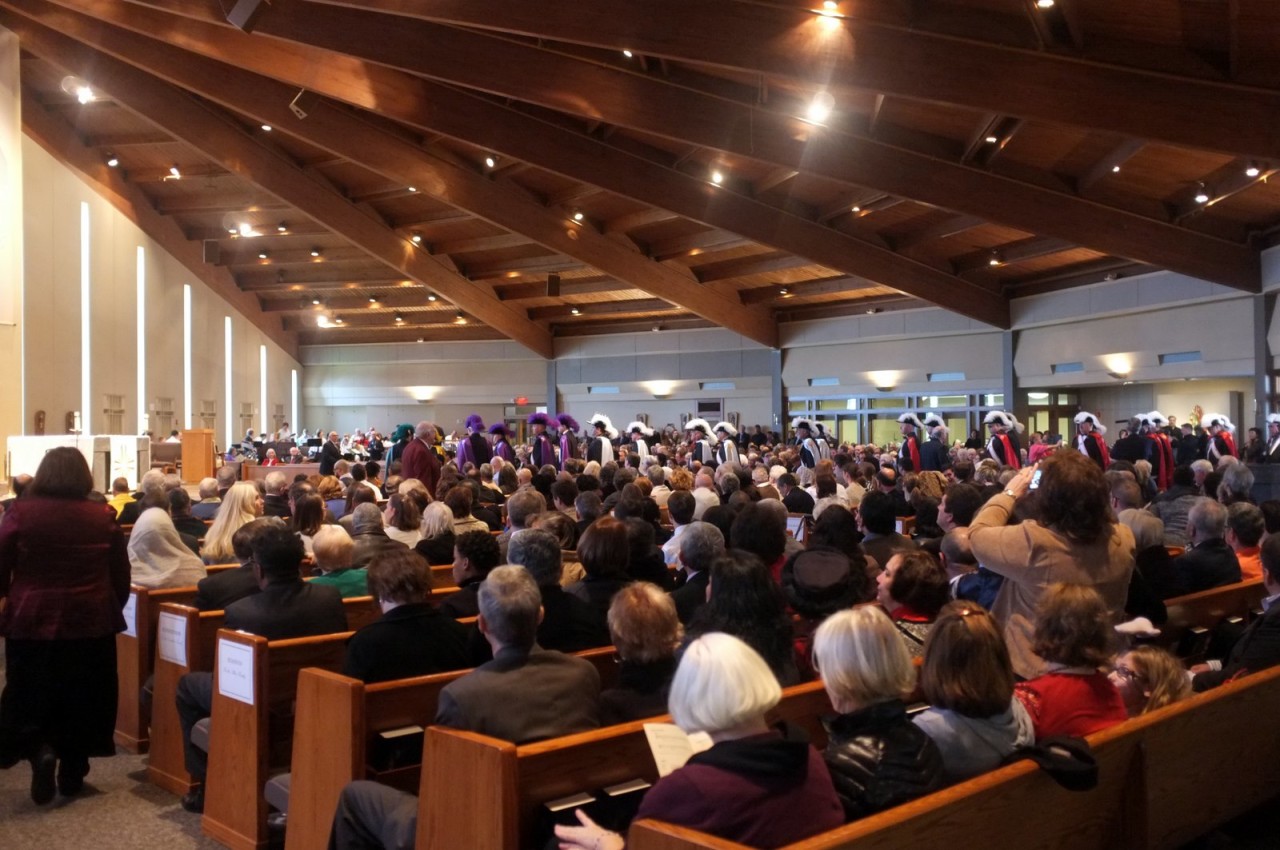
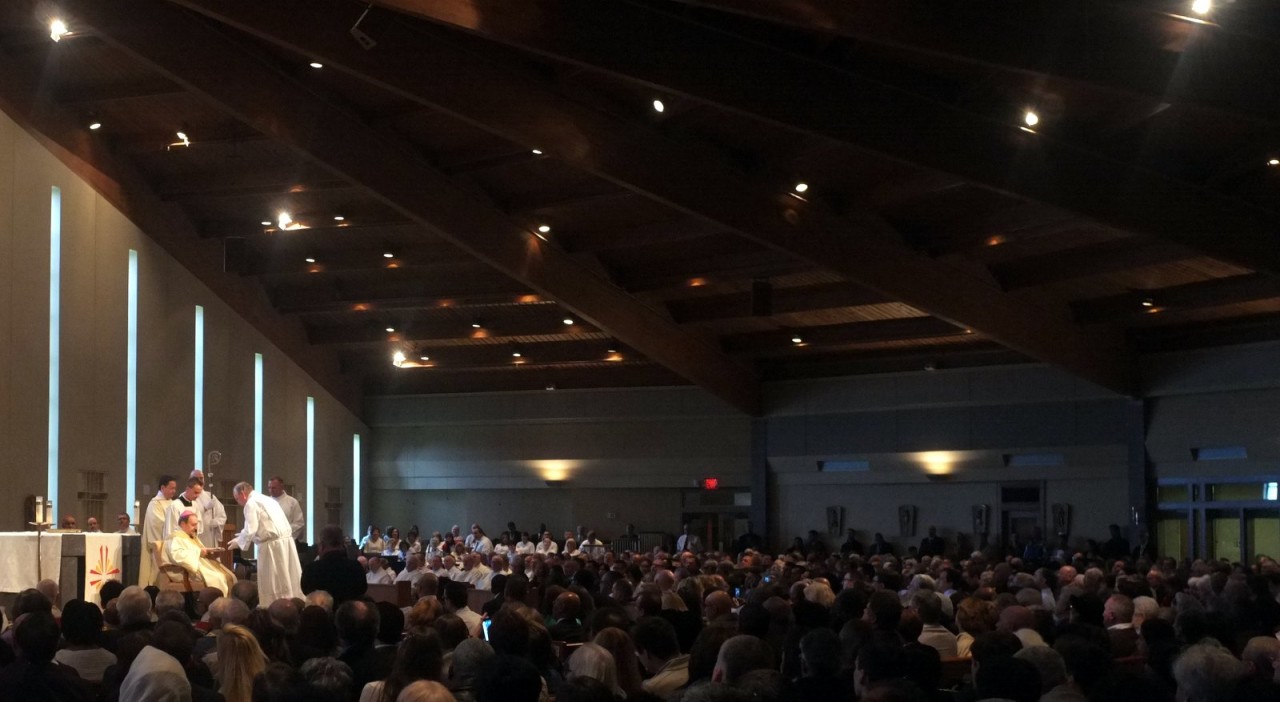

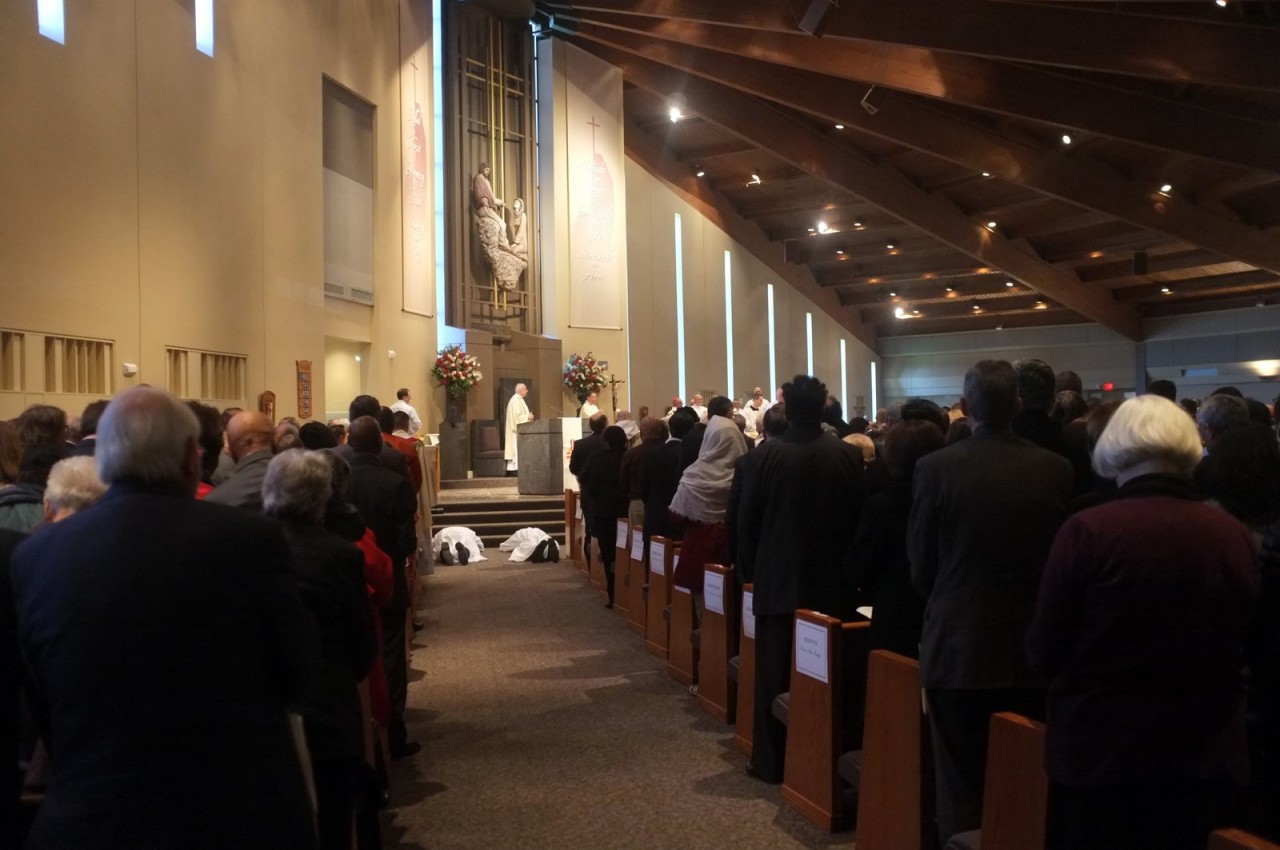
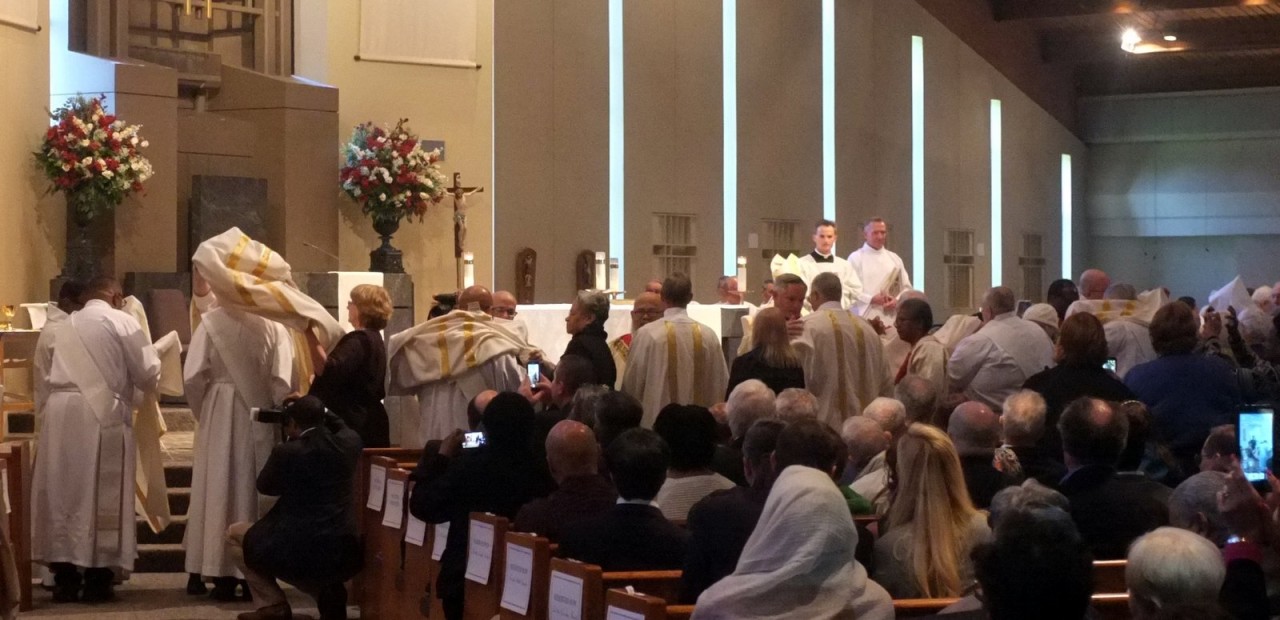
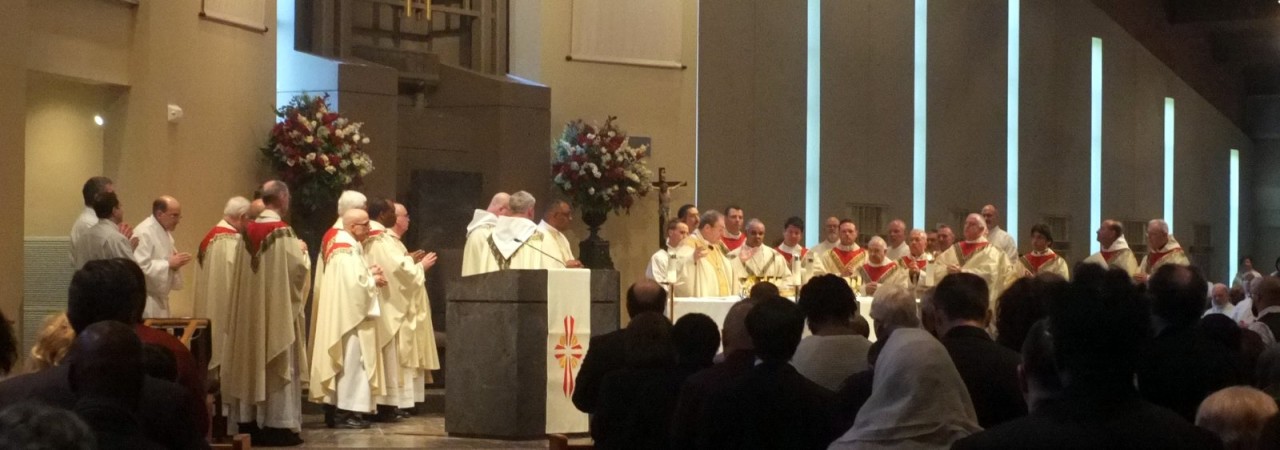
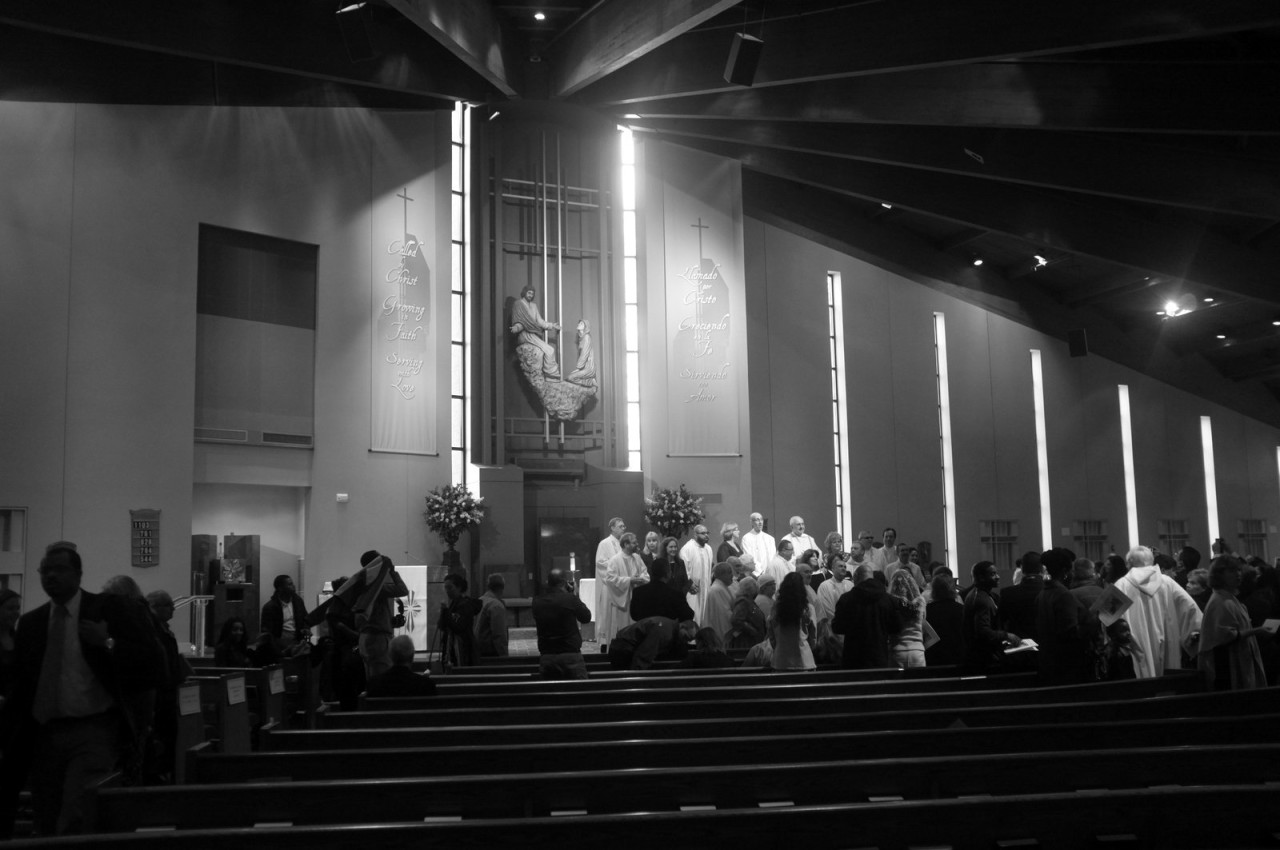
Today, he and seventeen other men — four men total from our parish — were ordained to the diaconate. K went to sing in the choir; I went to support my sponsor. Perhaps not as he’d supported me, for he is my elder chronologically and spiritually.
And the rest of the day?

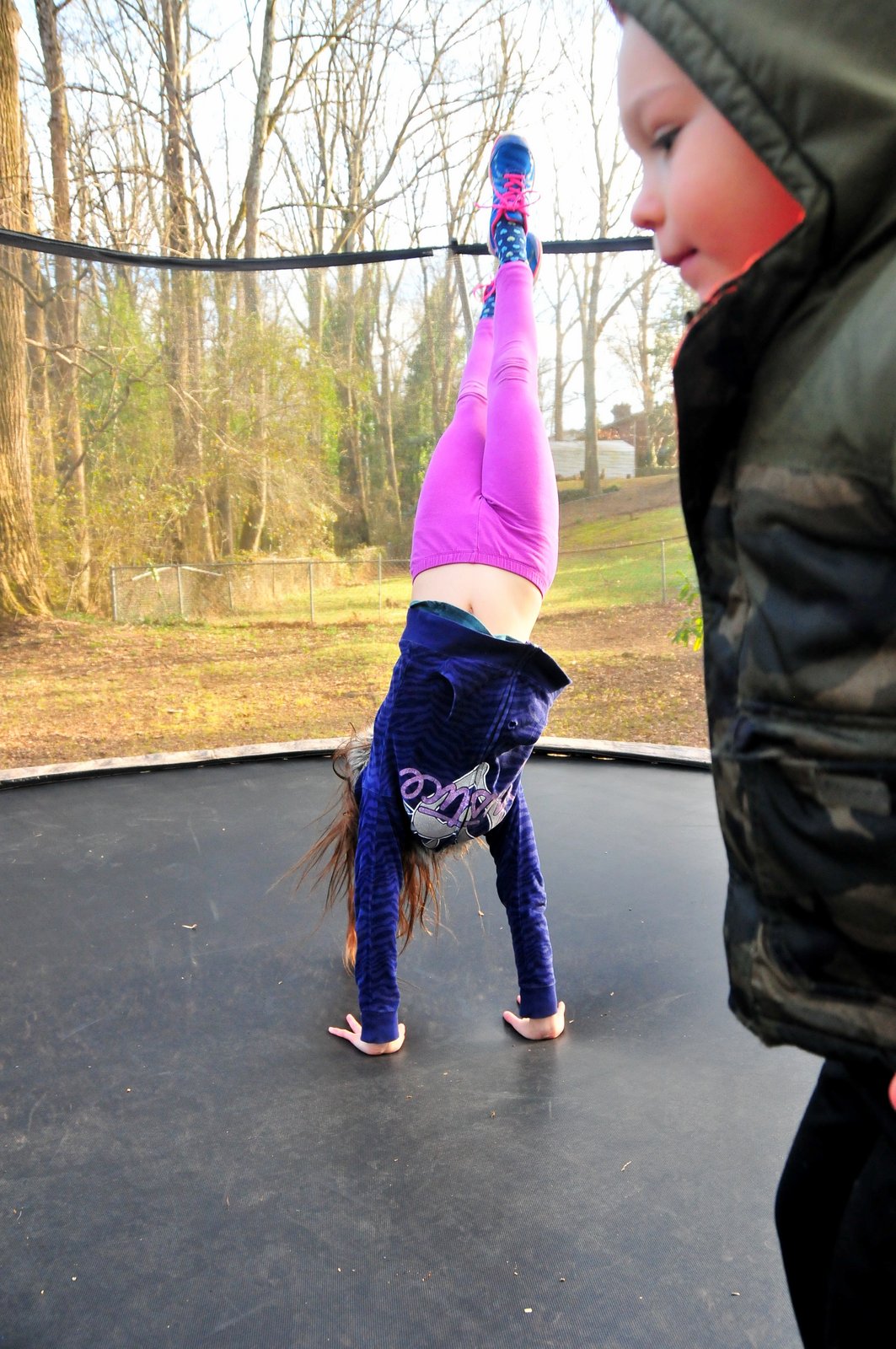


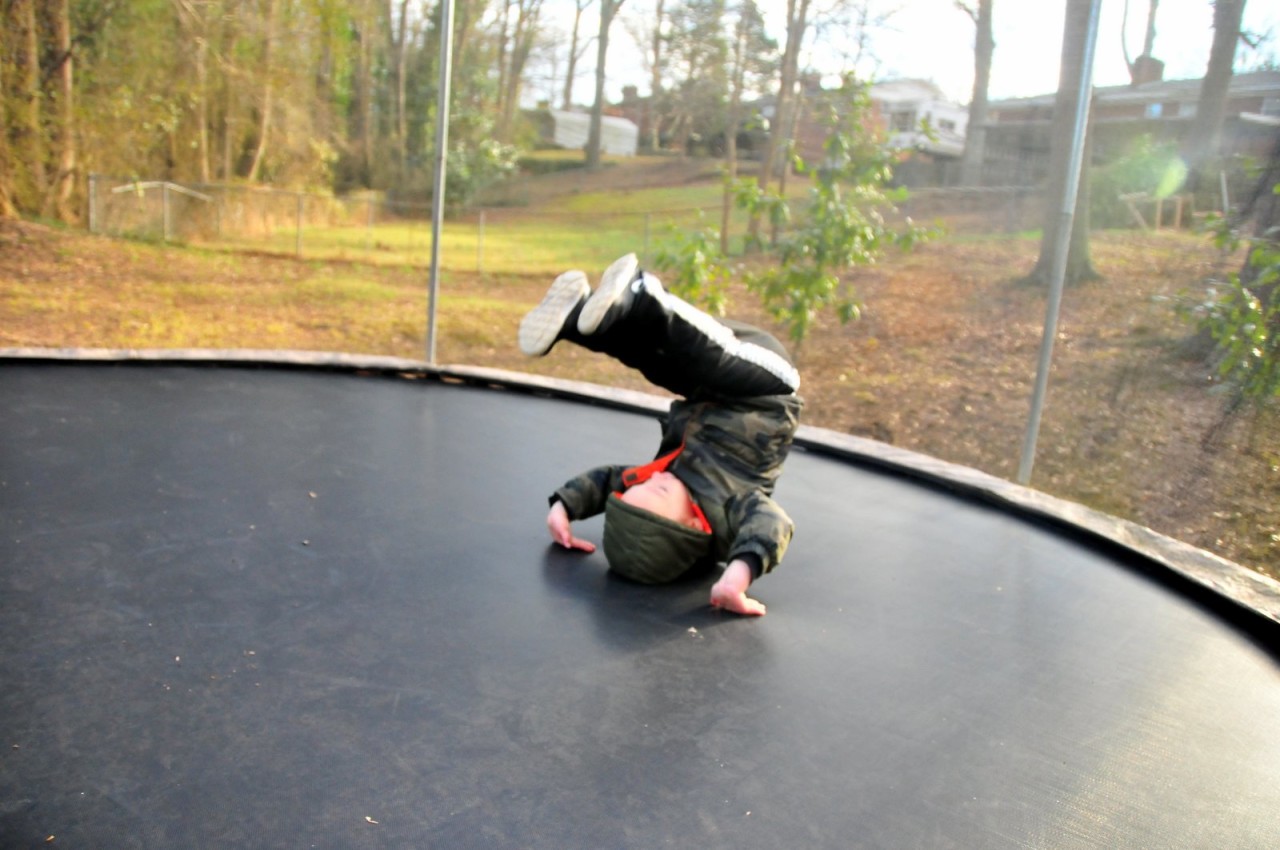

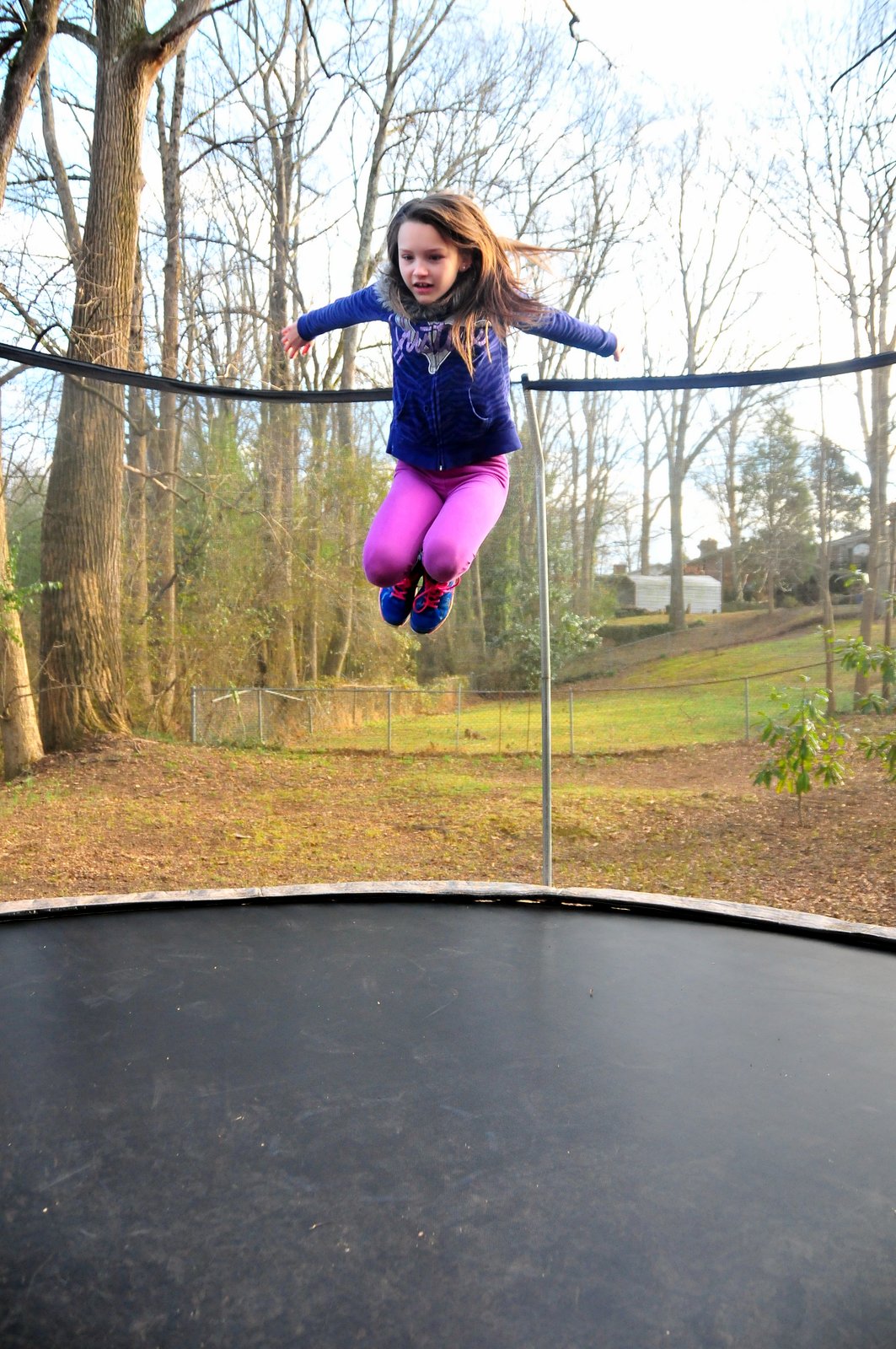

asdf
It’s usually not until the end of the day, when it’s too late, that I realize I haven’t been living my life that day as if I had chosen, out of all days, to relive that one day. It’s not until I’m with L, working through our examen (which we have re-initiated with our reunion after a summer break) that I see that I’ve been going through the day relatively blindly. I look back on the day at that point and realize I wasted time and energy wallowing about in this or that negative emotion, letting this or that frustration take control. I look back, I see these things, I promise to do better the next day, and I promptly forget.
During tonight’s, though, it occurred to me that I’d been constantly aware of how lovely the day was as it unfolded. I rode my bike to school and was pleasantly surprised at my average speed. I had a long productive meeting with the other teachers on our instructional team, planning a multi-disciplinary unit that might not only teach some academic skills but also affect change in the kids’ lives. Despite the afternoon rain, I made it back to the house relatively dry. I had a lovely dinner with my family, marveling at how the kids both devour beet-root soup, which seems unimaginable given the pickiness of L. We had a pleasant walk after dinner, with the kids scooting ahead and returning on their various vehicles.
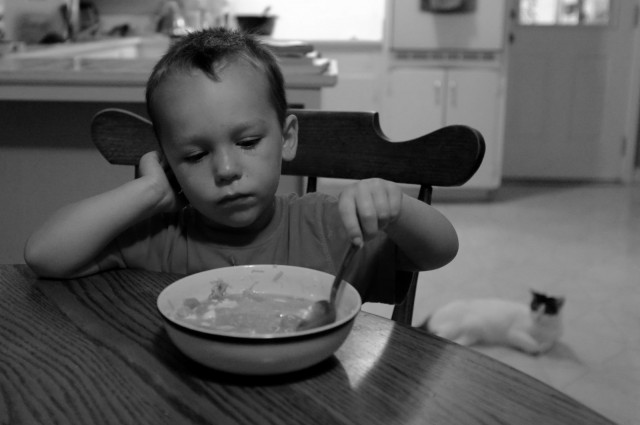
And then, during our examen, I looked down at our wiry, energetic (often frustratingly so), intelligent daughter, and I realized that simply being around all the wonderful people in my life should be enough to make me aware of the marvelously blessed life I have. I have incredible colleagues at work; I always work with a great group of students; I have children that make me beam; I married a woman that constantly astounds me; I have parents that give to our own family unconditionally. I am lacking nothing. We are lacking nothing. Nothing of any importance. Simply being aware of this is the trick to having a great day, day after day.